|
The material on this website is intended for educational use only and may not be reproduced for commercial purposes without express permission from the appropriate copyright holder.
Le contenu de ce site Web est destiné à des fins pédagogiques seulement et ne peut être reproduit à des fins commerciales à moins d'en avoir obtenu la permission du titulaire du droit d'auteur approprié.
"Canada was the first colony of any empire to extract full democracy from the central power without having to go to war."
John Ralston Saul, A Fair Country
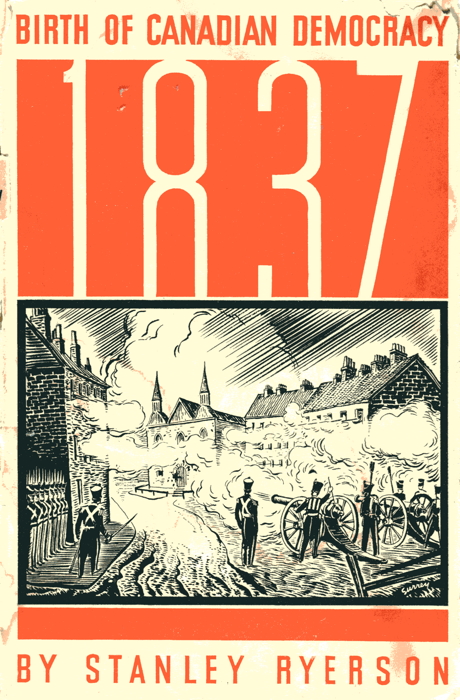
Stanley Ryerson, 1837 The Birth of Canadian Democracy, Toronto, 1937, Drawing of St. Eustache, December 14, 1837 by P. Surrey from an old print.
"In 1837 Canadians waged their first great battle for liberty. Although defeated in a military sense, the Reformers and Patriots won for their country the right to democratic liberty and nationhood."
Stanley Ryerson
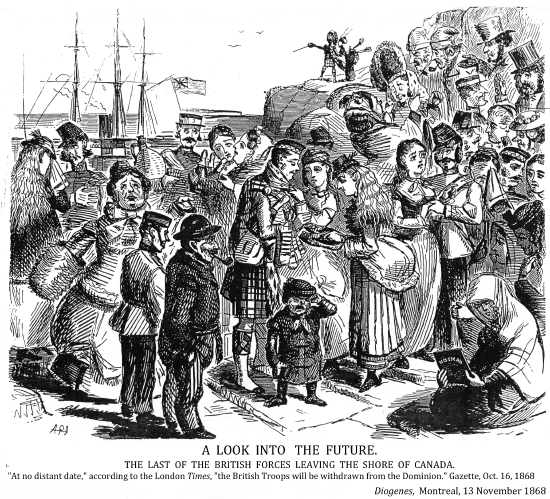
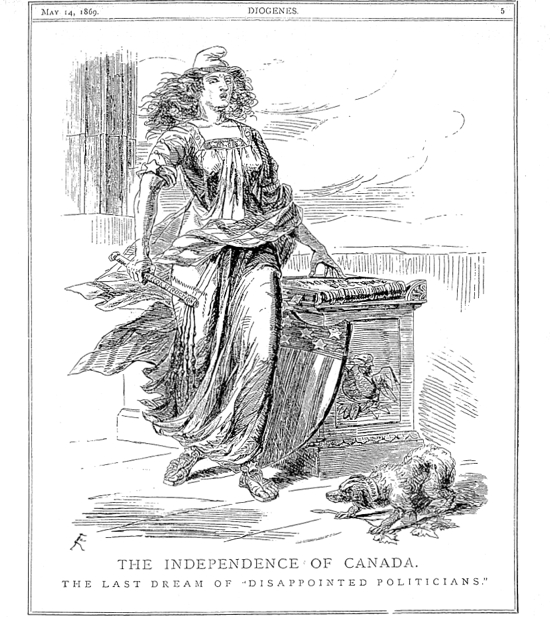
Monroe Doctrine, Diogenes, Montreal, 14 May 1869
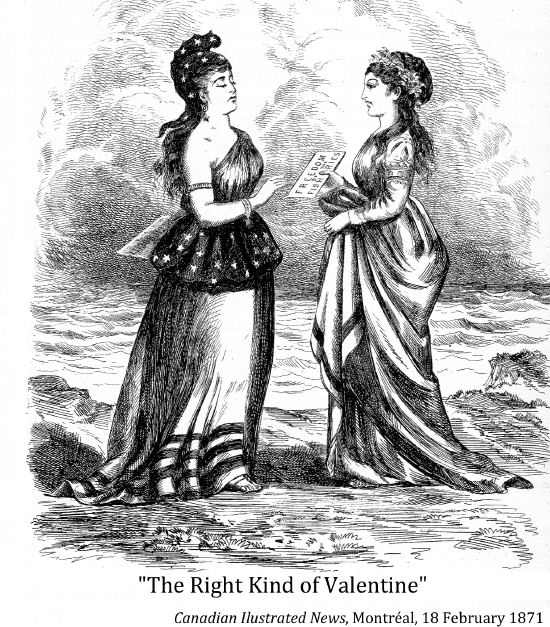
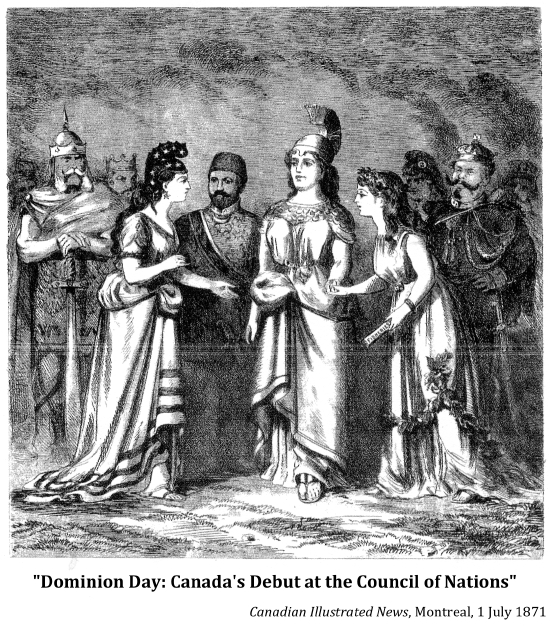
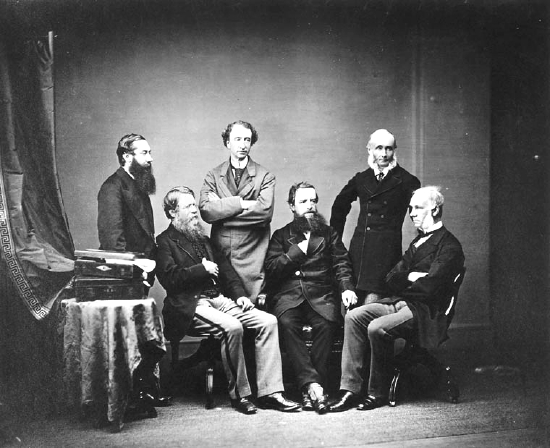
1871 The British High Commissioners for the Treaty of Washington. Les hauts-commissaires britanniques. LAC, C-002422, Matthew B. Brady 1871
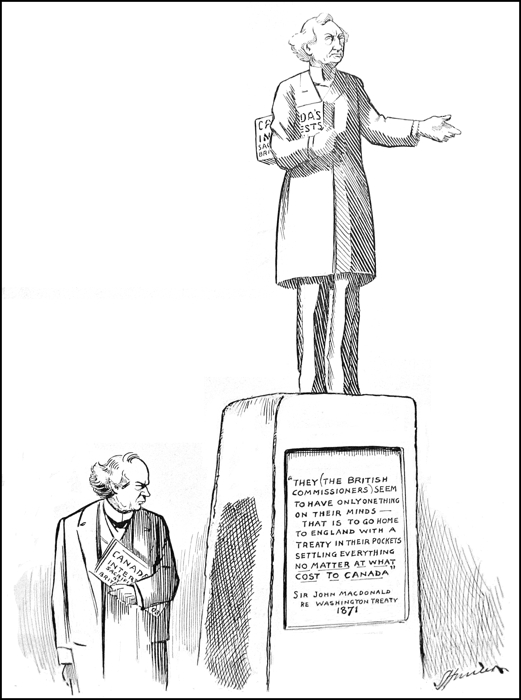
Samuel Hunter, Washington Treaty, 1871, MTPL
"I am greatly disappointed at the course taken by the British Commission-ers. They seem to have only one thing in their minds – that is to go to England with a Treaty in their pockets – no matter what cost to Canada."
Sir John A. Macdonald, 1 April 1877, Washington Treaty negotiations
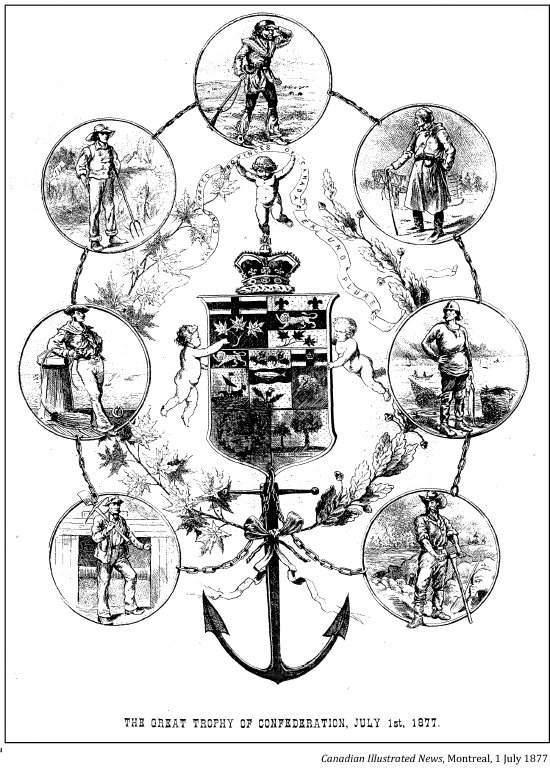
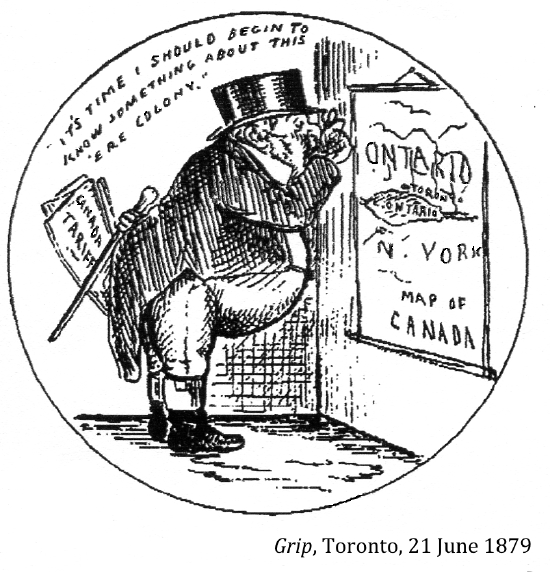

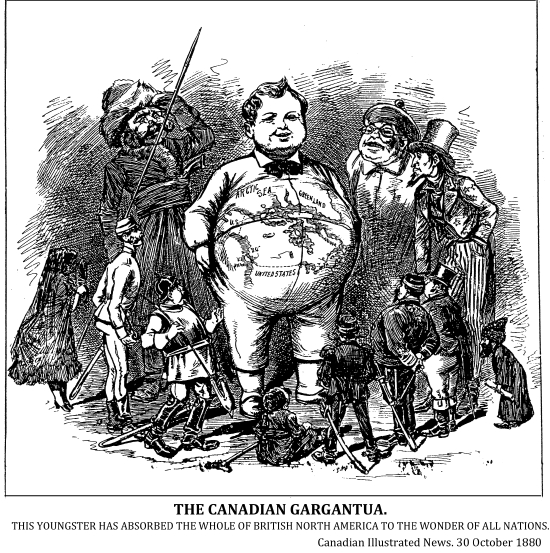
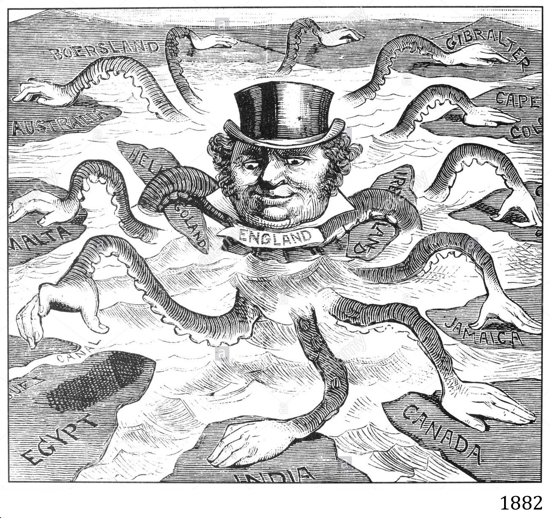
"I am one of those who believe that this country should have the right to negotiate its commercial treaties. I go a step further, I believe this country should have the right to negotiate every treaty . . . I see no reason why the people of Canada should not look forward to Canada becoming a sovereign and independent State. The right hon. Gentleman stated he was born a British subject and hoped to die one. Sir, I was born a British colonist, but do not wish to die a tadpole British colonist. I do not wish to die without having all the rights, privileges and immunities of the citizen of a nation."
Amor de Cosmos, 2 April 1882
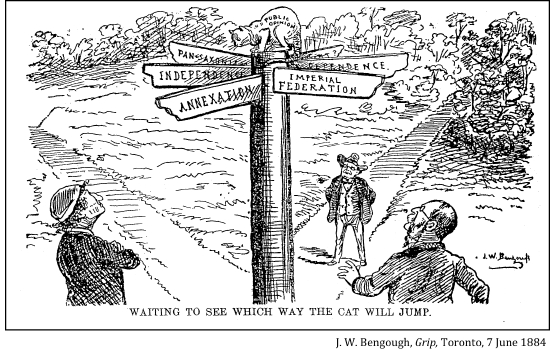
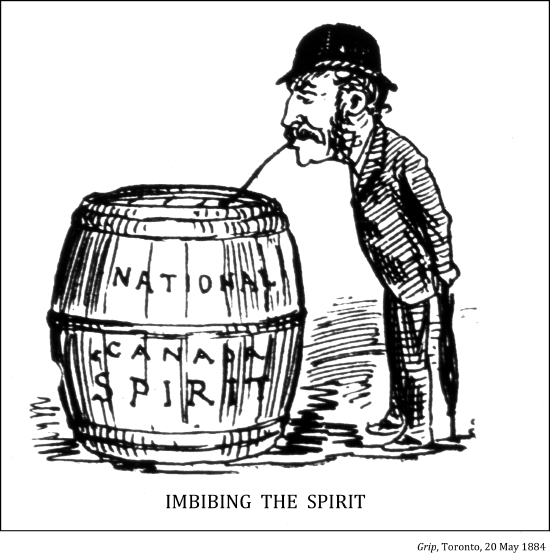
"As to independence how long could we stand as an independent republic? . . . What could Canada do in the Bering sea controversy without England at our back?"
Sir John A. Macdonald, 2 October 1890
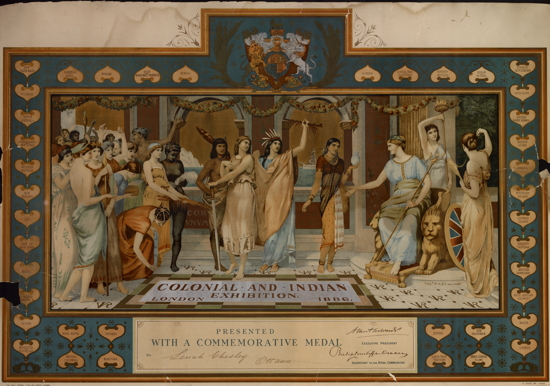
Ontario Archives I0030238
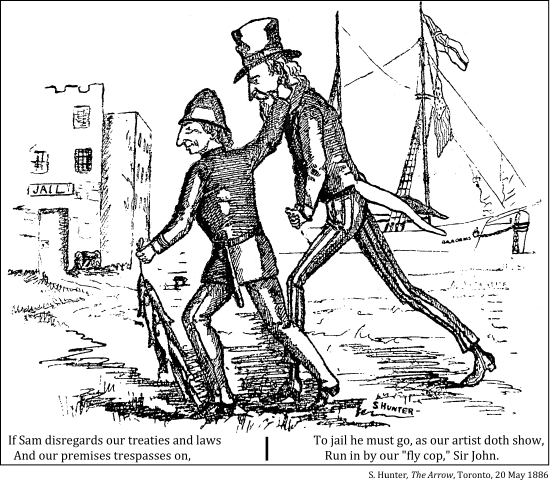
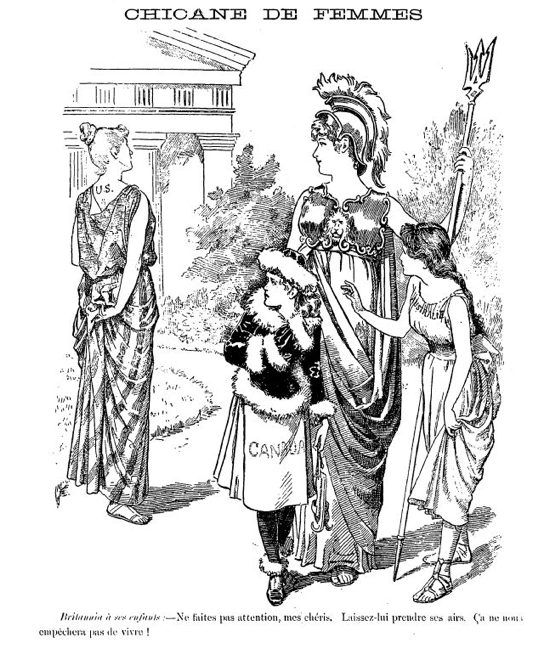
FEMININE DISPUTE
Britannia to her children: Pay no attention, my darlings. Let her put on airs. It will not prevent us from living!
Le samedi, Montréal, 29 November 1890
"As for myself, my course is clear, a British subject I was born – a British subject I will die. With my utmost effort, with my latest breath, will I oppose the 'veiled treason' which attempts by sordid means and mercenary proffers to lure our people from their allegiance."
John A. Macdonald, 7 February 1891
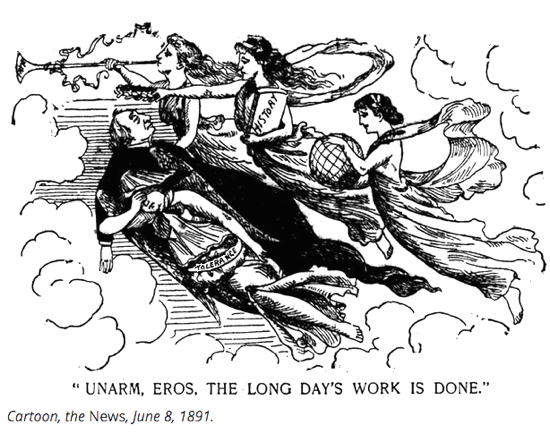
"We French-Canadians belong to one country, Canada. Canada is for us the whole world; but English-Canadians have two countries, one here and one across the sea."
Wilfrid Laurier
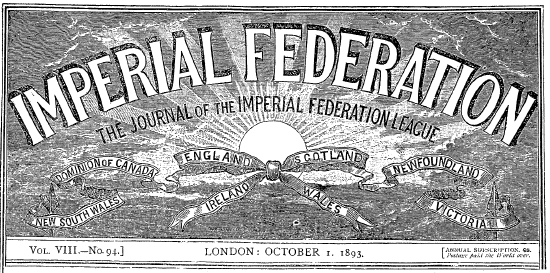
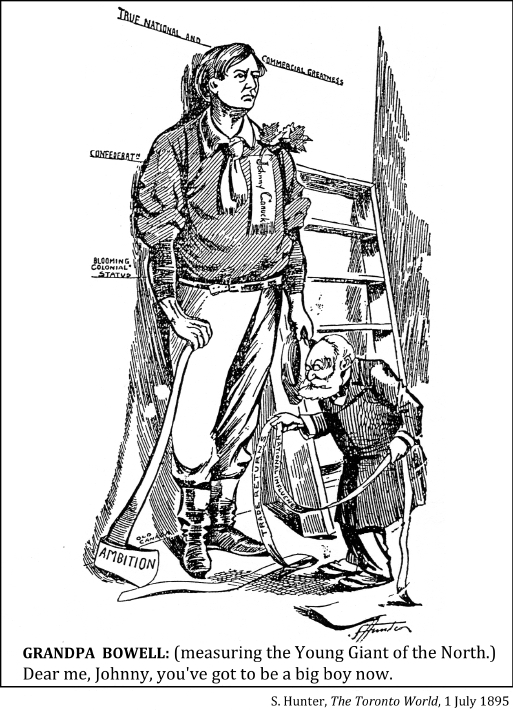
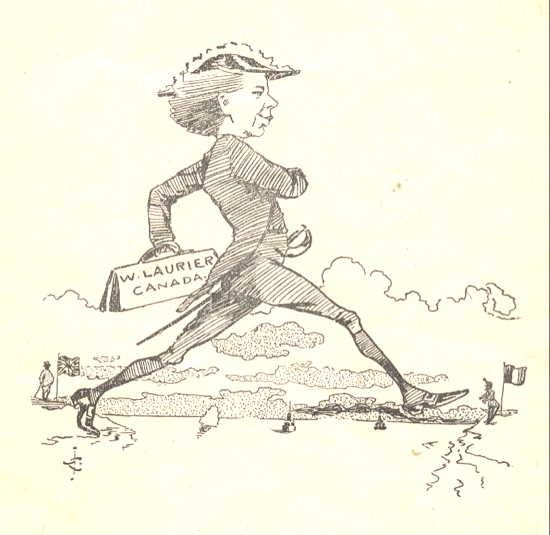
Sir Wilfrid Laurier se dirige de l'Anglerre vers la France, J. C. Innes, 1897, National Archives de Québec
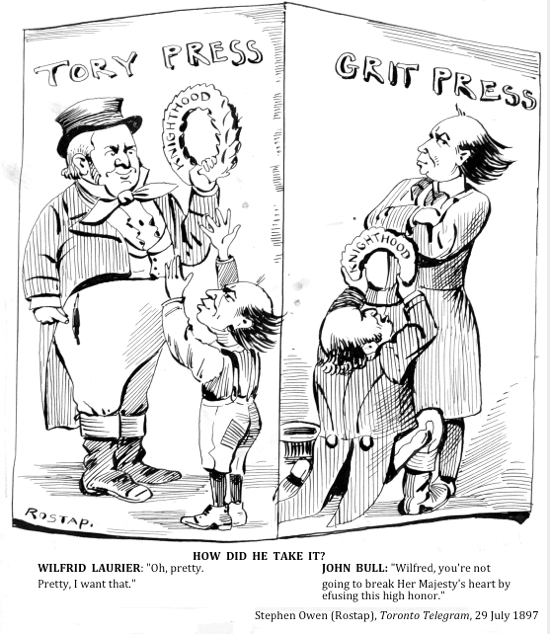
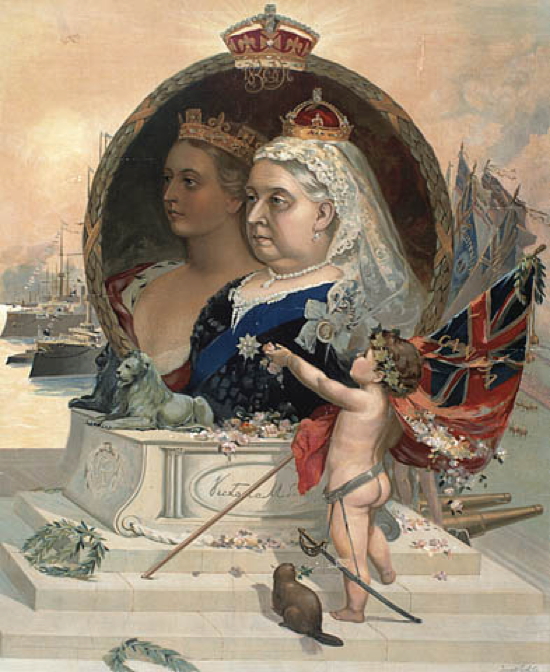
LAC c039484k
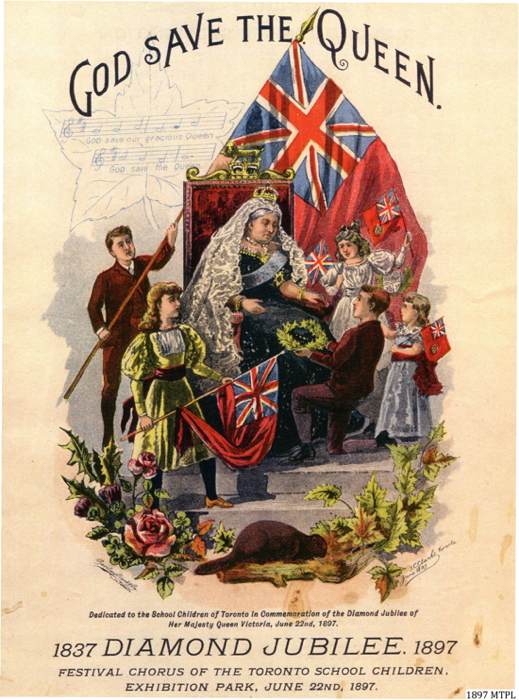
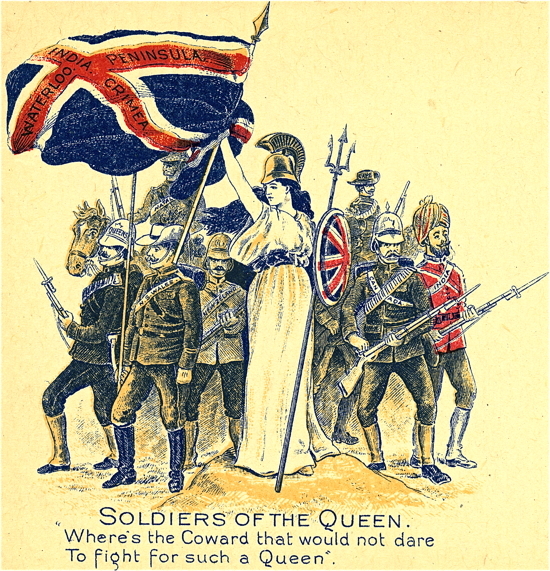
Canadian War Museum, Ottawa
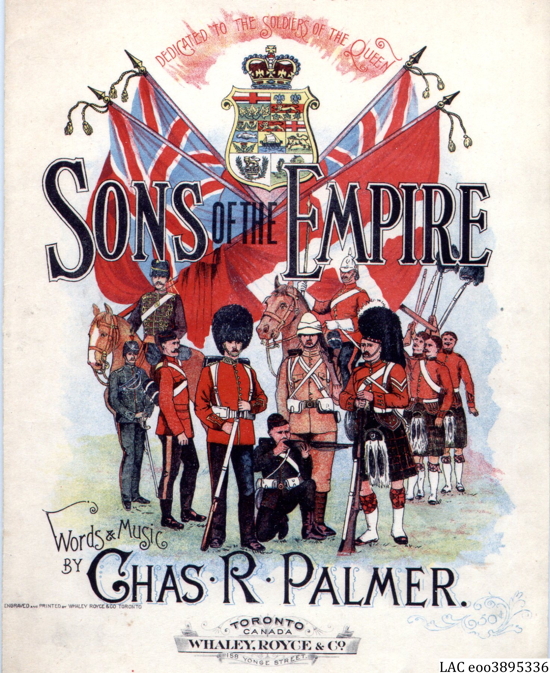
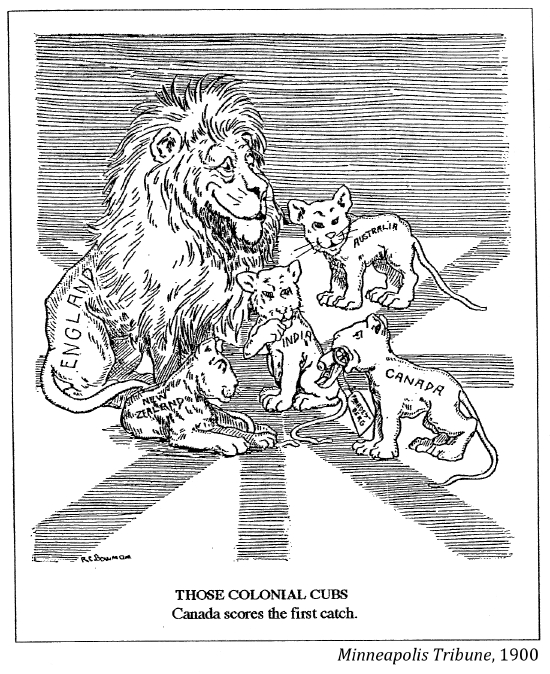
We Are Proud to be Canadians God Bless the British Empire: Metropolitan Toronto Public Library, Baldwin Room
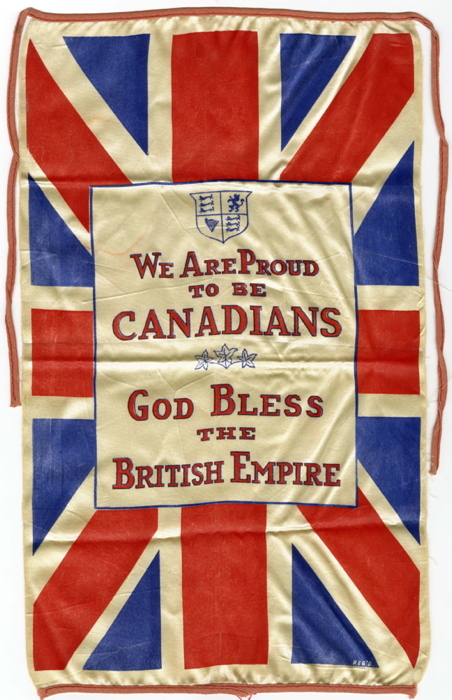
MTPL
"One Flag, One Throne, One Empire."
Margaret Polson Murray, 1900.
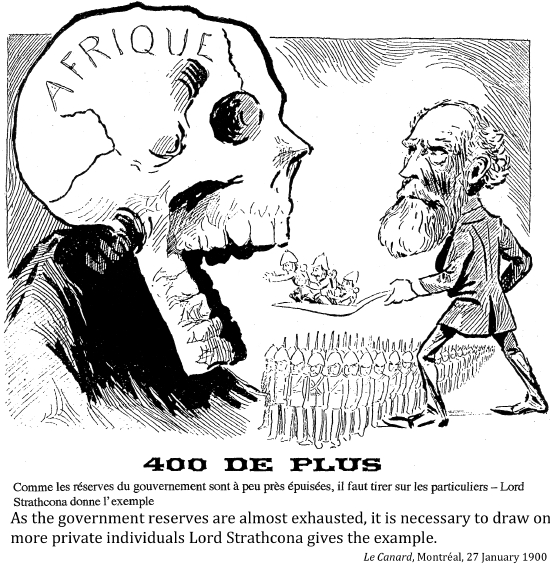
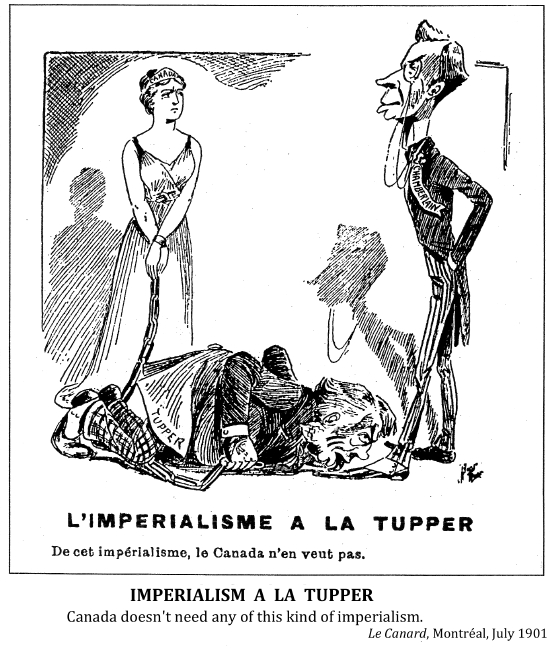
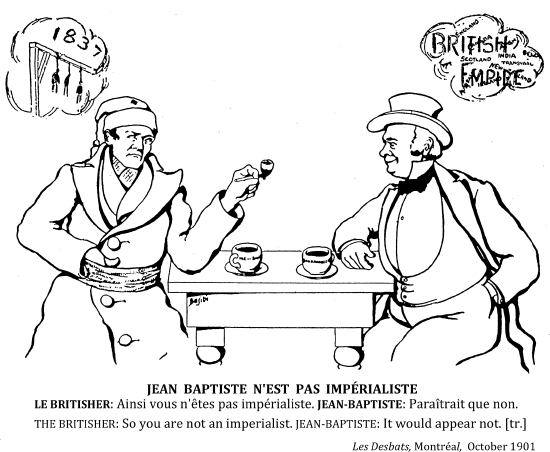
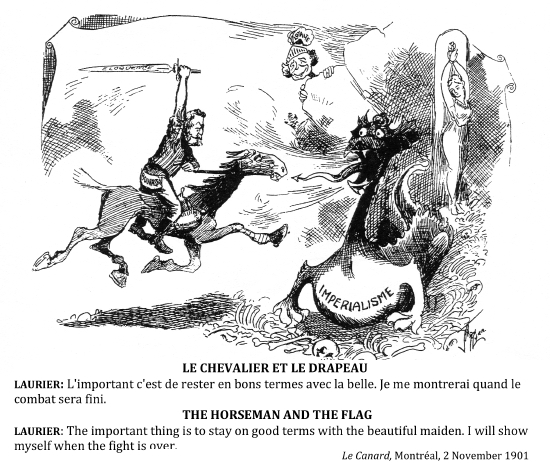
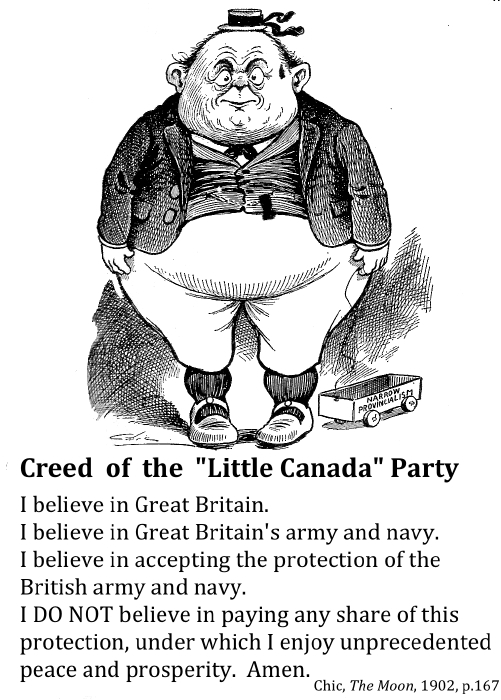
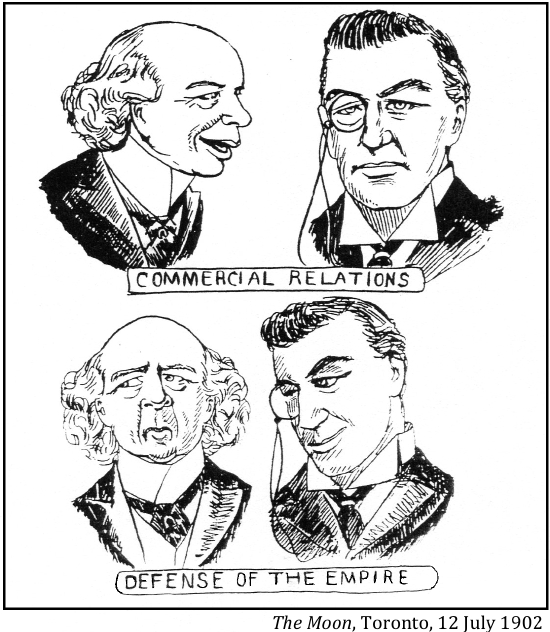
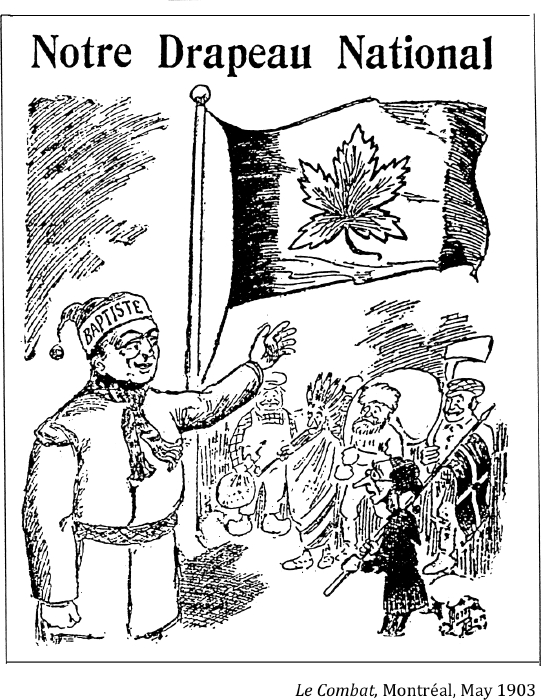
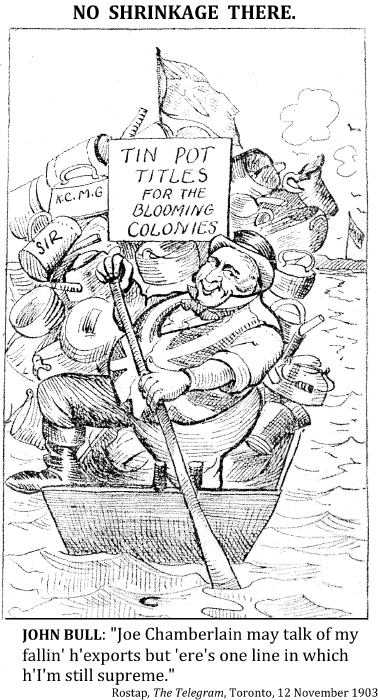
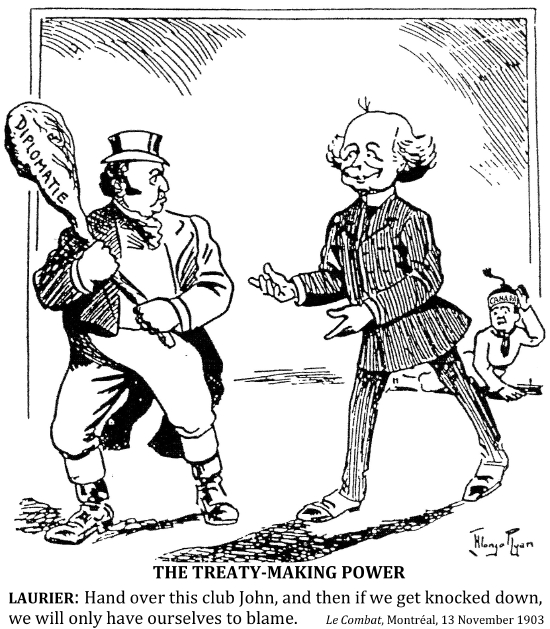
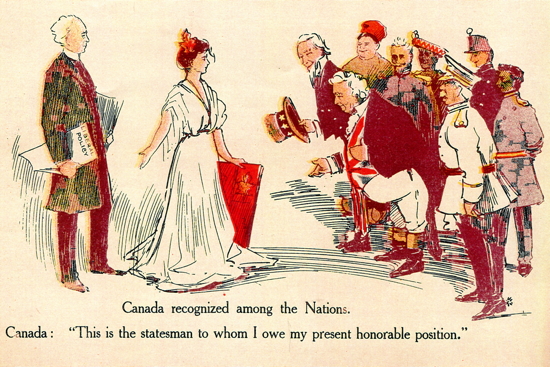
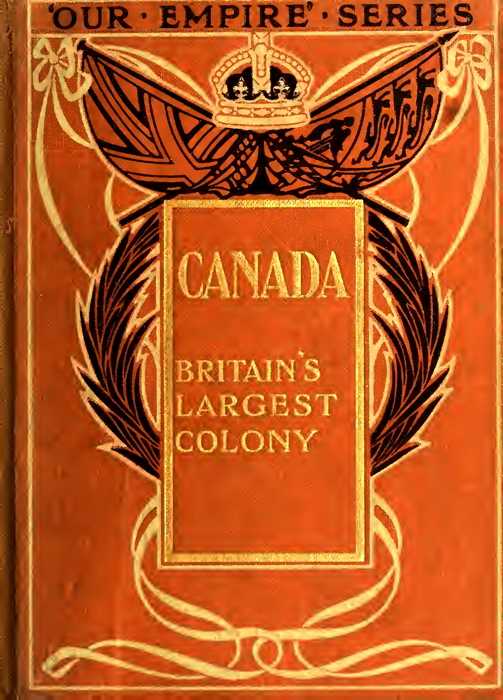
Canada, Britain's largest colony; with a chapter on Newfoundland and Labrador, Arthur Lincoln Haydon, London, 1904
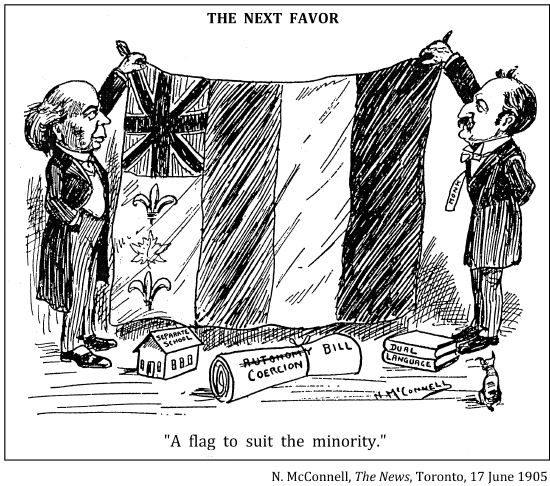
"I stand in the first place for the British Empire against the world, and within the British Empire I stand first for Canada."
Robert Borden, declaration, 1905-1912
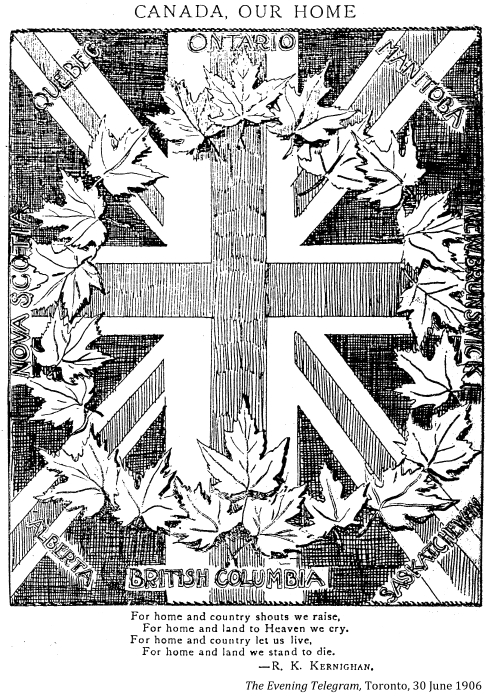
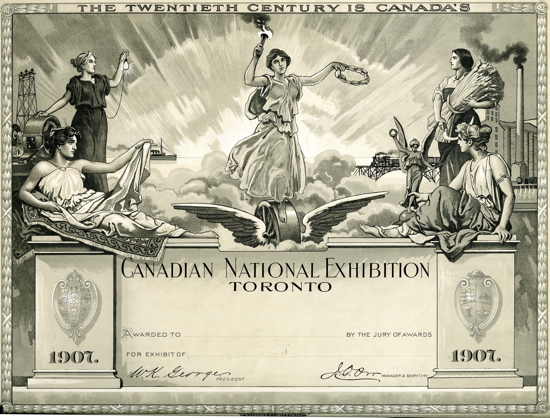
Metropolitan Toronto Public Library

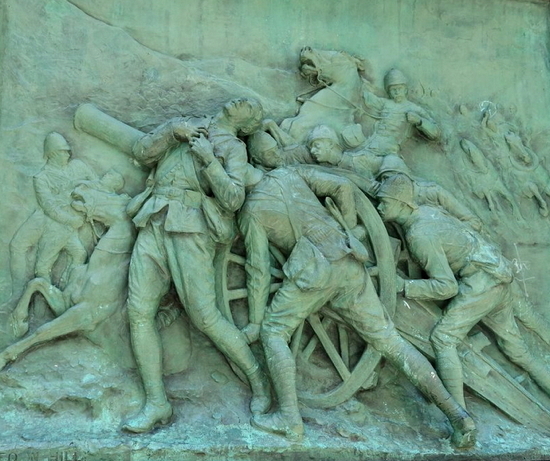
Boer War Memorial, Montreal, George W. Hill, 1907
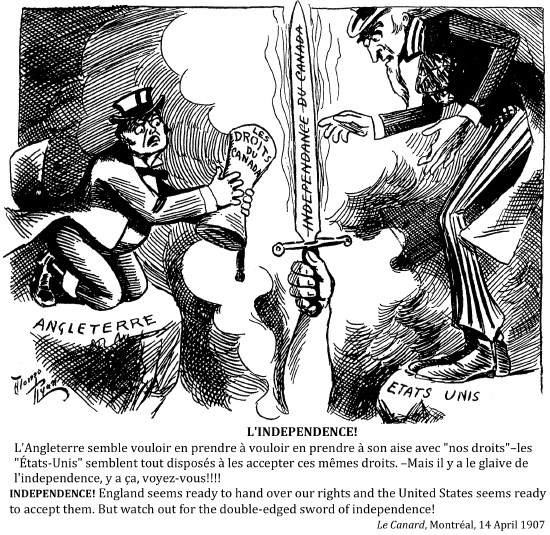
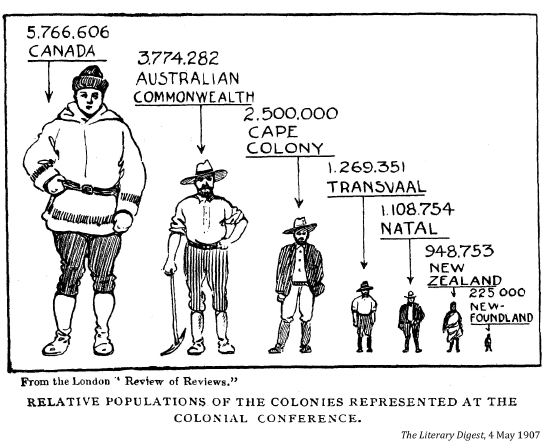
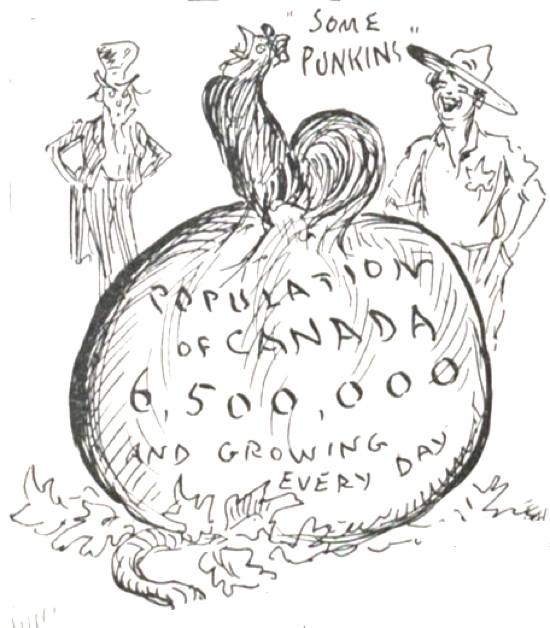
J. W. Bengough Grip, 20 July 1907
"I want you boys to remember what Empire Day means. Empire Day is the festival on which every British subject should reverently remember that the British Empire stands out before the whole world as the fearless champion of freedom, fair play and equal rights; that its watchwords are responsibility, duty, sympathy and self-sacrifice, and that a special responsibility rests with you individually to be true to the traditions and to the mission of your race."
Earl Grey, Governor General, May 1909
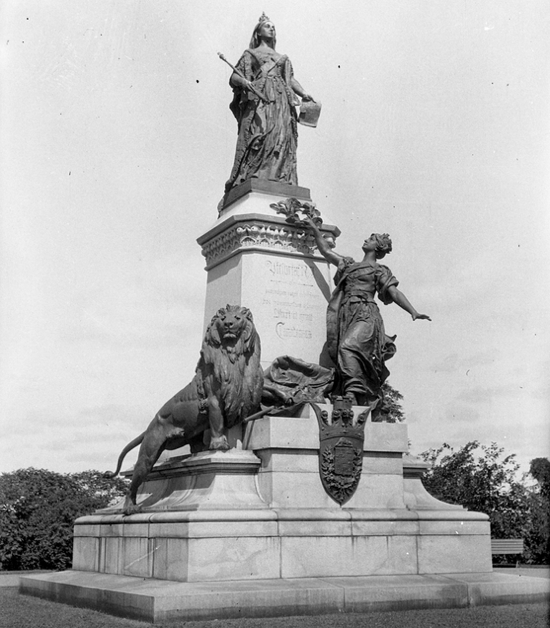
Queen Victoria Statue, Parliament Hill, Ottawa, 1910, City of Vancouver Archives, AM640-S1-F5--CVA 260-2243
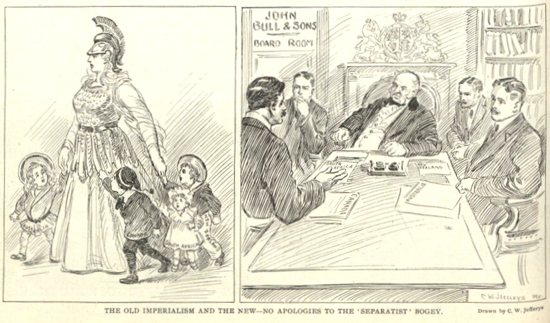
The Canadian Courier, Toronto, 2 April 1910
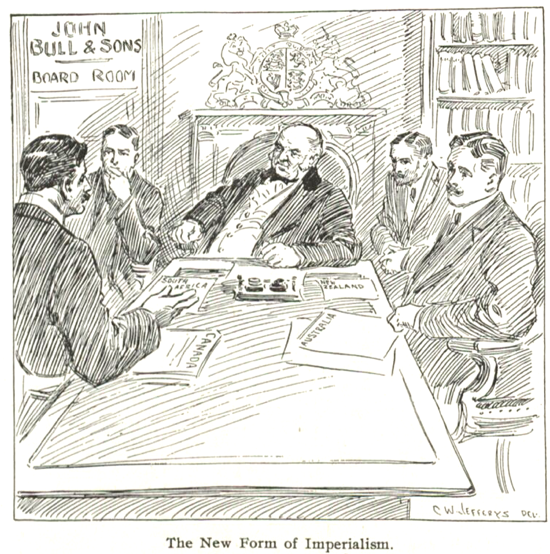
The Canadian Courier, Toronto, Charles Jefferys, 24 September 1910
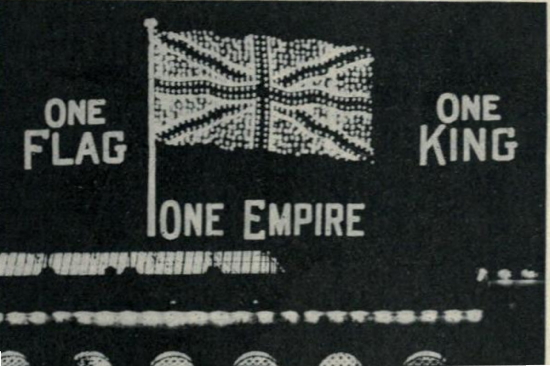
This electric flag, designed by Death & Watson, attracted much attention at the Fair.
The Busy Man's Magazine, Toronto, October 1910
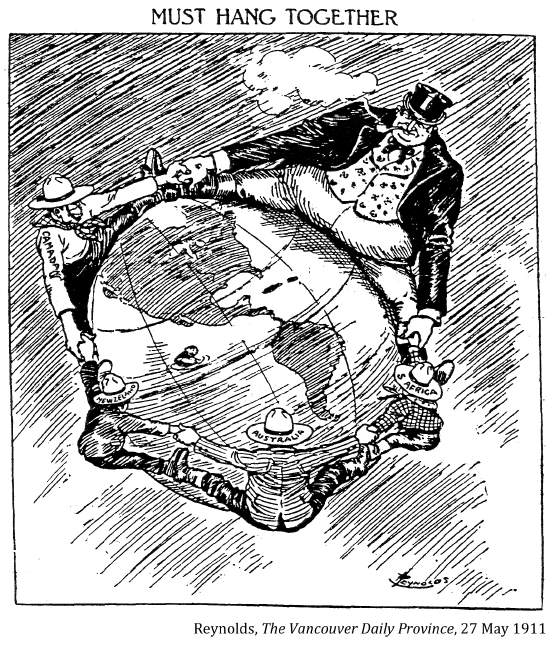
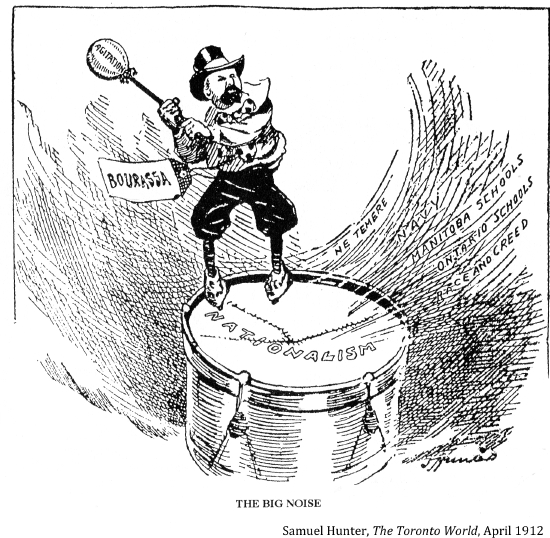
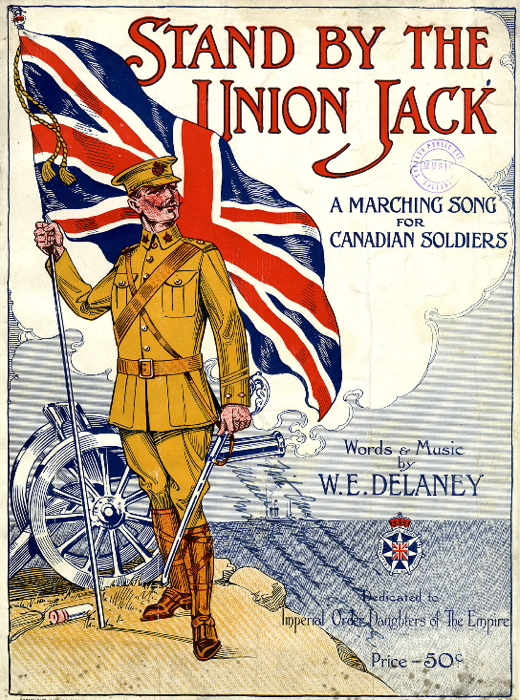
Toronto Public Library, William E. Delaney, MUSIC. CSM. Delaney.Stand,1914
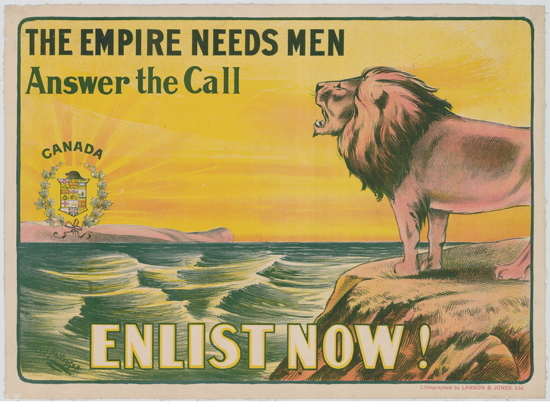
1914-18 LAC Acc. No. 1983-28-829
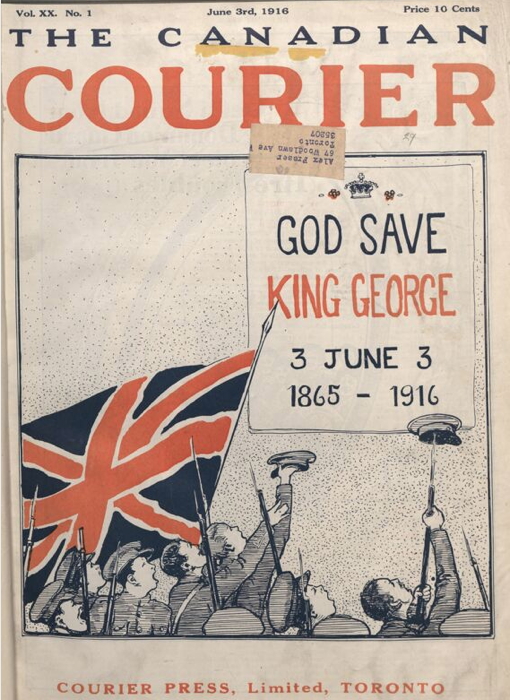
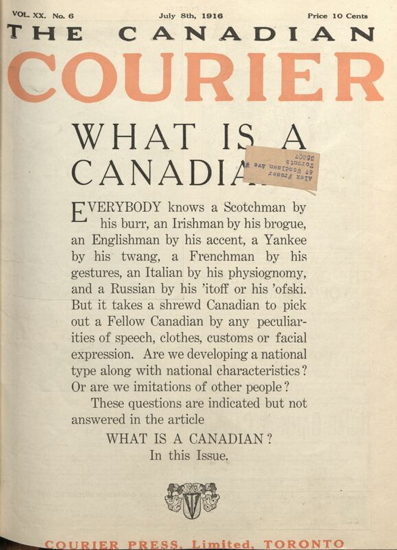
The Canadian Courier, Toronto, 8 July 1916
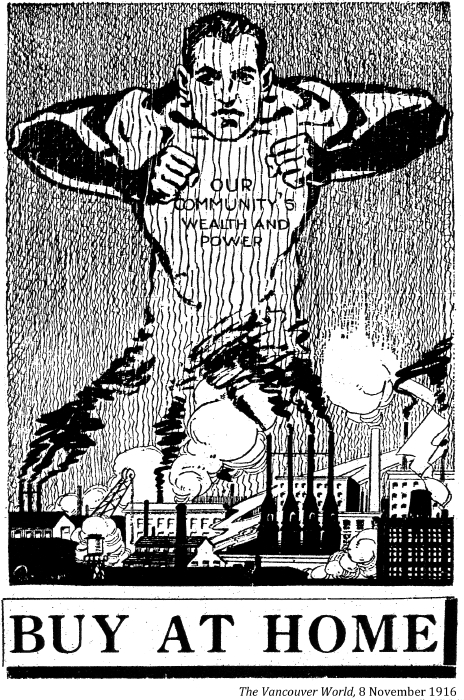
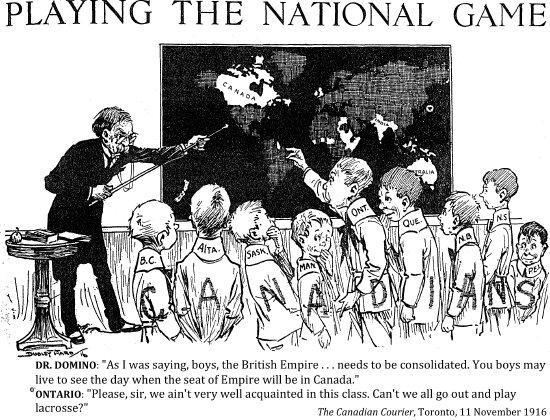
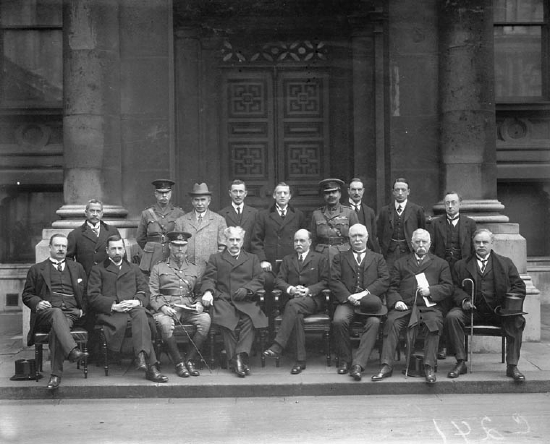
Imperial War Cabinet, 1917, LAC C-000241
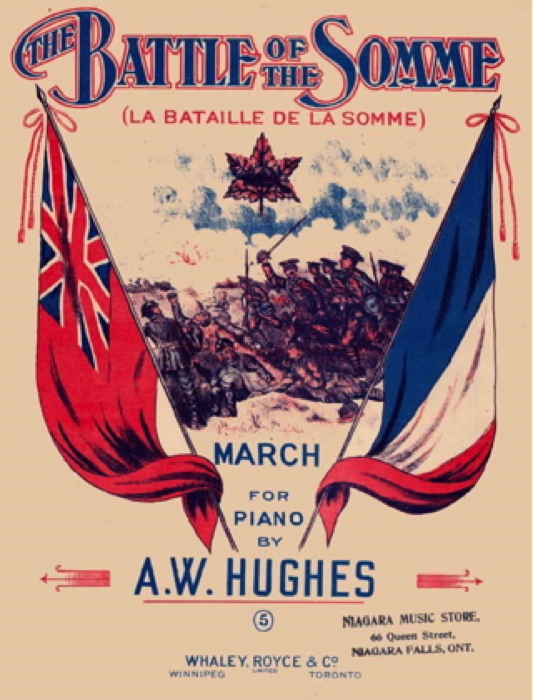
Toronto Faculty of Music Library, Arthur Wellesley Hughes, 1917
"Before April 1917 we were content to be Colonials with one thought in common –– that of going "home" to fight for the mother country. But Vimy Ridge was the first battle in which Canadian divisions fought as a whole, and it was purely a Canadian effort, planned and fought our own way.
The resounding victory, the first in Britain's two and a half years of war, gave every man a feeling of pride, the more so because the long battle line to our right had failed. A national spirit was born, and now to be British was not enough; we were Canadian and would do a good job of paddling our own canoe . . .
I never felt like a Canadian until Vimy. After that I was Canadian all the way."
Major-General F. F. Worthington
"It was Canada from the Atlantic to the Pacific on parade. I thought then, and I think today, that in those few minutes (Battle of Vimy Ridge) I witnessed the birth of a nation."
Brigadier-General Alexander Ross
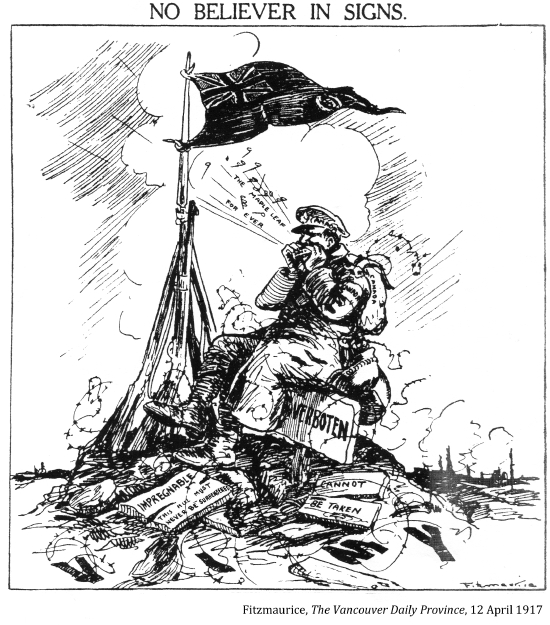


"Canada entered the war a colony, she emerged from it close to an independent state."
A. R. M. Lower, Colony to Nation
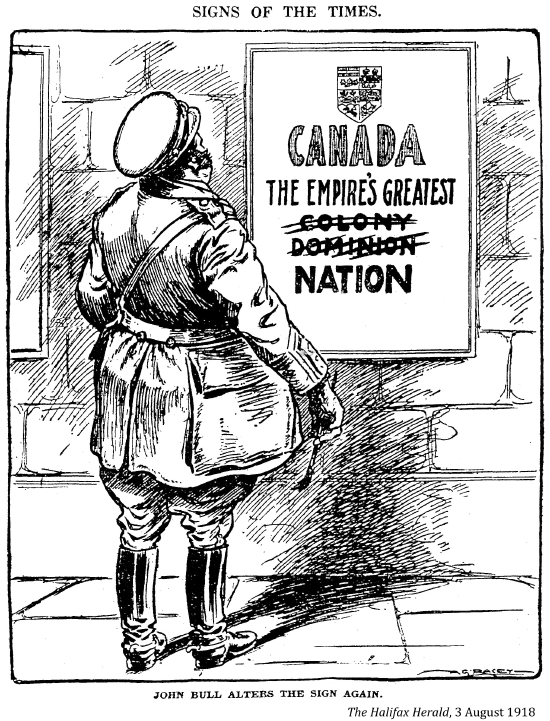
“Canada had led the democracies of both the American continents. Her resolve had given inspiration, her sacrifices had been conspicuous, her effort was unabated to the end. The same indominable spirit which made her capable of that effort and sacrifice made her equally incapable of accepting the Peace Conference, in the League of Nations, or elsewhere, a status inferior to that accorded to nations less advanced in their development, less amply endowed in wealth, resources, and population, no more complete in their sovereignty and far less conspicuous in their sacrifice.”
Prime Minister Robert Borden, 1919
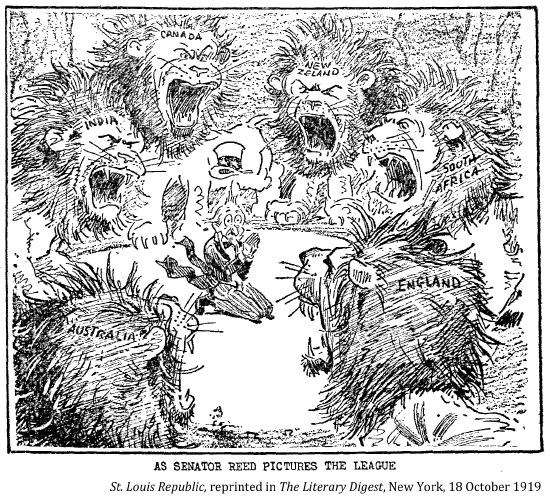
"We, Your Majesty's most dutiful and loyal subjects, the House of Commons of Canada in Parliament assembled, humbly approach Your Majesty, praying that Your Majesty hereafter may be graciously pleased – to refrain hereafter from conferring any title of honour or titular distinction upon any of your subjects domiciled or ordinarily resident in Canada, save such application as are of a professional or vocational character or which appertain to an office."
W. F. Nickle, 1919
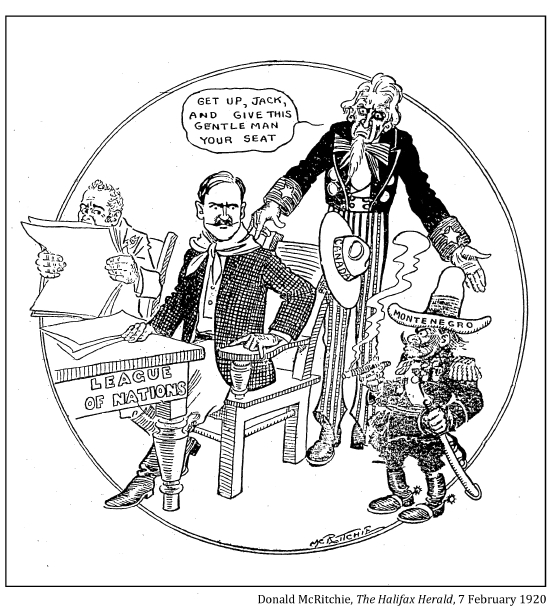
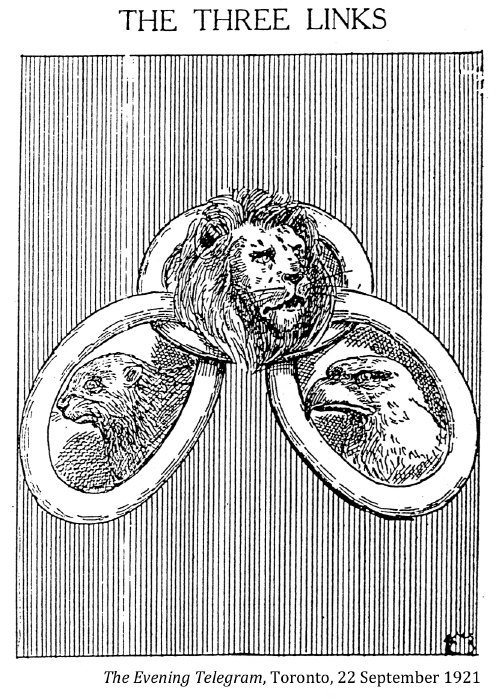
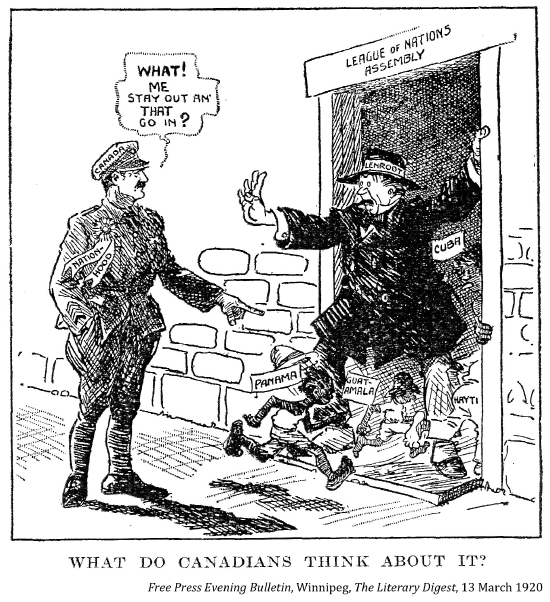
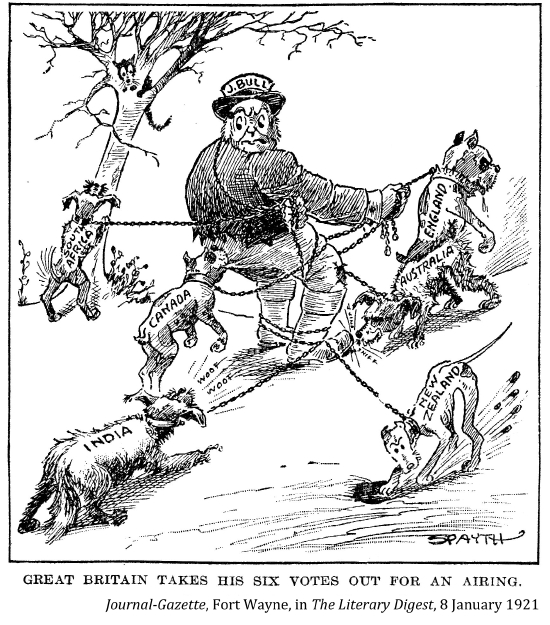
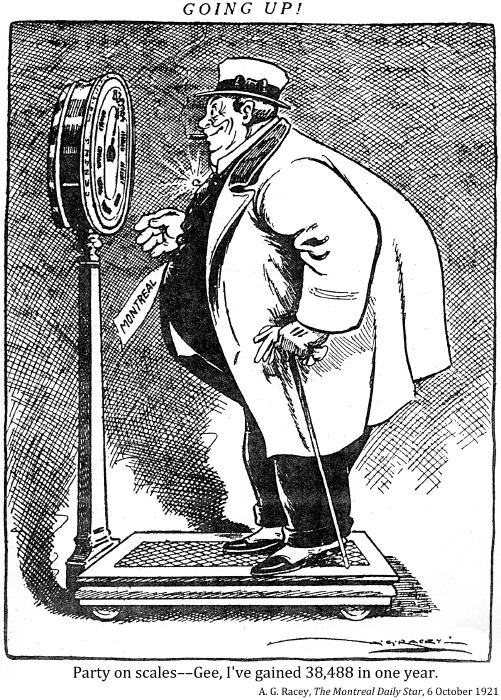
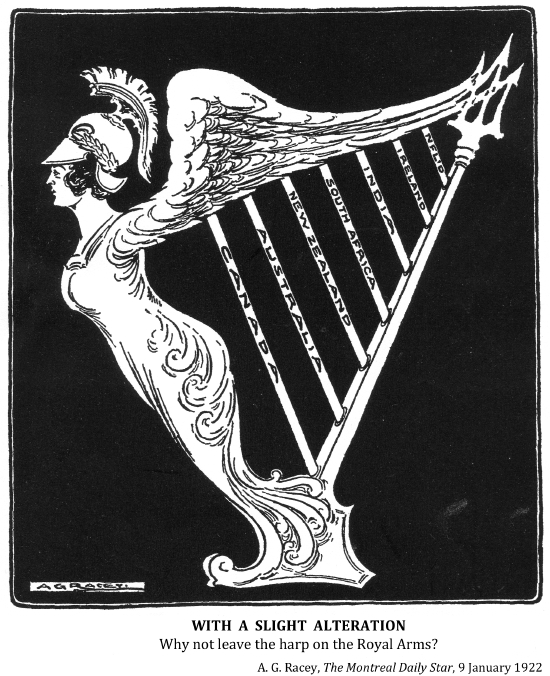
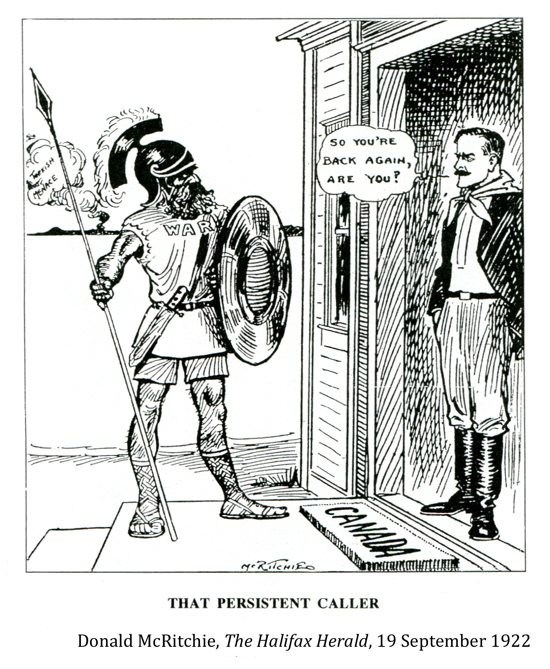
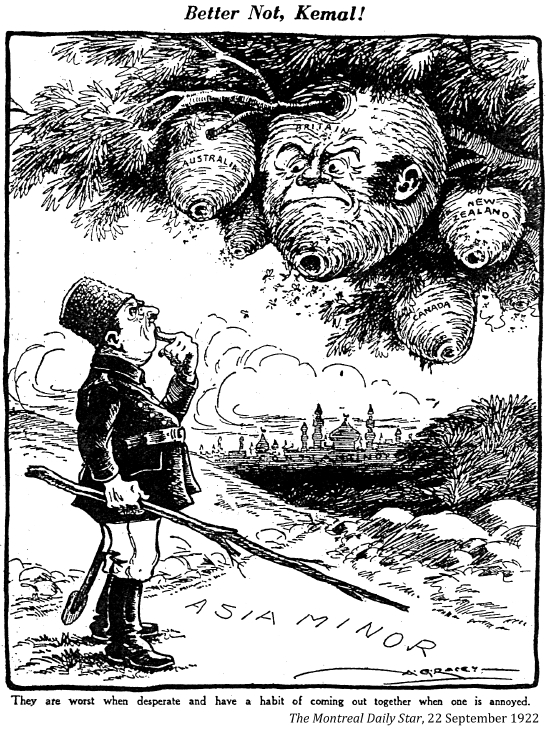
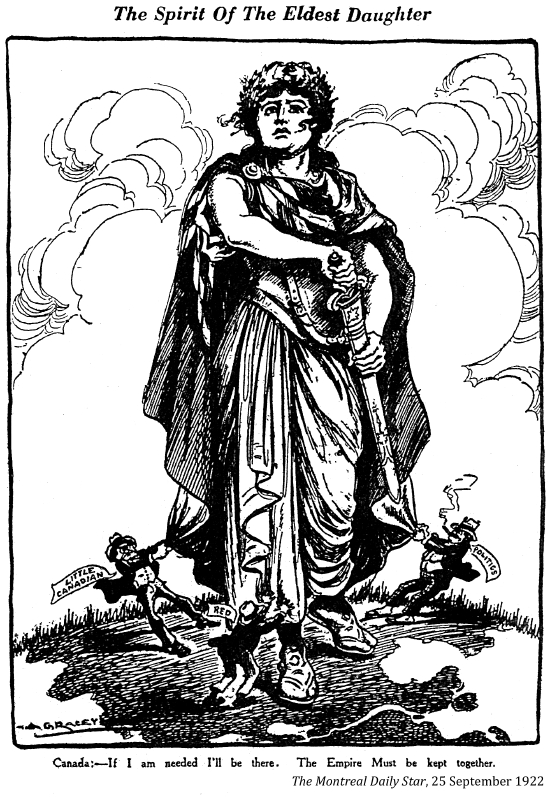
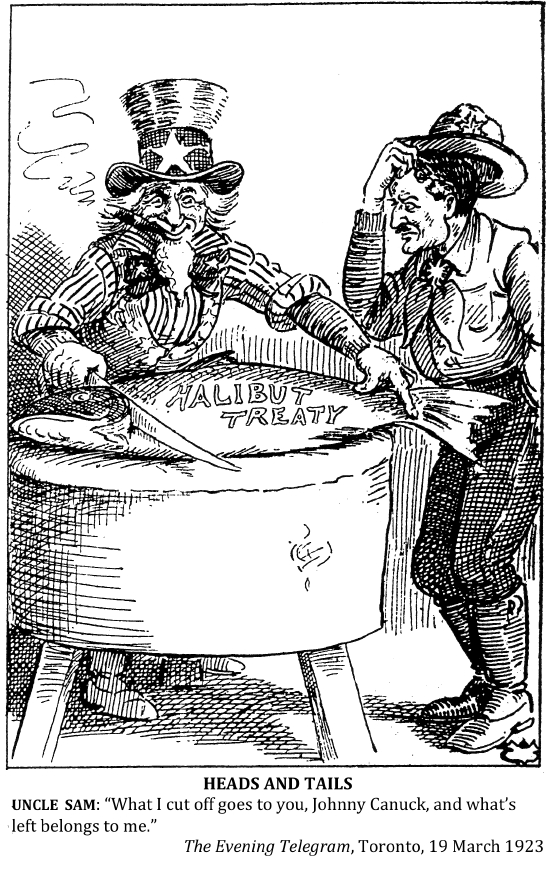
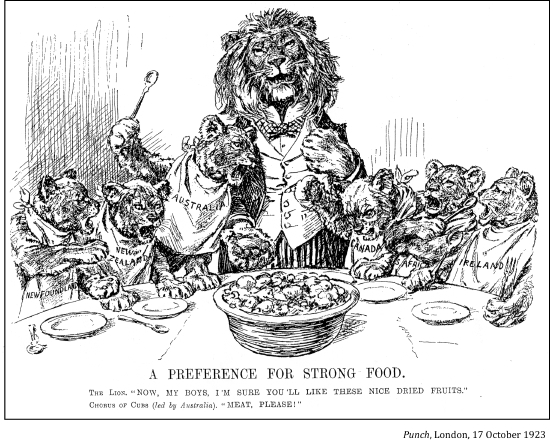
"We believe that the decision of Great Britain on any important public issue... should be made by the people of Britain, their representatives in parliament, and the Government responsible to that parliament. So the decision of Canada on any important issue, domestic or foreign, we believe should be made by the people of Canada, their representatives in parliament, and the Government responsible to that parliament."
Mackenzie King, speaking at the Imperial Conference, October 8, 1923
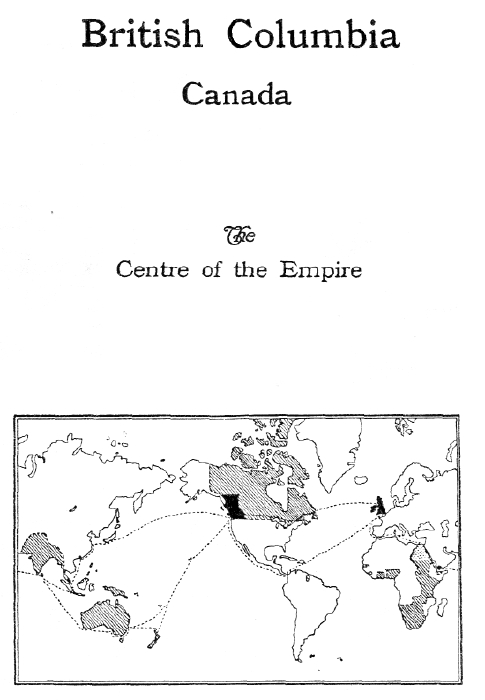
British Columbia Agent General, London, Eng., Victoria, 1924
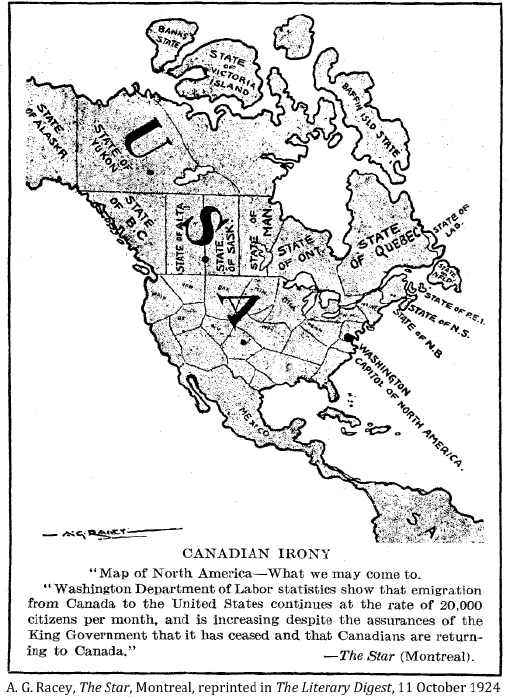
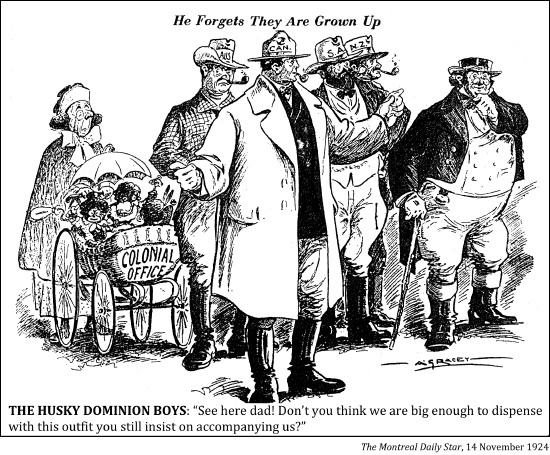
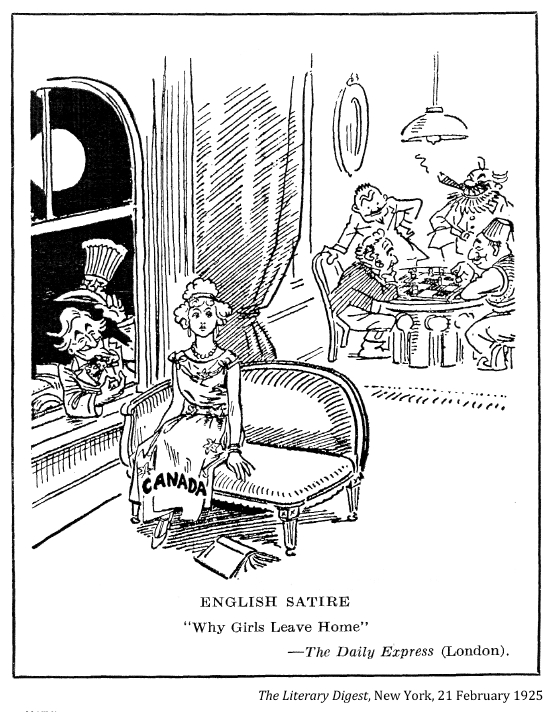
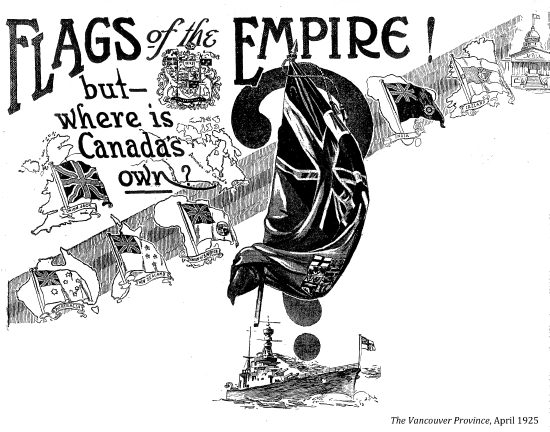
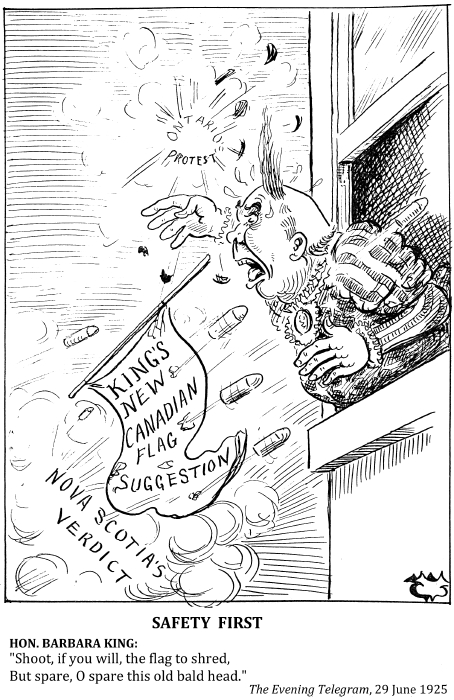
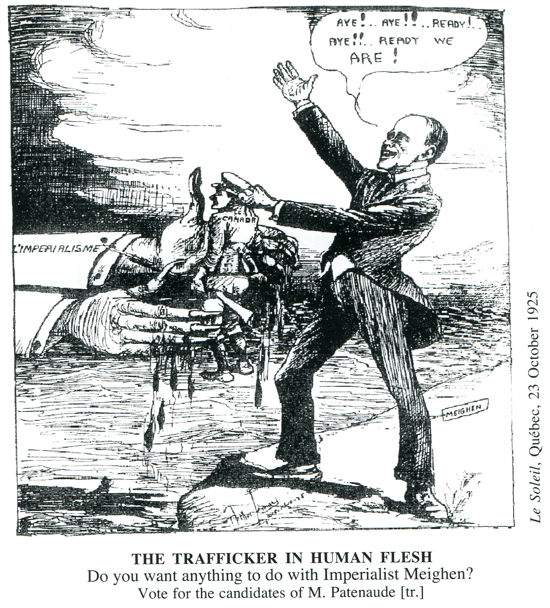
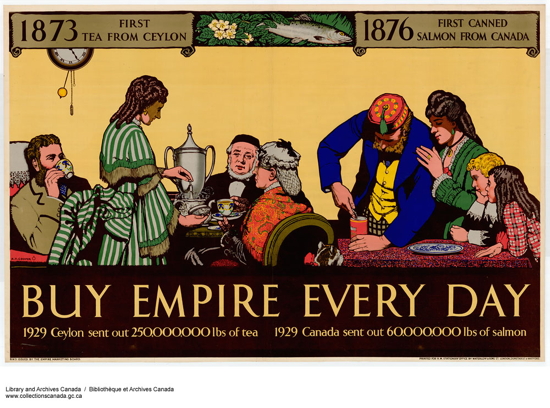
LAC Acc. No. 1983-27-280
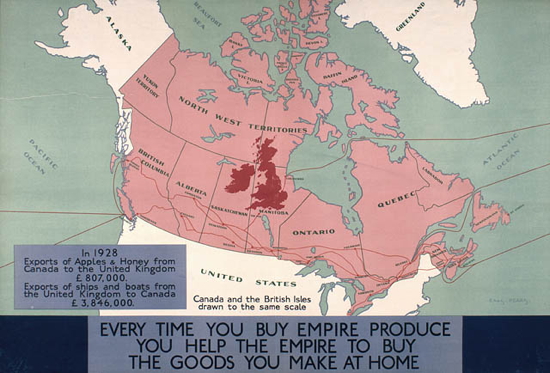
LAC Acc. No. 1983-27-237
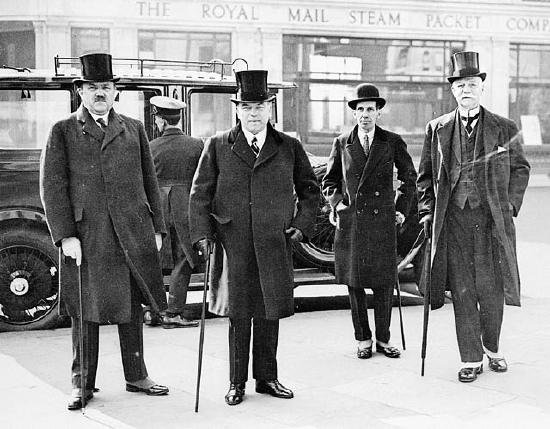
1926 Canadian delegates attending the Imperial Conference. LAC, Aitken Ltd./C-001690, (L-R): Hon. Ernest Lapointe, Rt. Hon. W.L. Mackenzie King, Vincent Massey, Hon. Peter Larkin, Oct. 1926
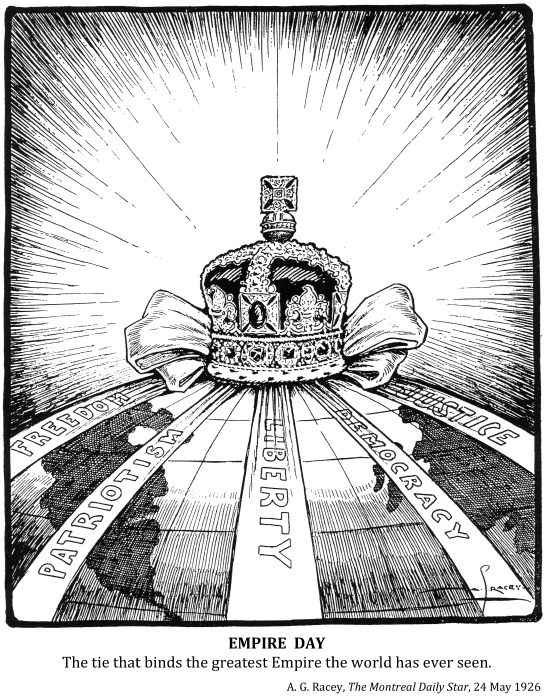
"They [the Dominions] are autonomous Communities within the British Empire, equal in status, in no way subordinate one to another in any aspect of their domestic or external affairs, though united by a common allegiance to the Crown, and freely associated as members of the British Commonwealth of Nations."
Balfour Declaration, 1926
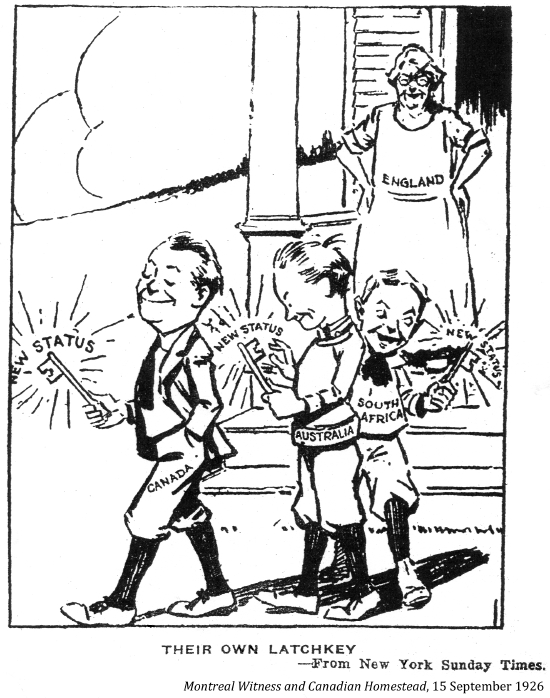
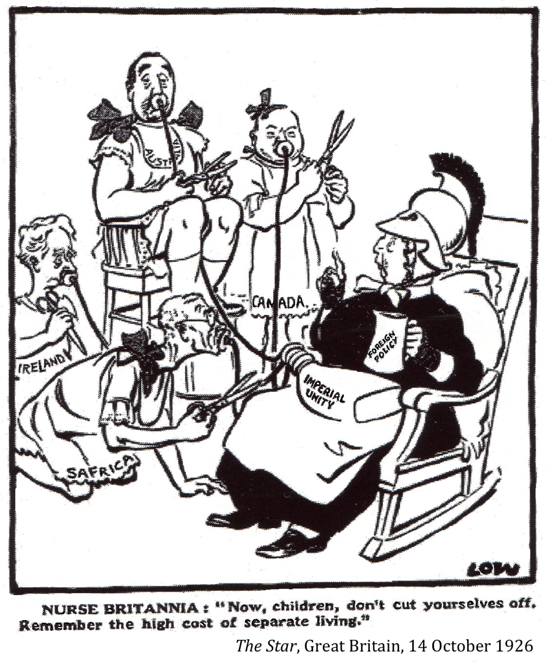
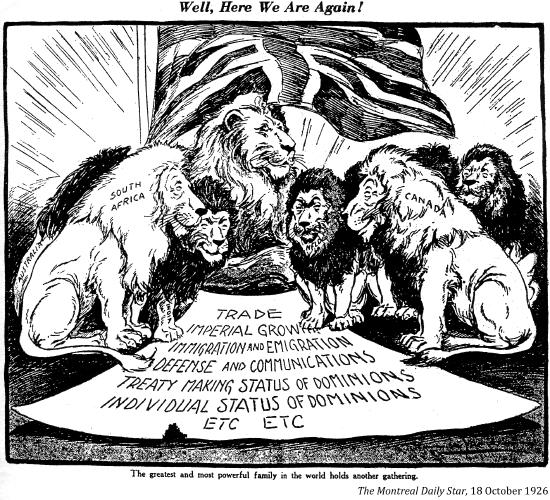
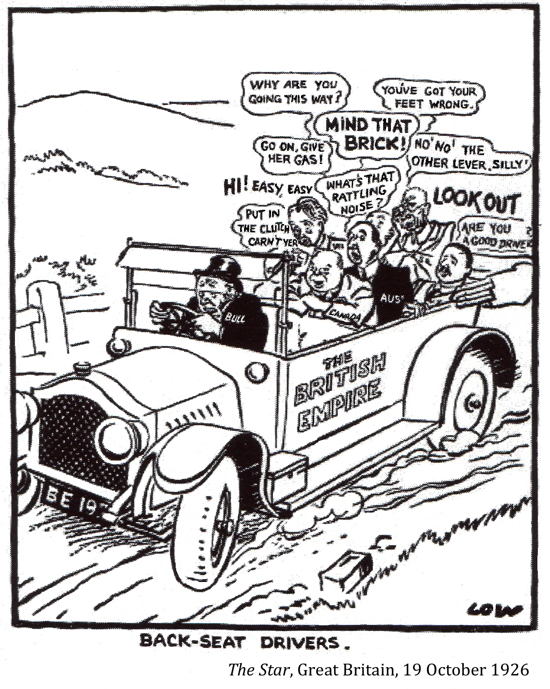
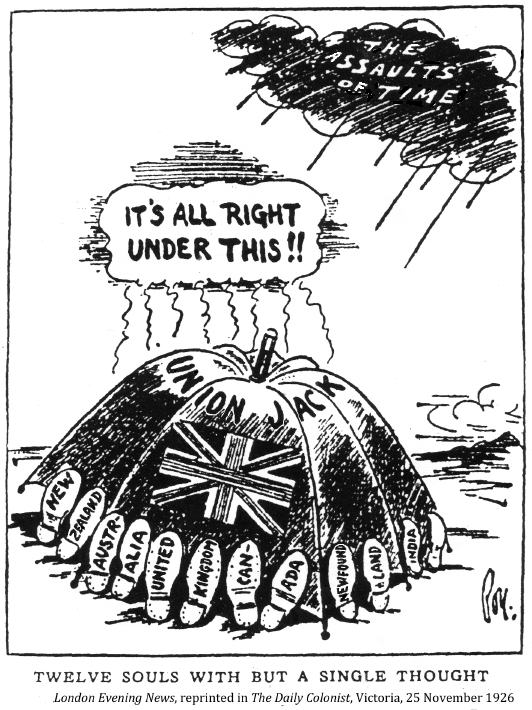
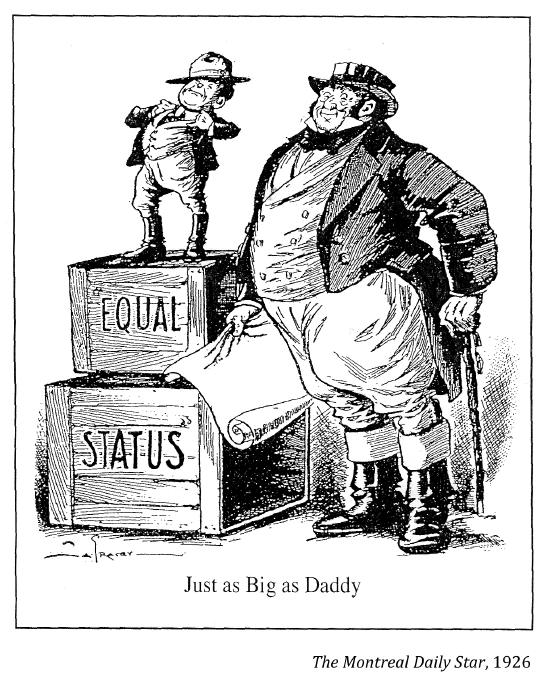
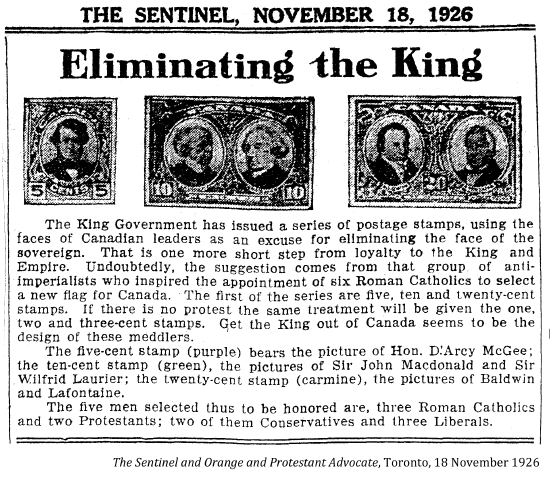
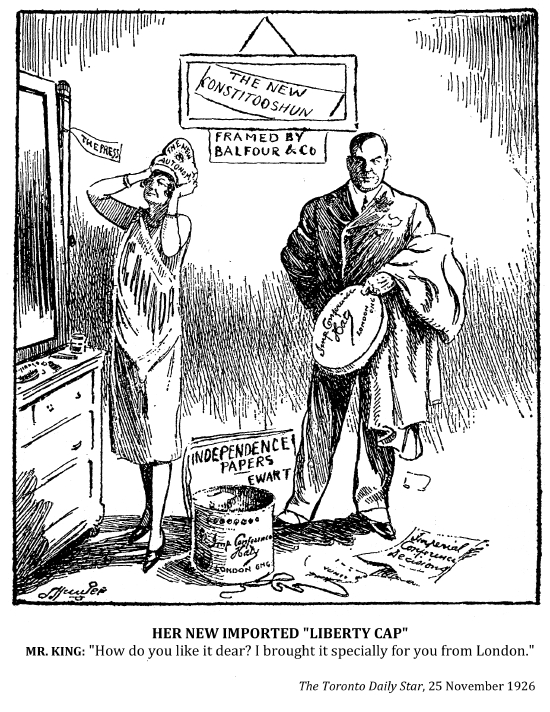
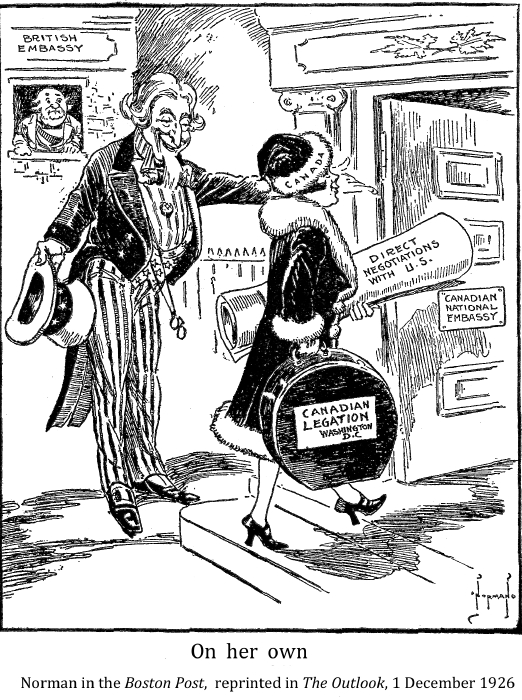
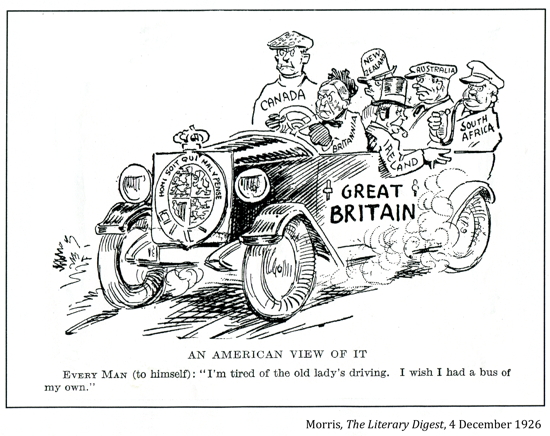
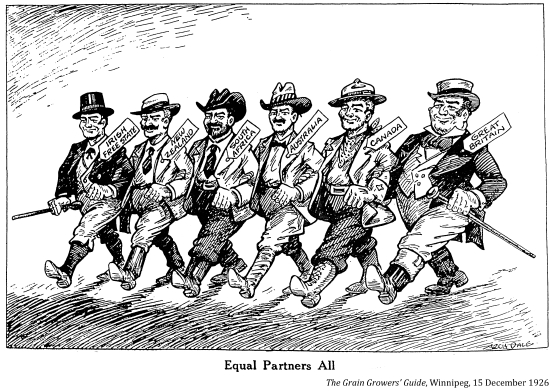
"In 1927 Canada signed a treaty with the U.S. on halibut fishing without British involvement."
Jim Reynolds, Canada and Colonialism An Unfinished Business
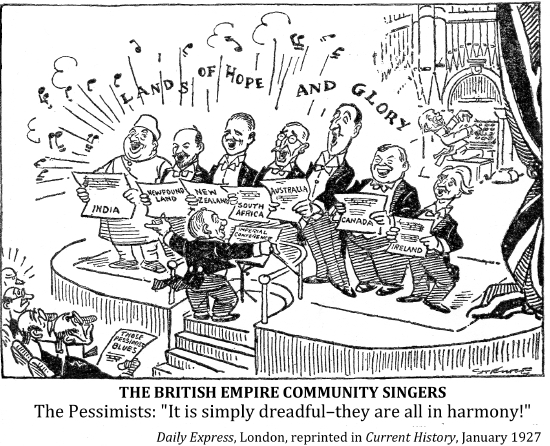
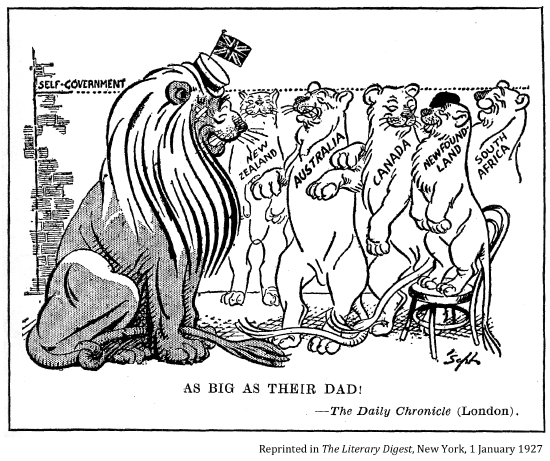
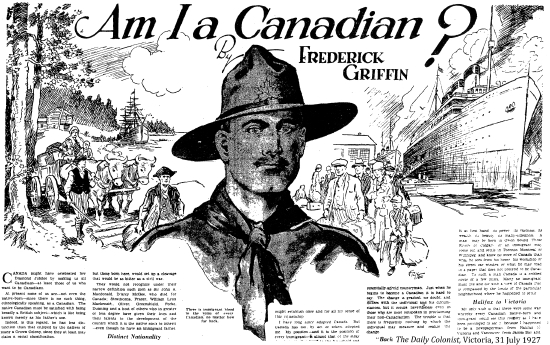
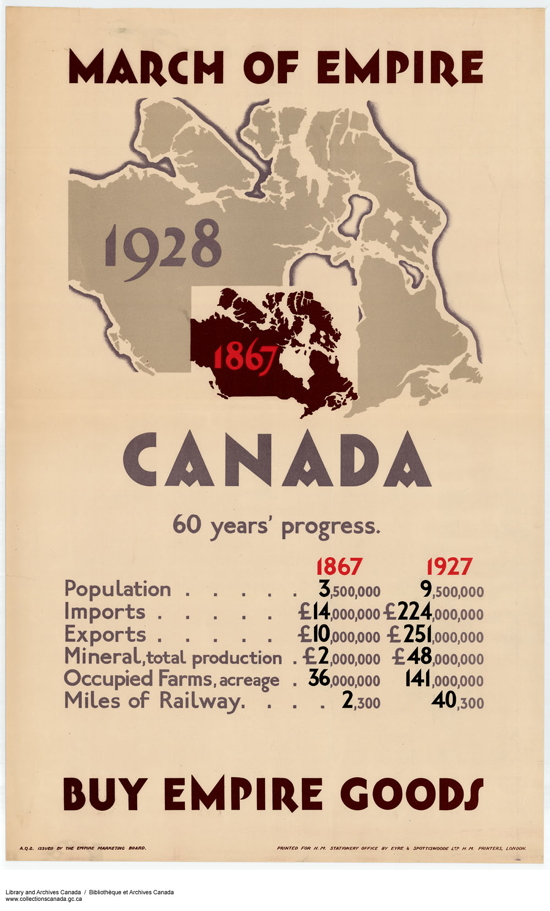
LAC Acc. No. 1983-27-185
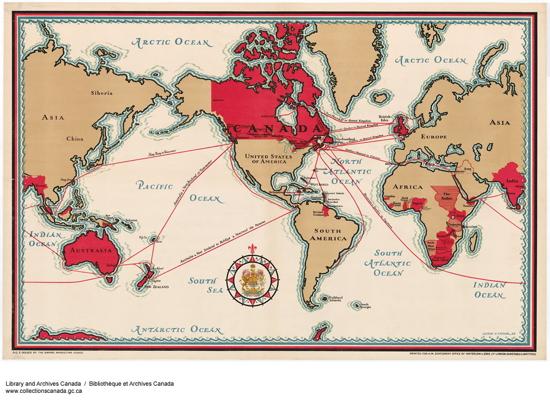
LAC Acc. No. 1983-27-186
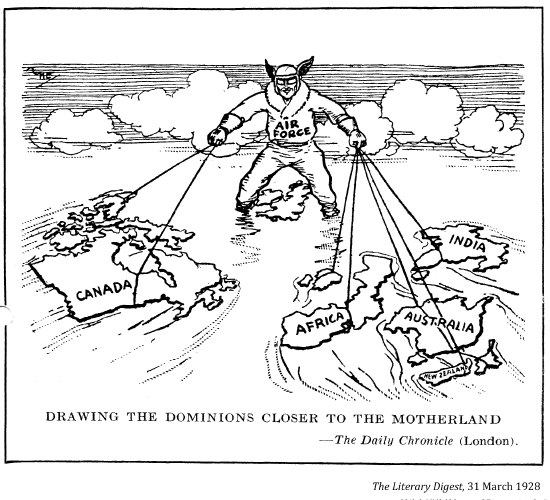
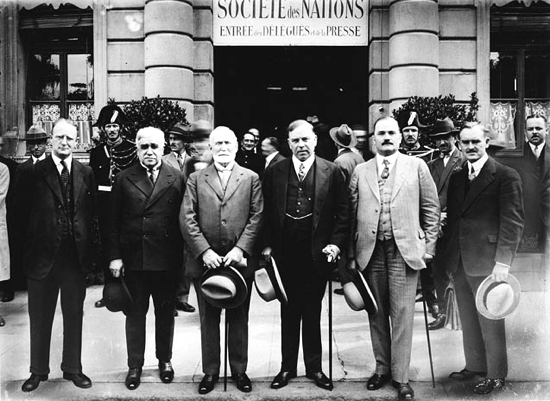
1928 Canadian Delegation, League of Nations. LAC, C-009055, 3 September 1928, (L-R): O.D. Skelton, Philippe Roy, Raoul Dandurand, Rt. Hon. W.L. Mackenzie King, Charles Dunning, W.A. Riddell
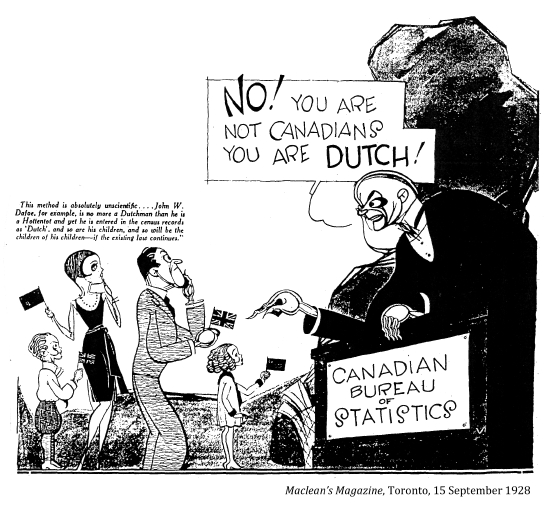
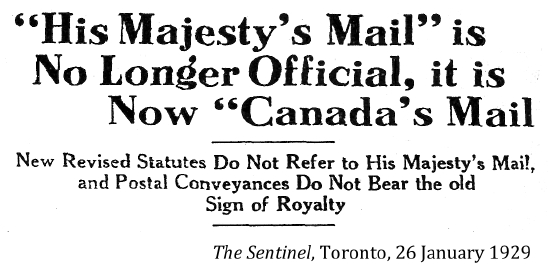
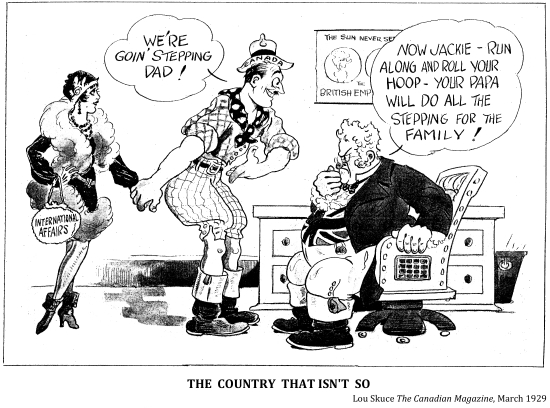
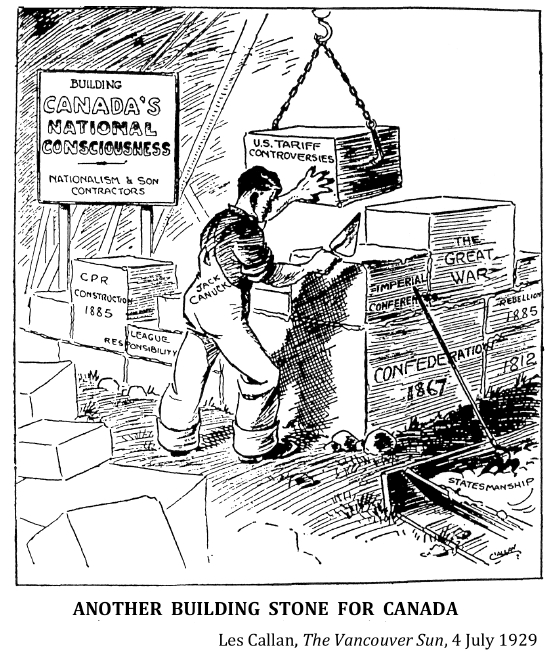
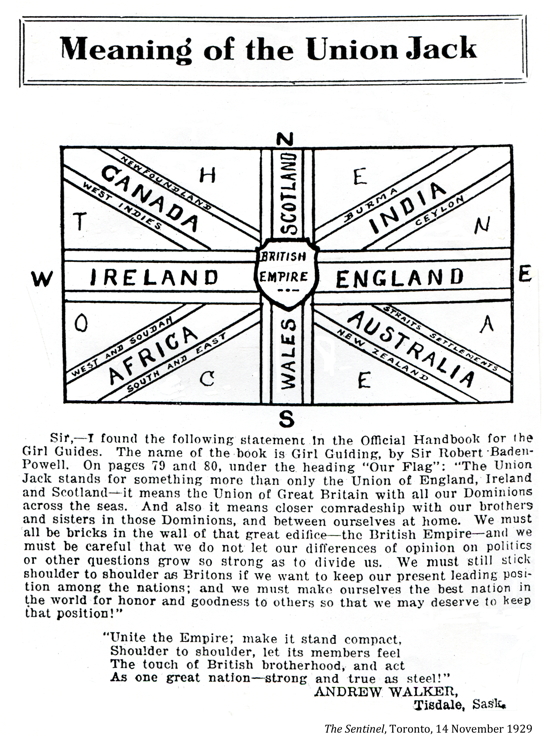
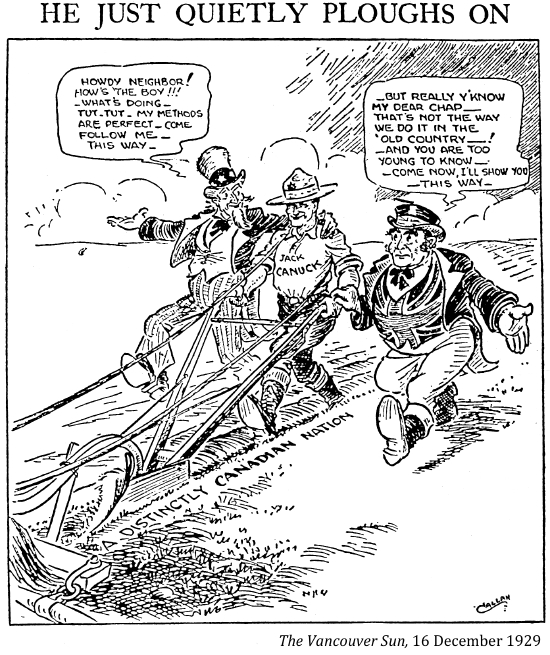
"John Bull was fat and Uncle Sam lanky and old. Johnny Canuck was barrel-chested, fit and youthful, symbolizing the promise and purity of a new land."
Will Ferguson, Why I Hate Canadians
"Canada First, Then the Empire."
R. B. Bennett, 1930
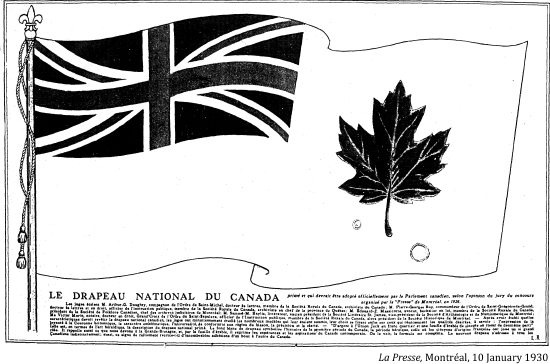
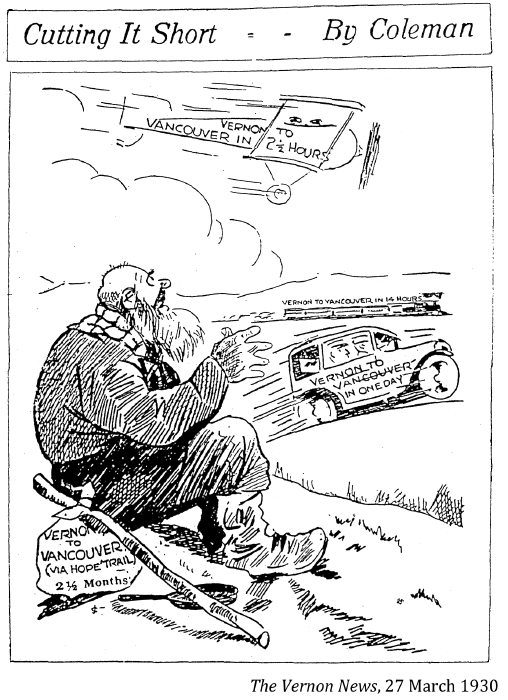

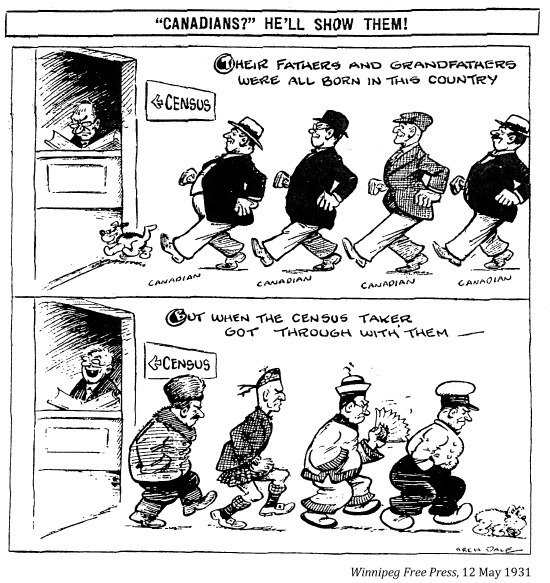
"It is hereby declared and enacted that the Parliament of a Dominion has full power to make laws having extra-territorial operation."
Statute of Westminster, 1931
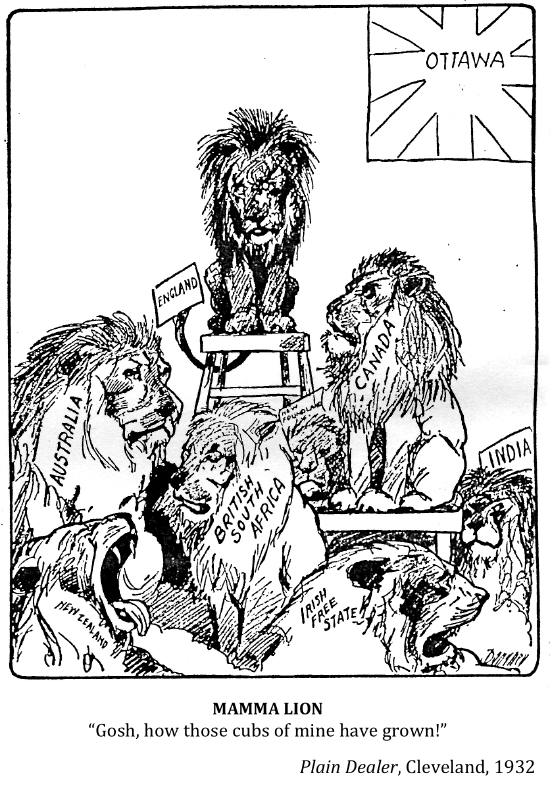
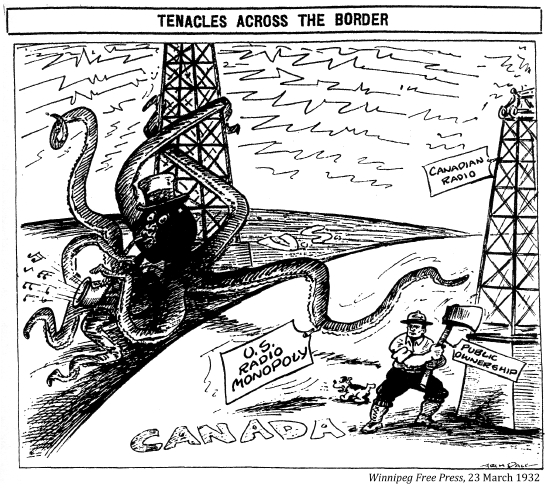
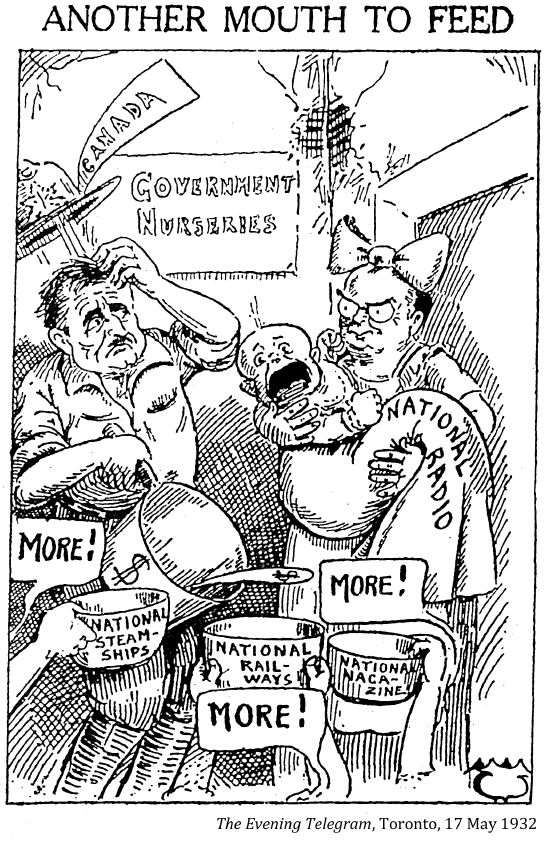
"That it is expedient to bring in a measure to provide for the constitution of a commission to be known as The Canadian Radio Broadcasting Commission, for the purpose of acquiring, operating, regulating and controlling radio broadcasting in Canada . . .
This country must be assured of complete Canadian control of broadcasting from Canadian sources, free from foreign interference or influence . . . [it is an] agency by which national consciousness may be fostered and sustained and national unity still further strengthened."
Right Hon. R. B. Bennett, Debates House of Commons, 11 and 18 May 1932, p.2826 and p.3035
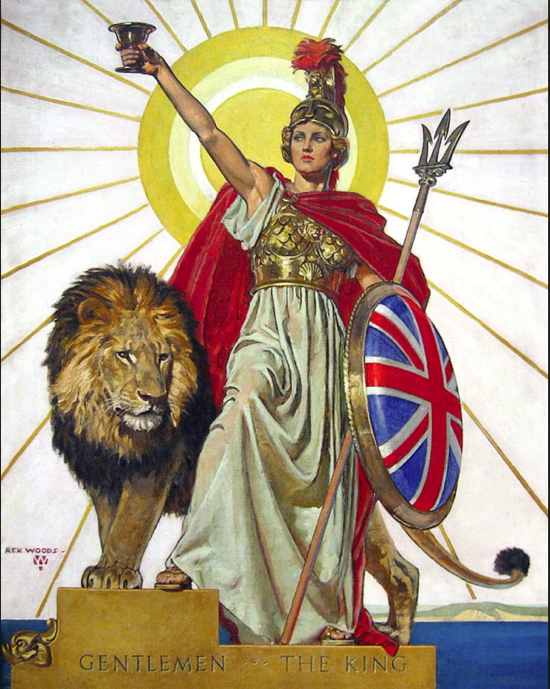
Rex Woods, Canadian Home Journal, October 1935
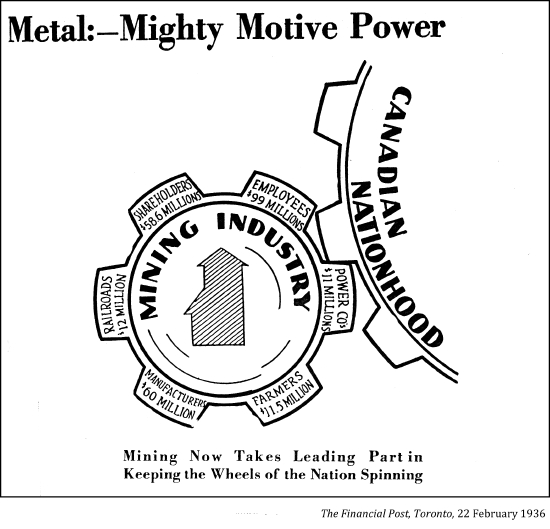
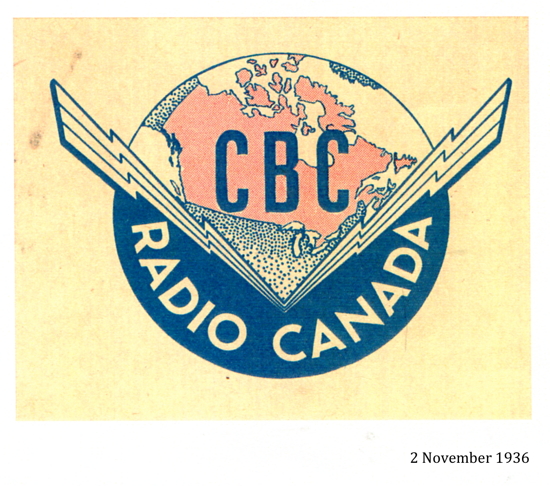
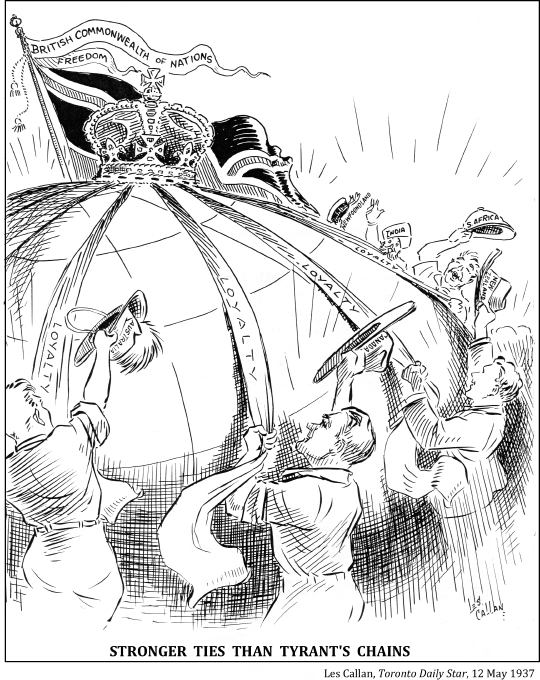
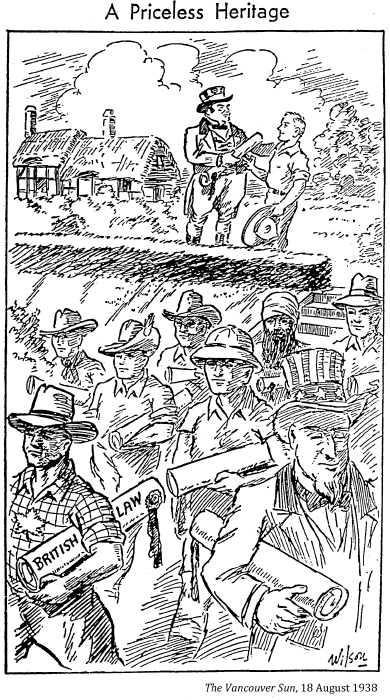
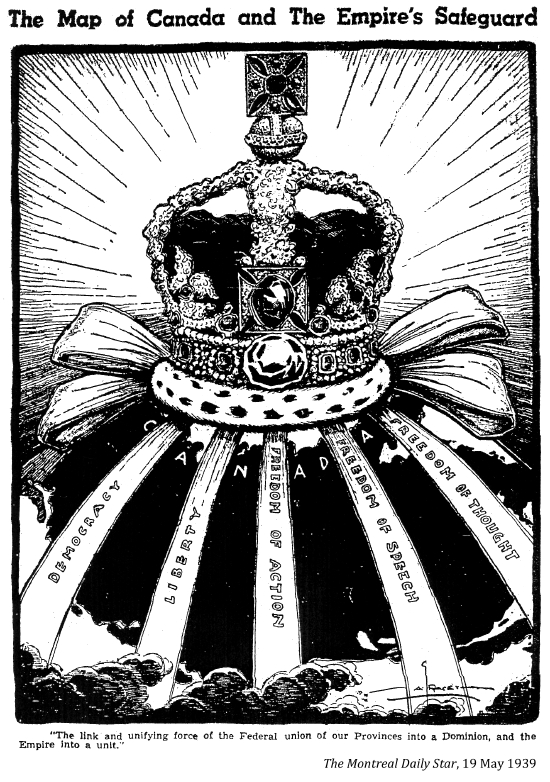
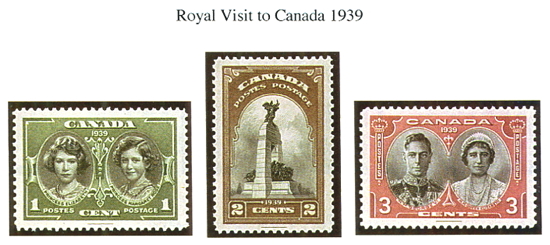
"He [Churchill] recognized that Ogdensburg [18 August 1940] represented Canada's ultimate transfer from one empire to another."
Desmond Morton, A Short History of Canada
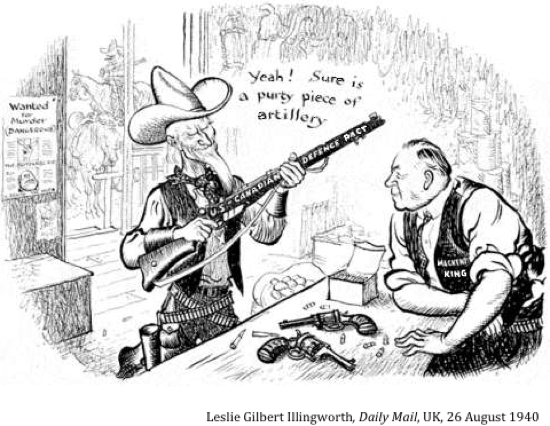

"ln the course of the present war we have seen Canada emerge from nationhood into a position generally recognized as that of a world power."
William L. M. King, 1 July 1943
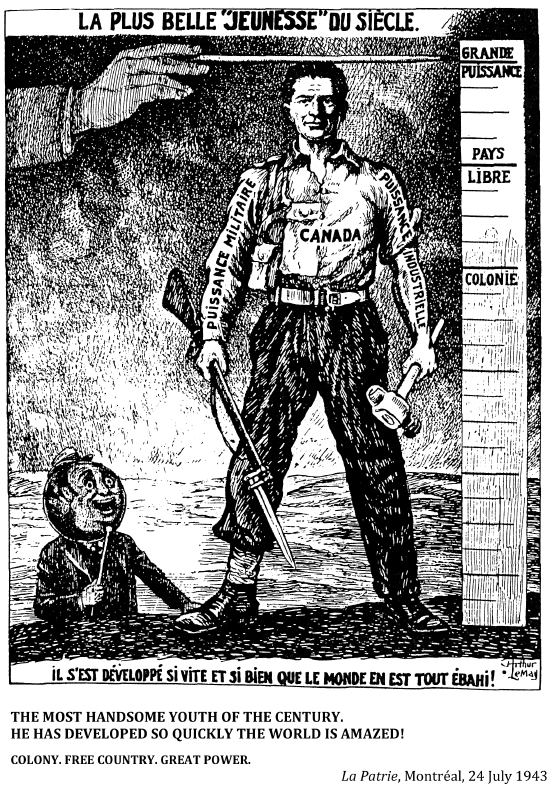
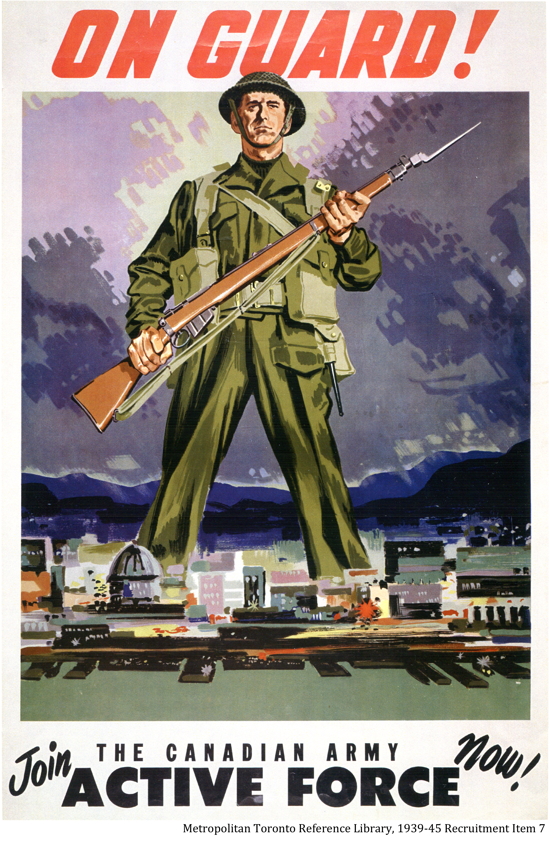

Metropolitan Toronto Public Library
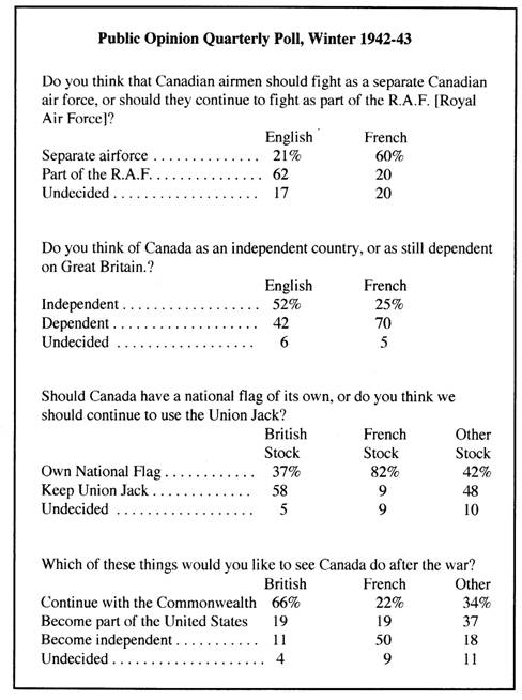
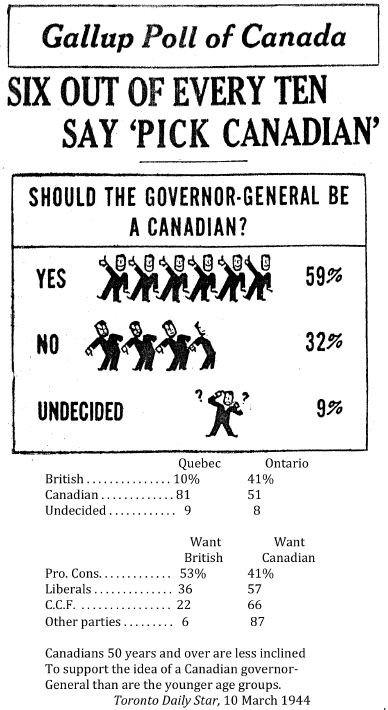
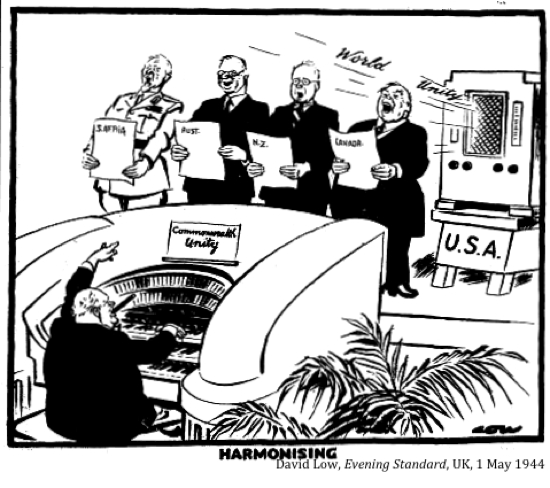
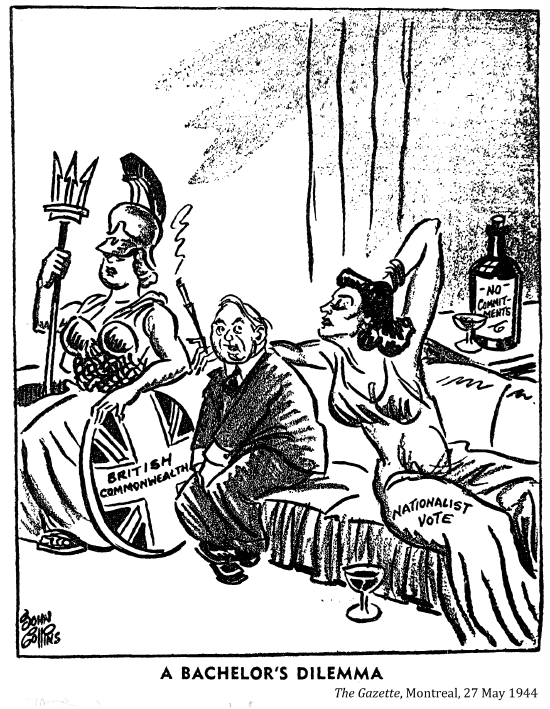
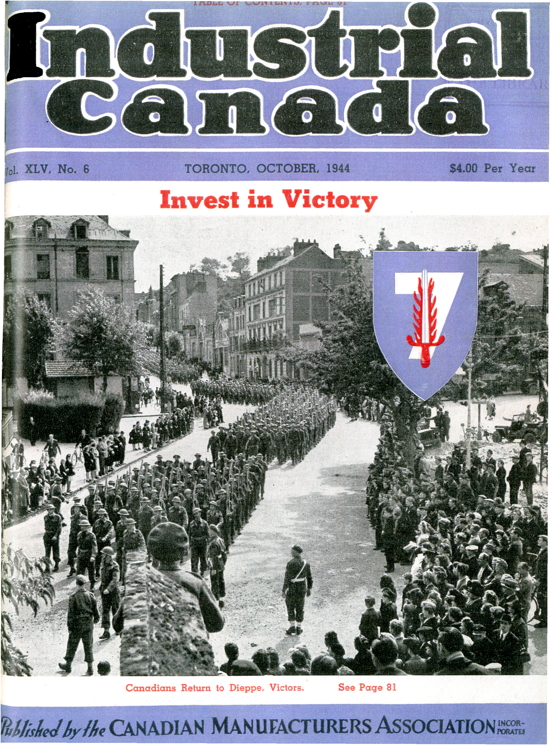
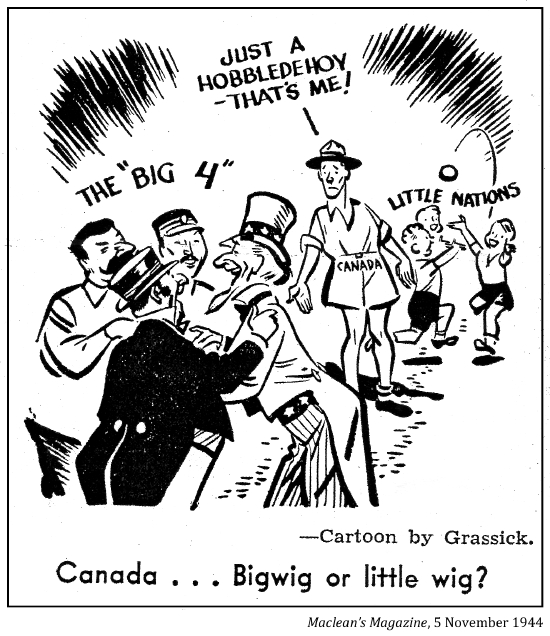
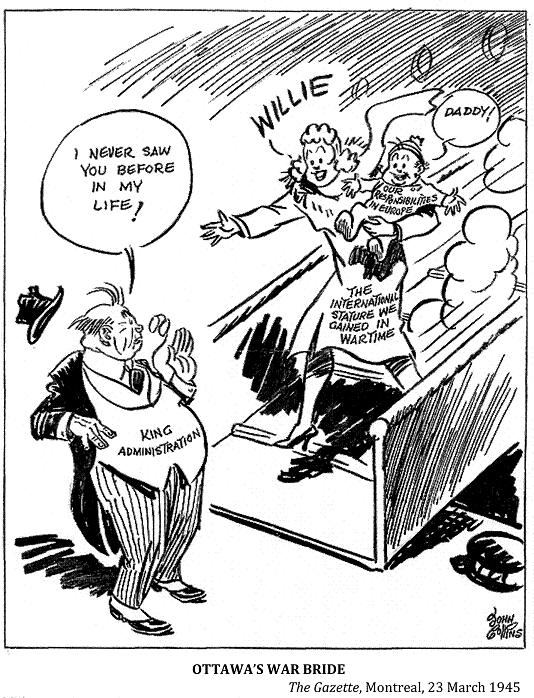
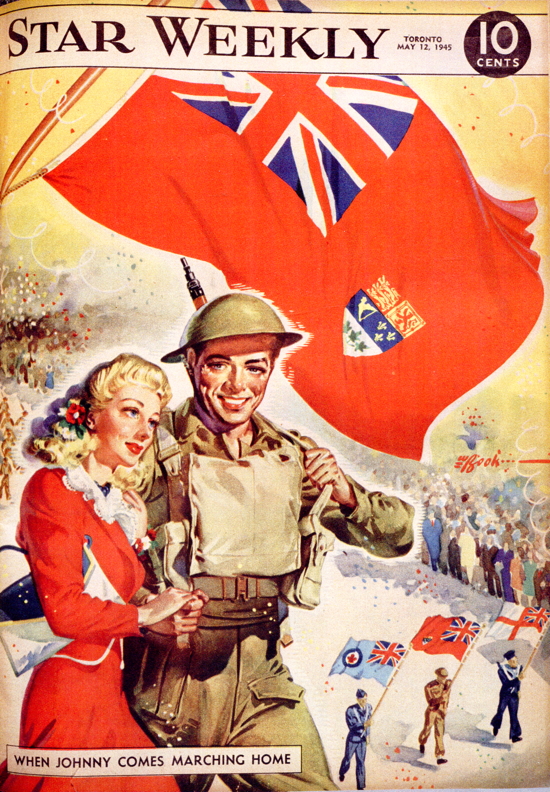
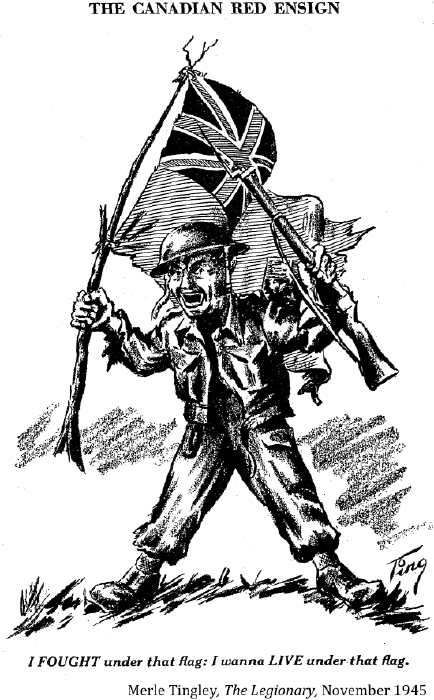
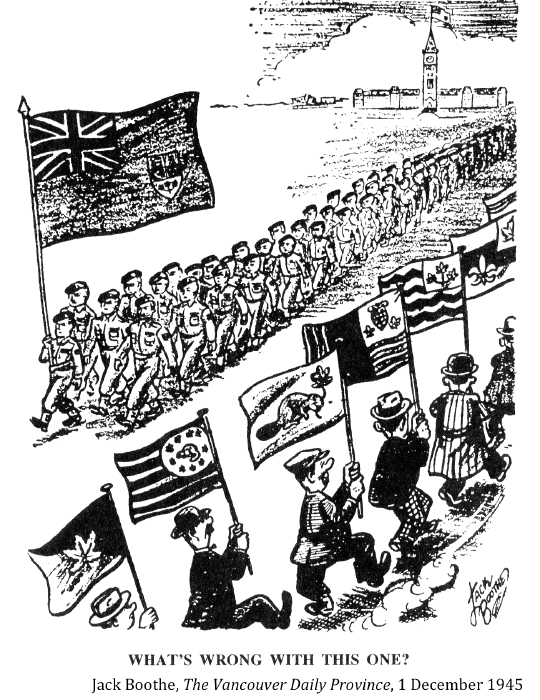
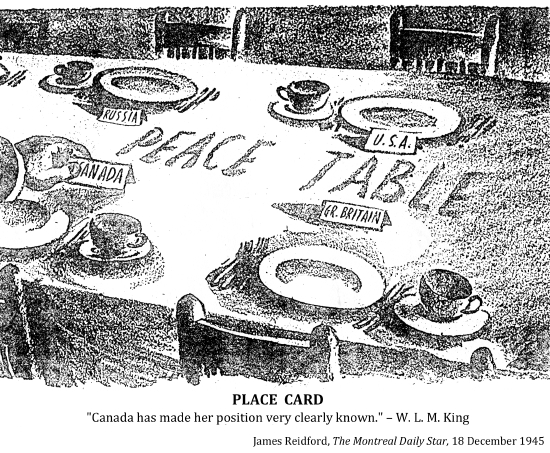

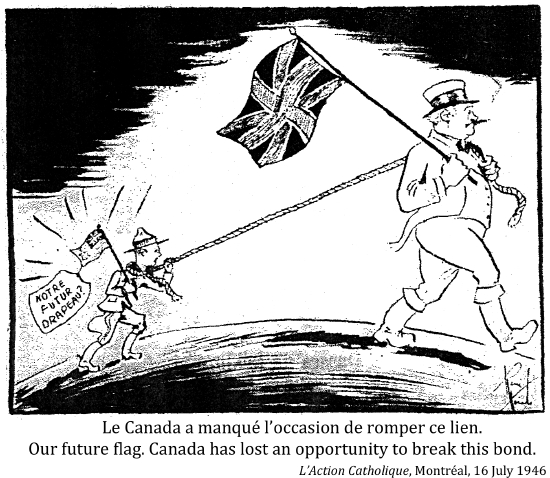
[The inspiration for the Citizenship Act came to Paul Martin from a tour of the military cemetery at Dieppe.] "The racial origins of the dead were so varied . . . It struck me that herein lay the character of Canada, a land of people of diverse national origins."
Canadian Citizenship Act, 1946
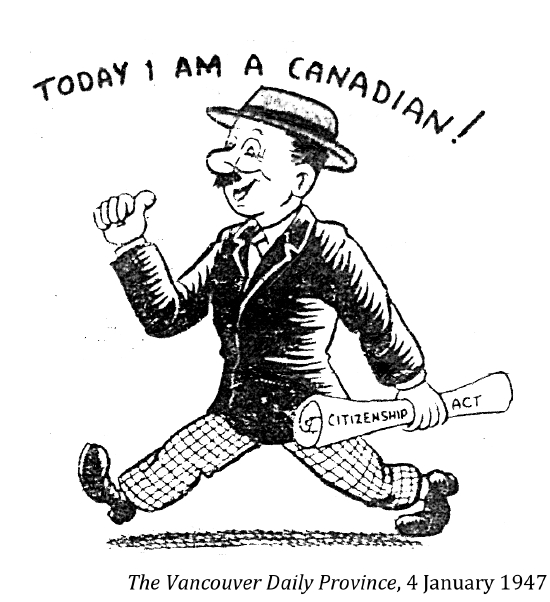
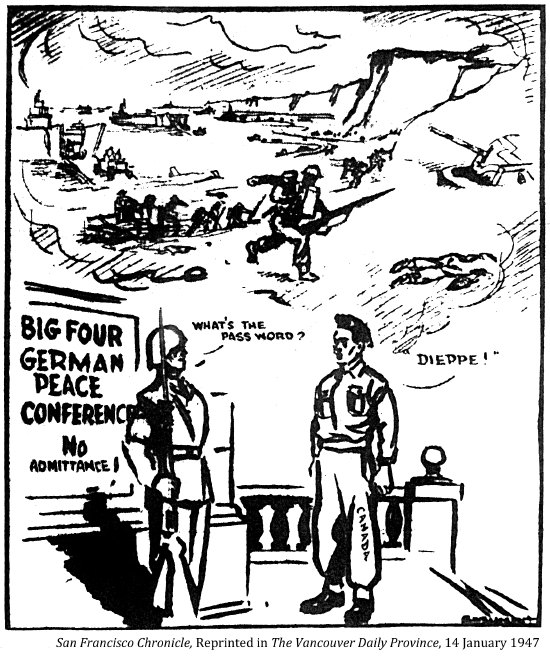
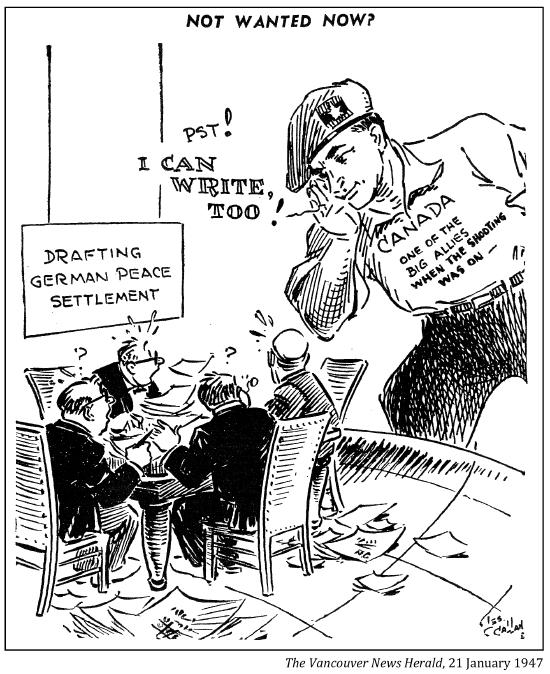
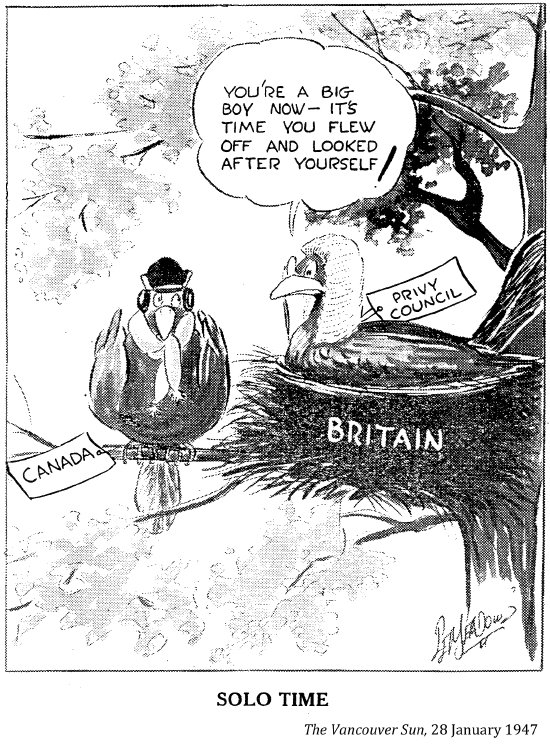
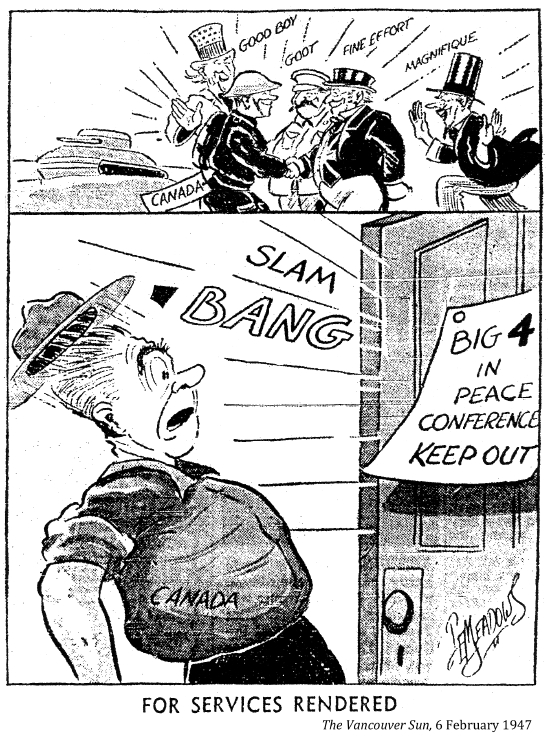
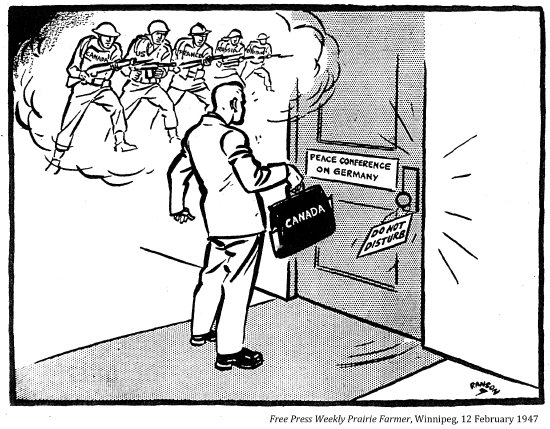
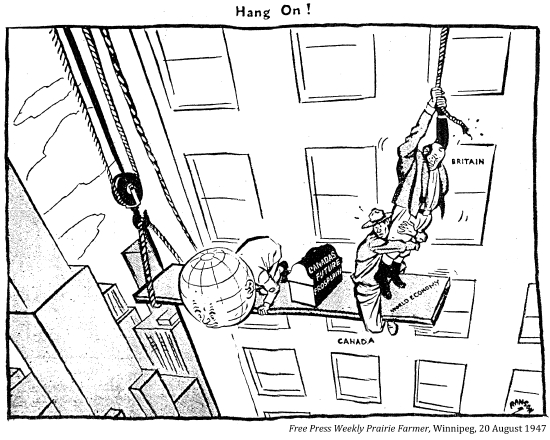
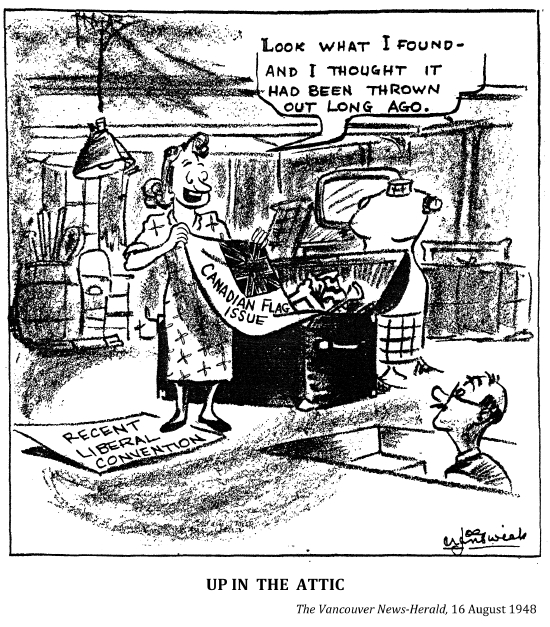
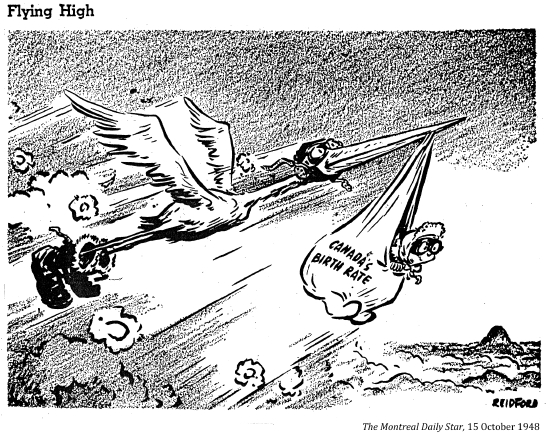
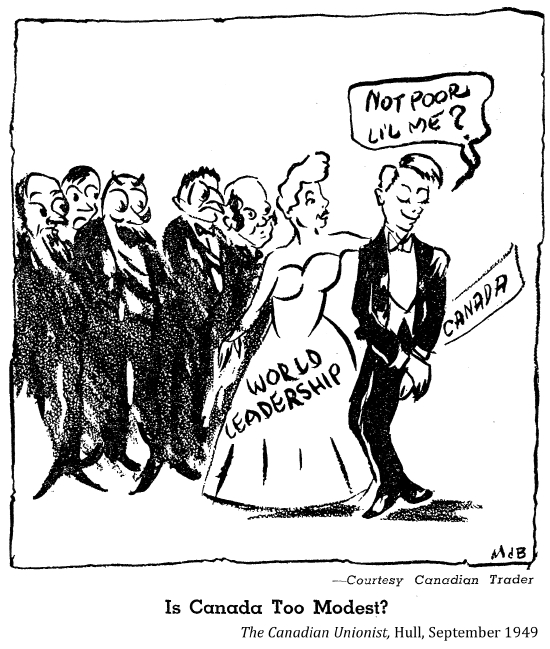
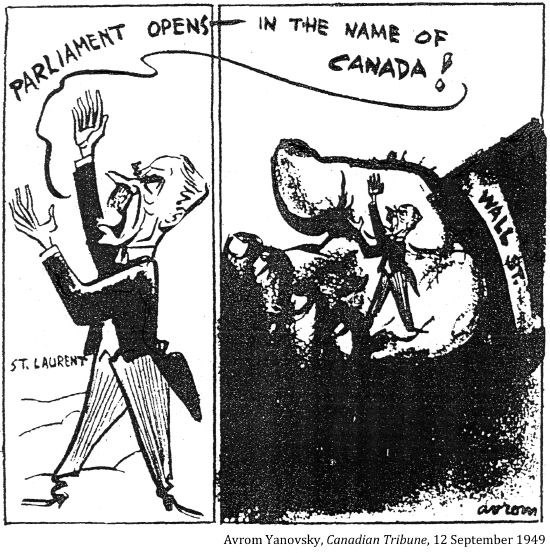
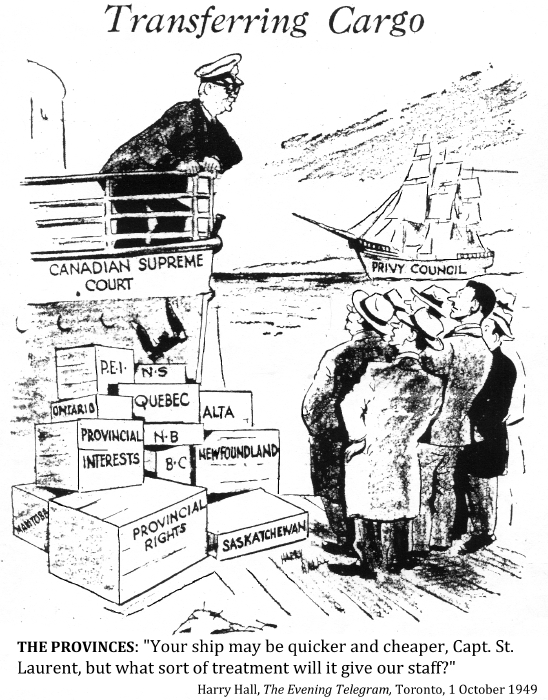
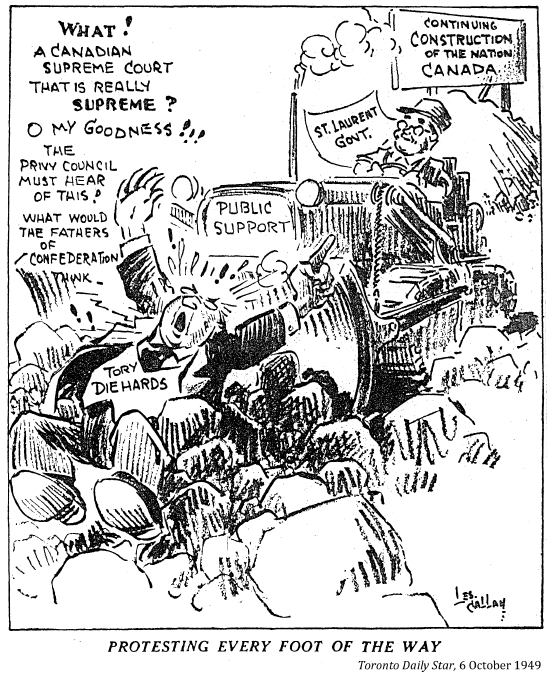
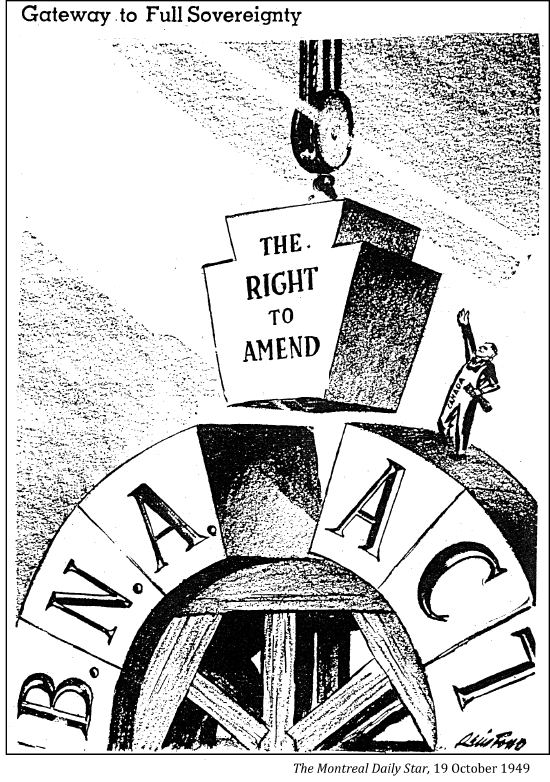
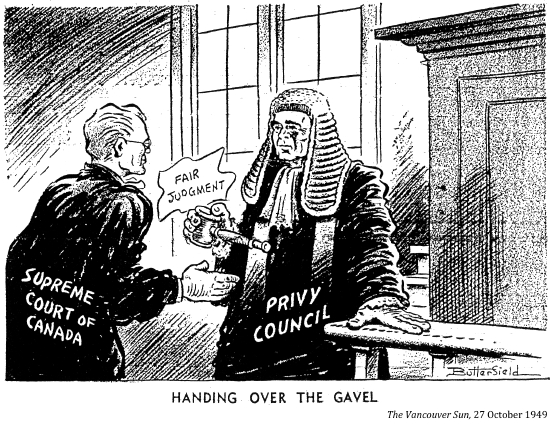
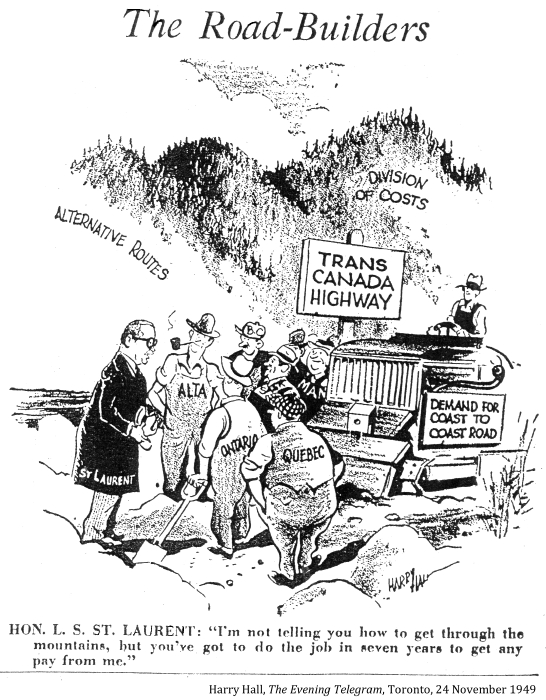
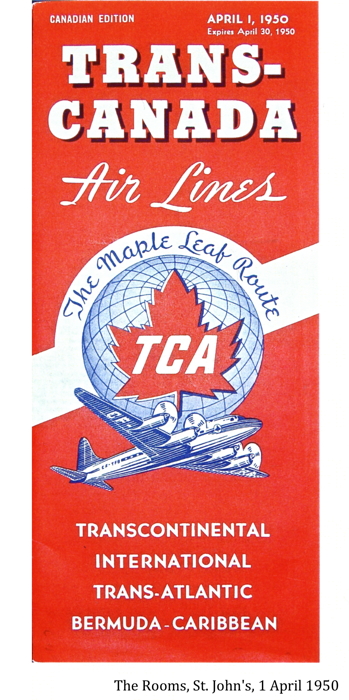
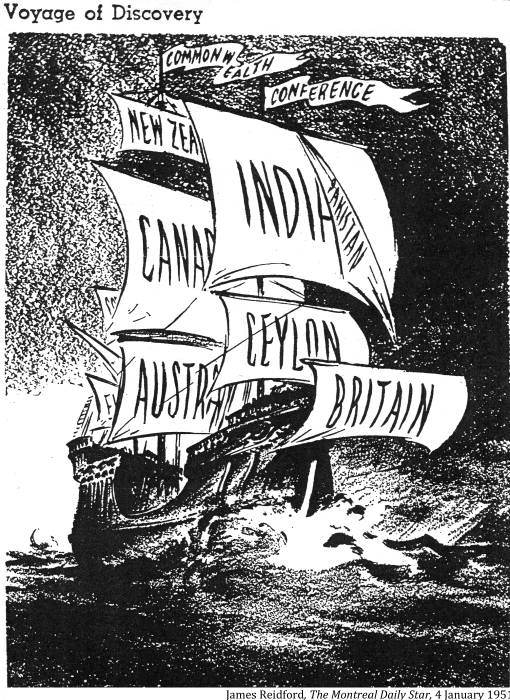
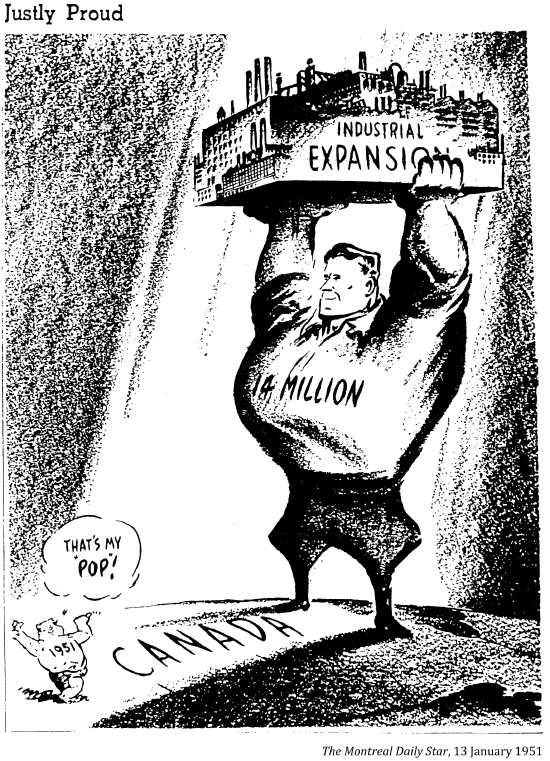

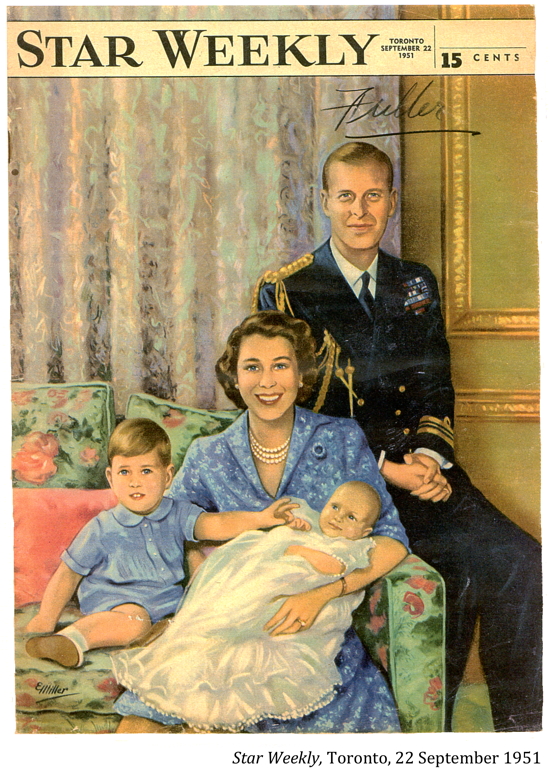
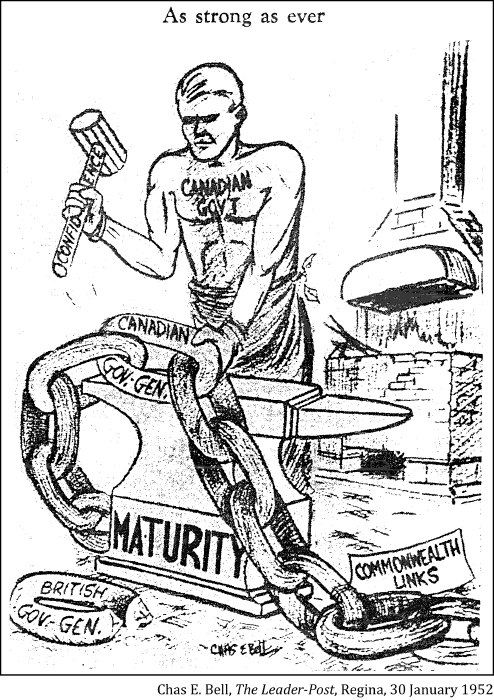
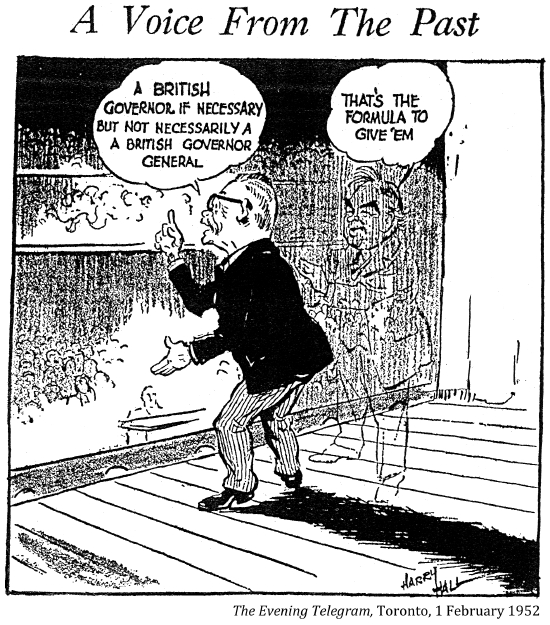
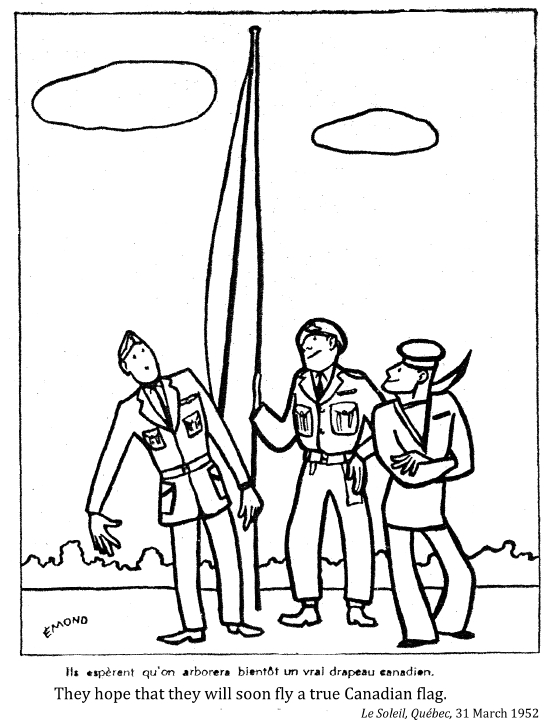
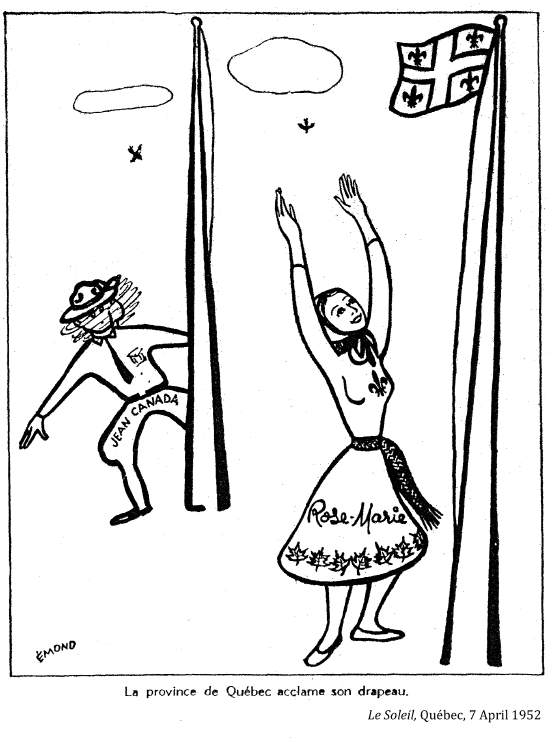
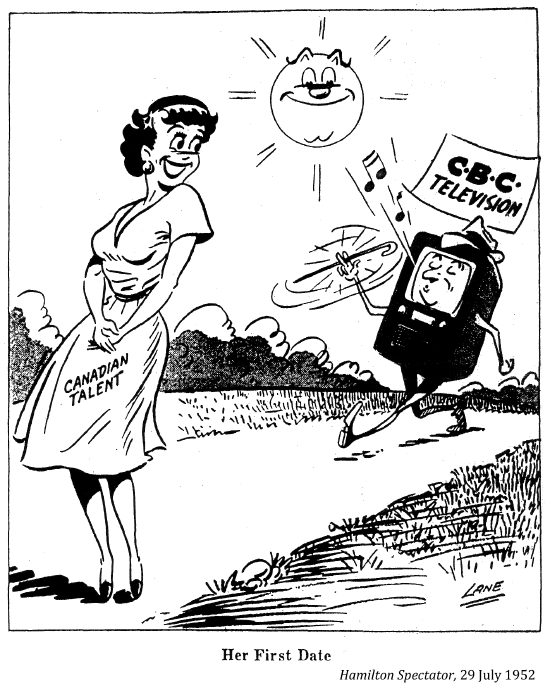
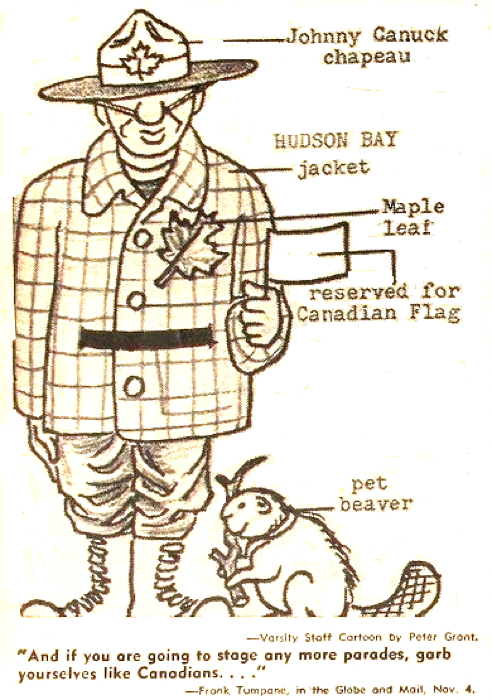
Varsity, Toronto, 5 November 1953
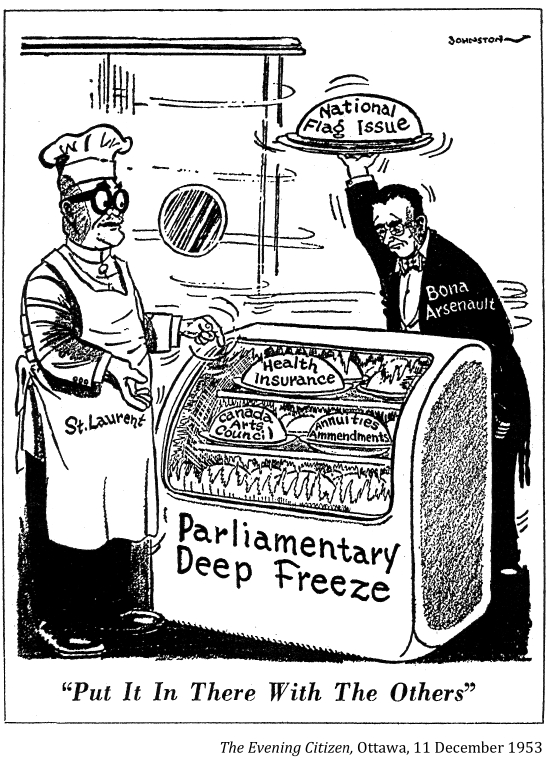
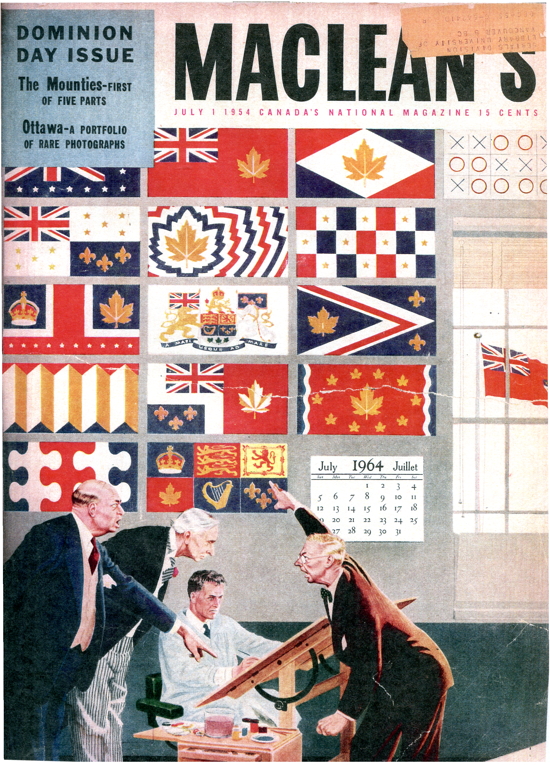
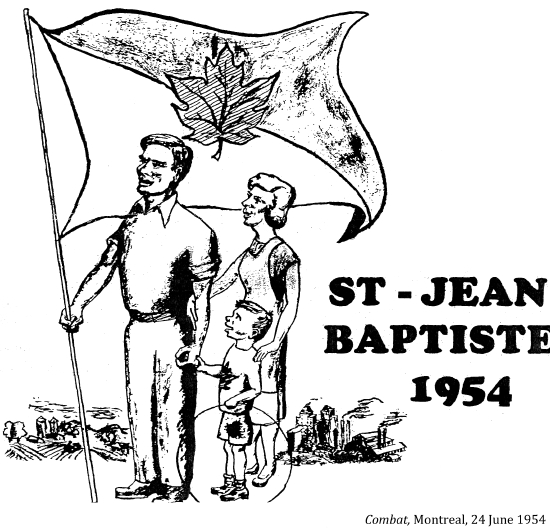
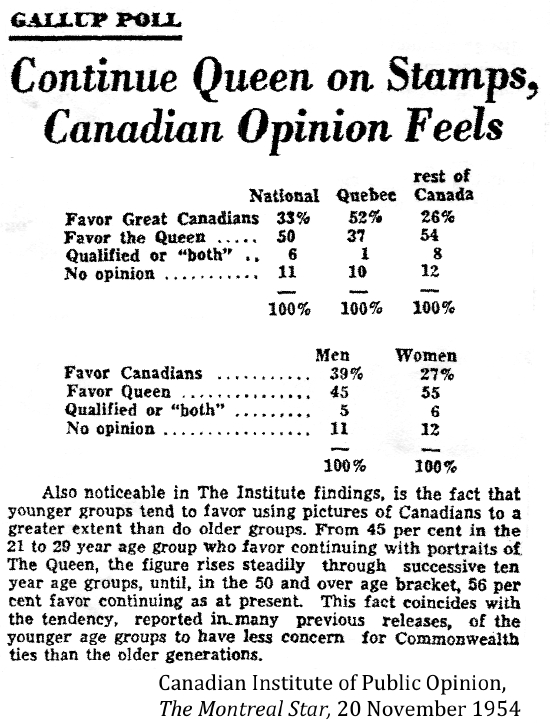
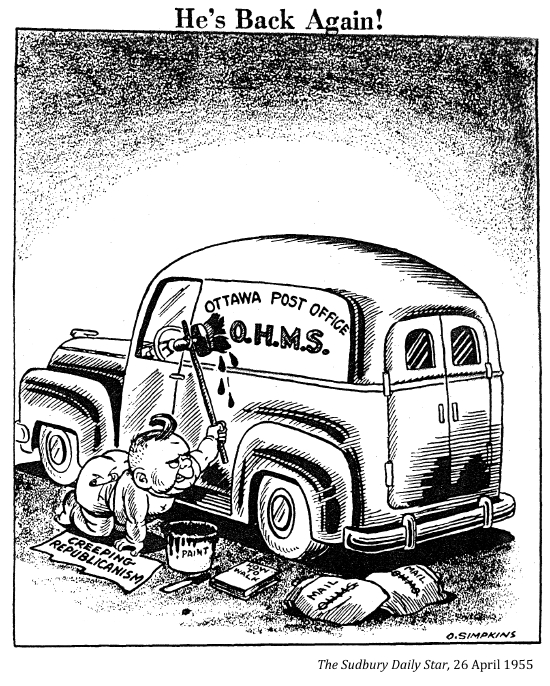
GALLUP POLL OF CANADA
Canadian Institute of Public Opinion
July 6, 1955
DO YOU APPROVE OF CANADA HAVING A NATIONAL FLAG OF ITS OWN, OR DO YOU THINK WE SHOULD CONTINUE TO USE THE UNION JACK?
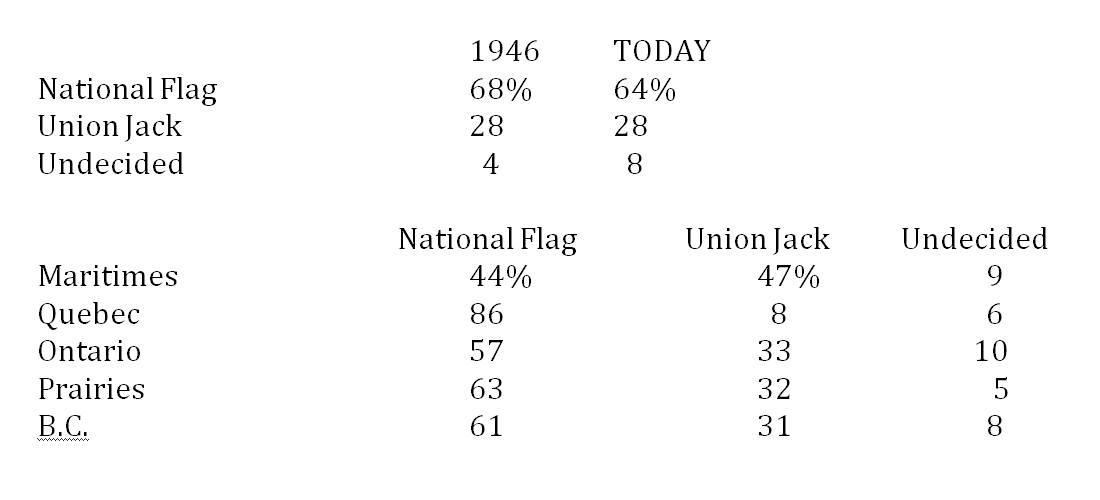
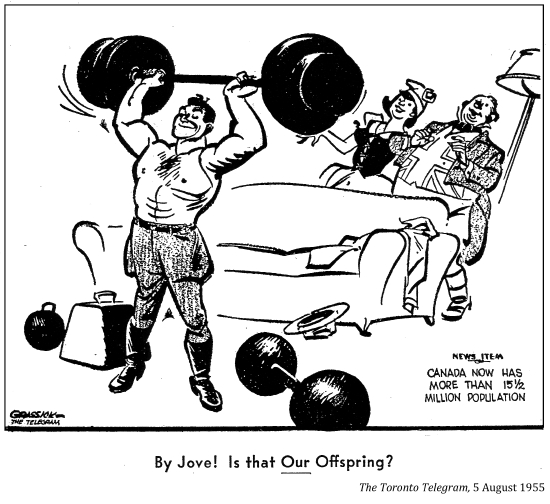
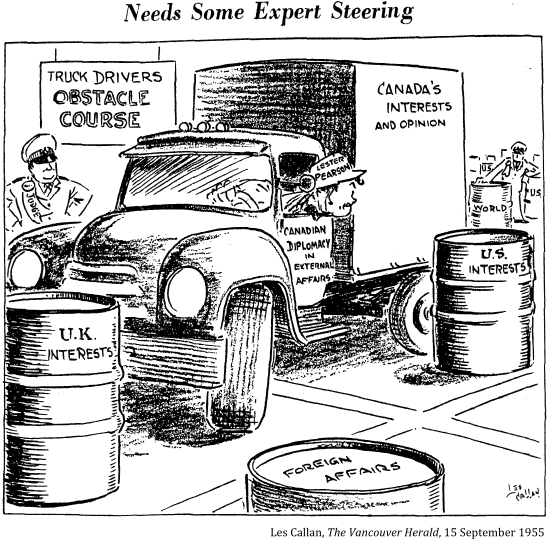
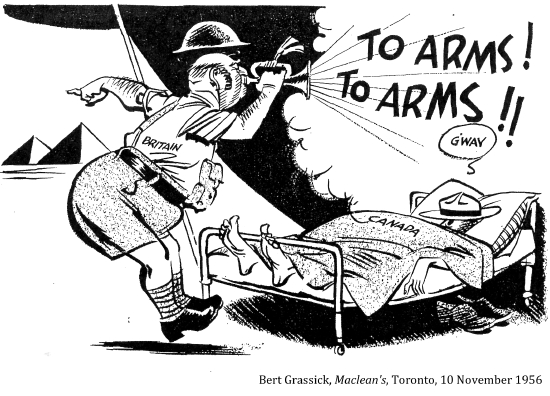
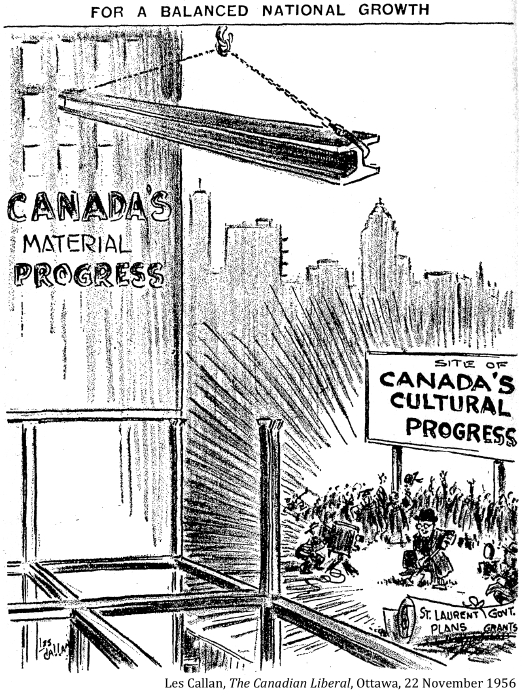
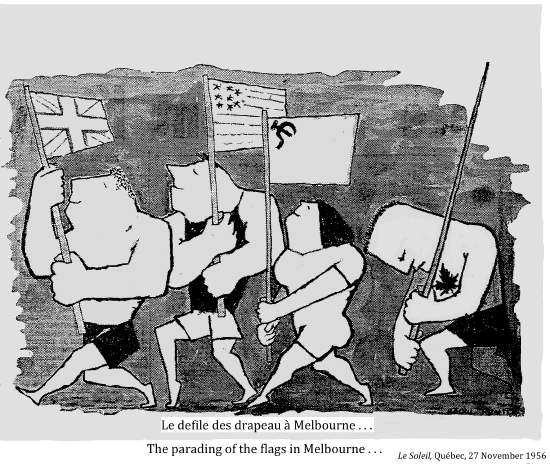
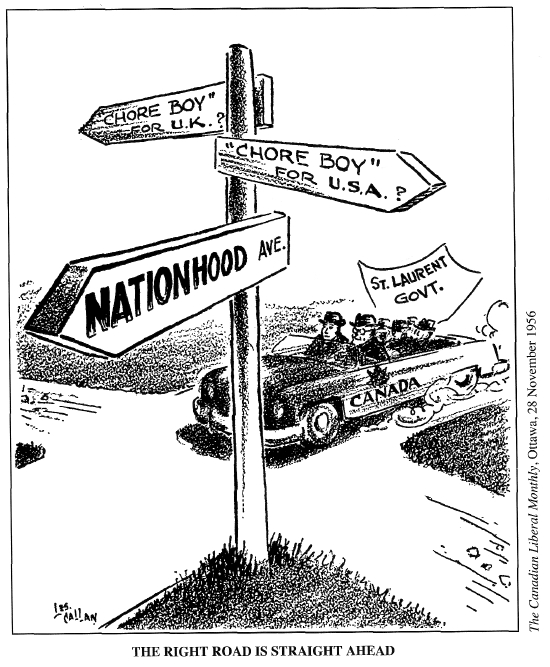
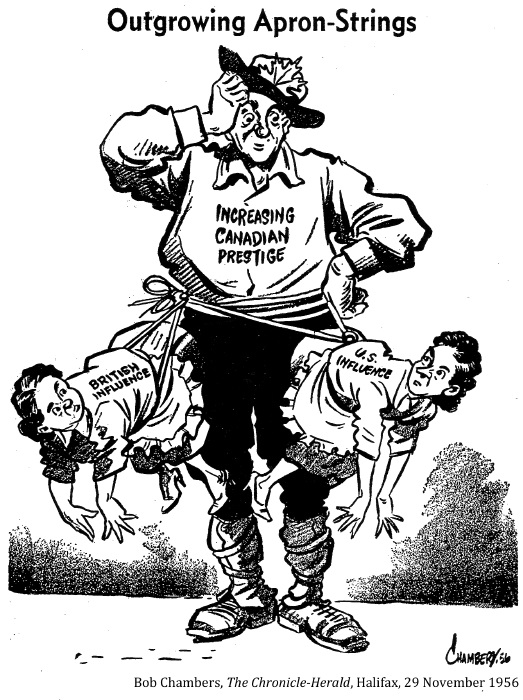
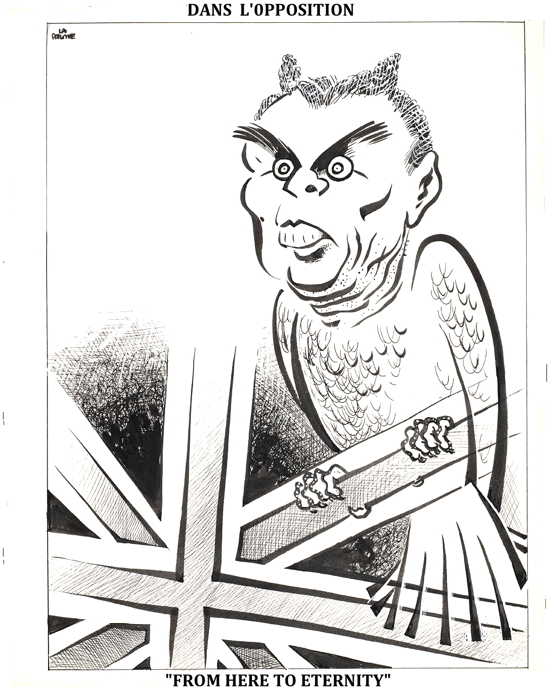
Dans l'Opposition. LAC Acc. No. 1989-150-49, Robert LaPalme, 22 December 1956
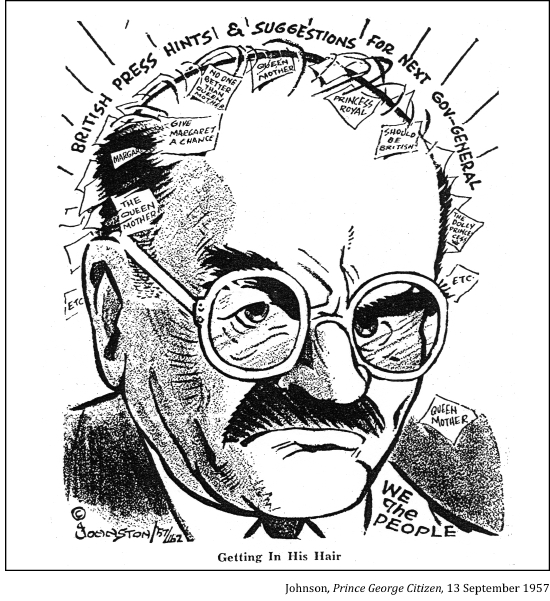
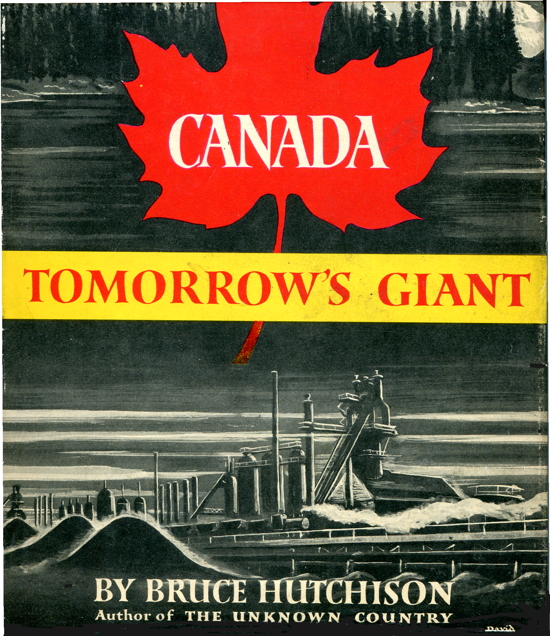
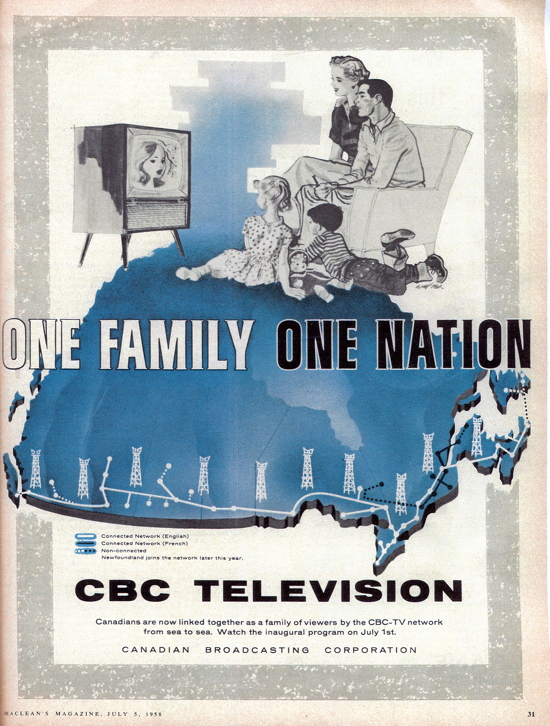
"In truth, when John Diefenbaker signed the NORAD agreement [1958], Canada lost most of its ability to act independently of the United States in a military crisis."
Knowlton Nash
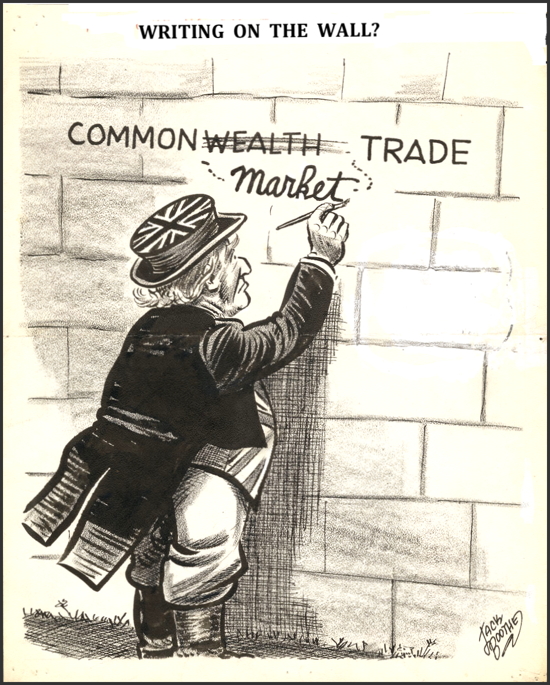
Jack Booth, The Vancouver Province, 1959
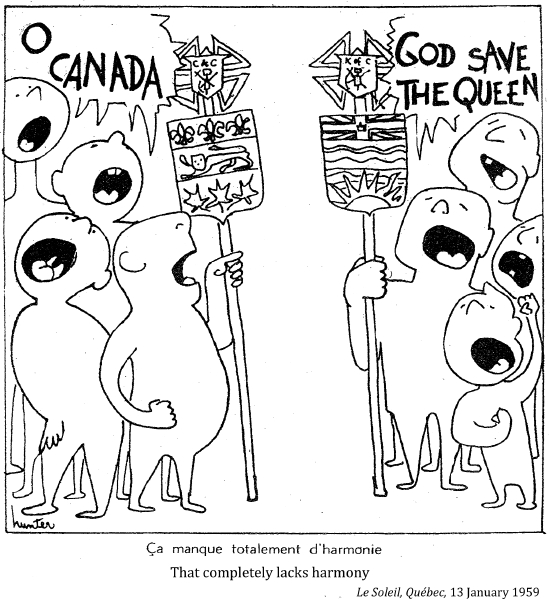
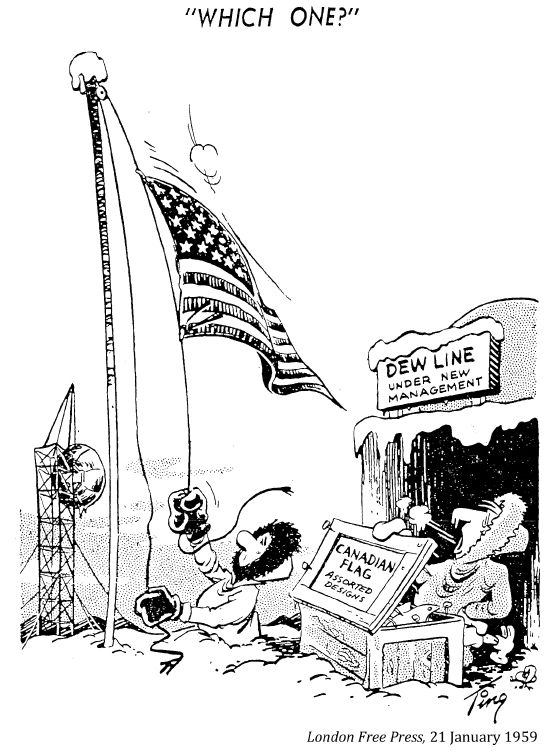
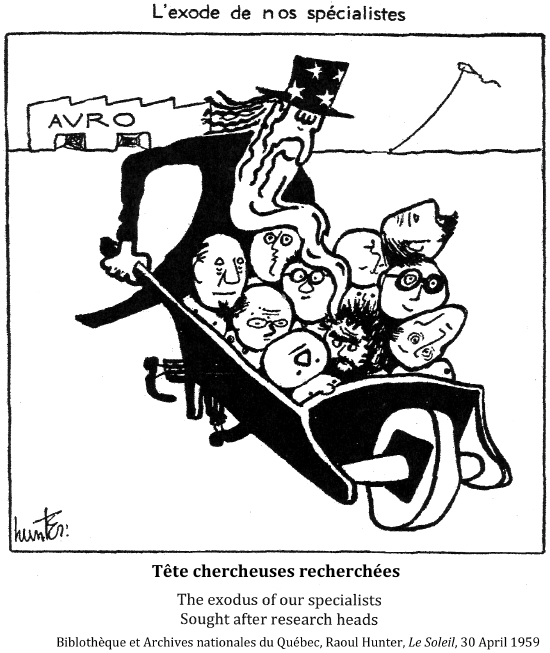
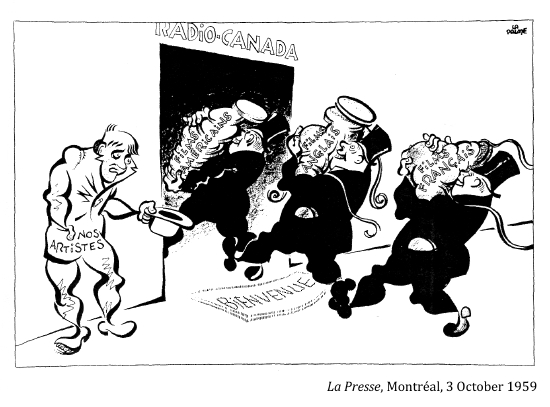
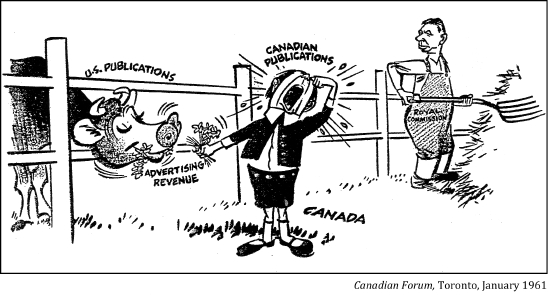
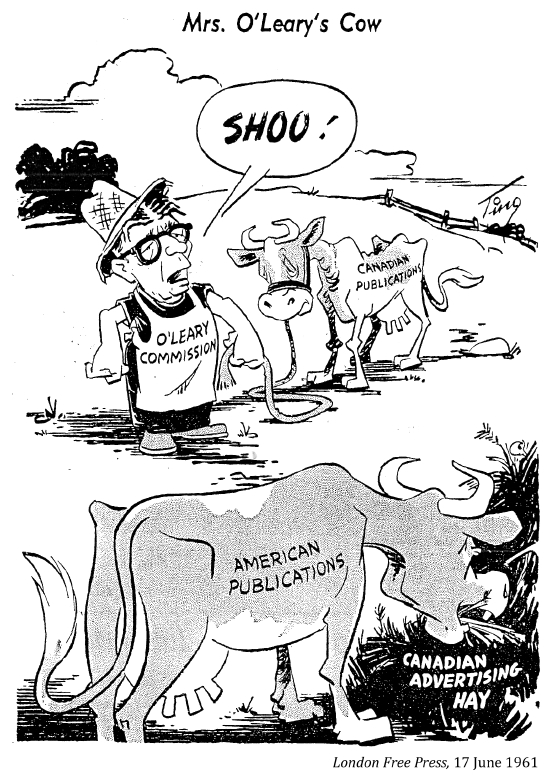
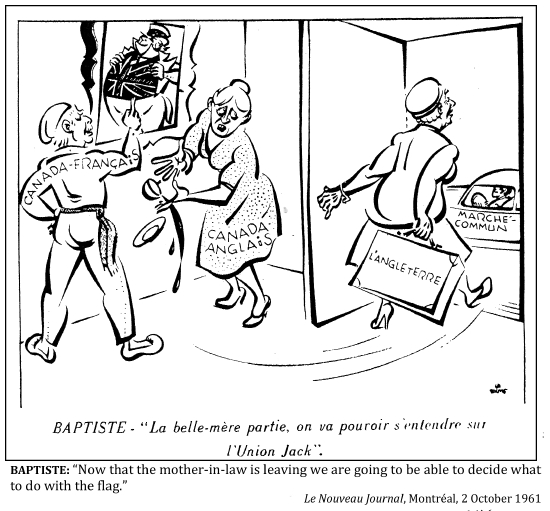
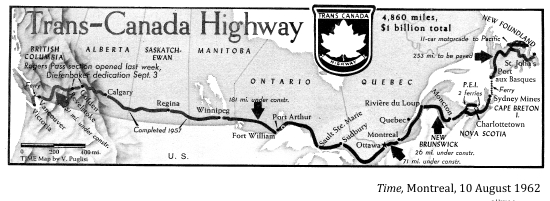
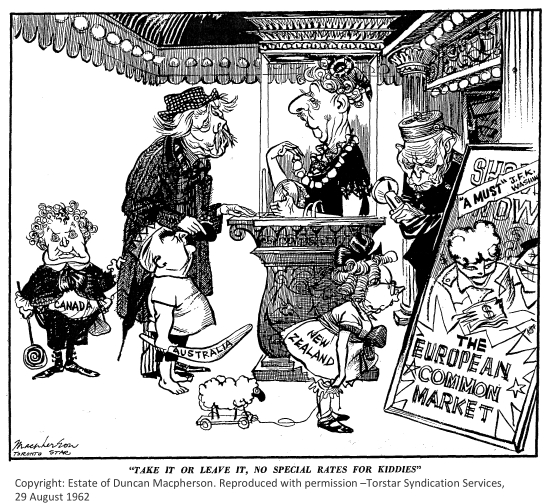
"We were [during the Cuban missile Crisis] not a satellite state at the beck and call of an imperial master."
John Diefenbaker, memoirs
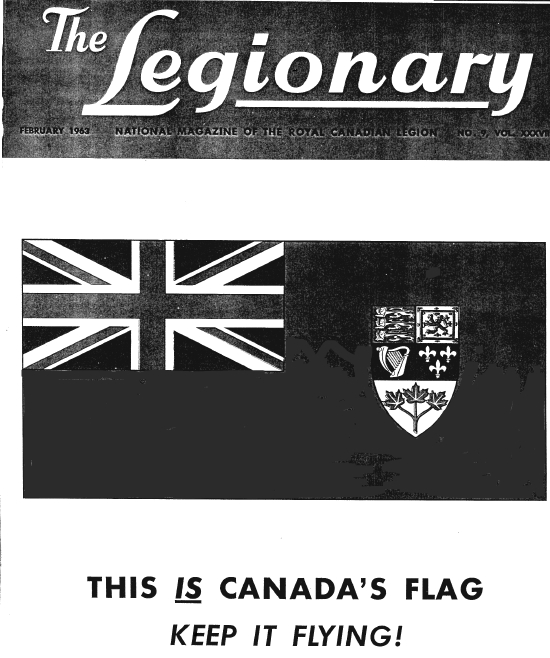
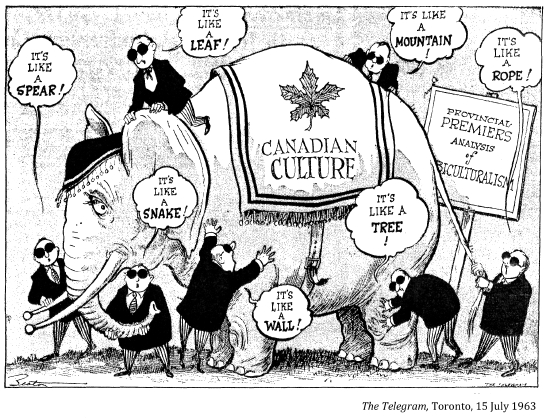
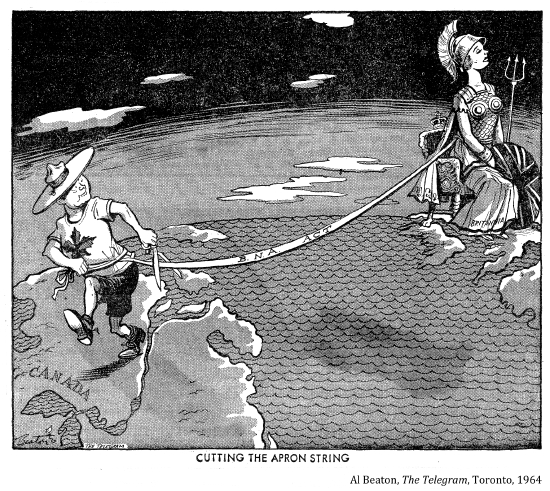
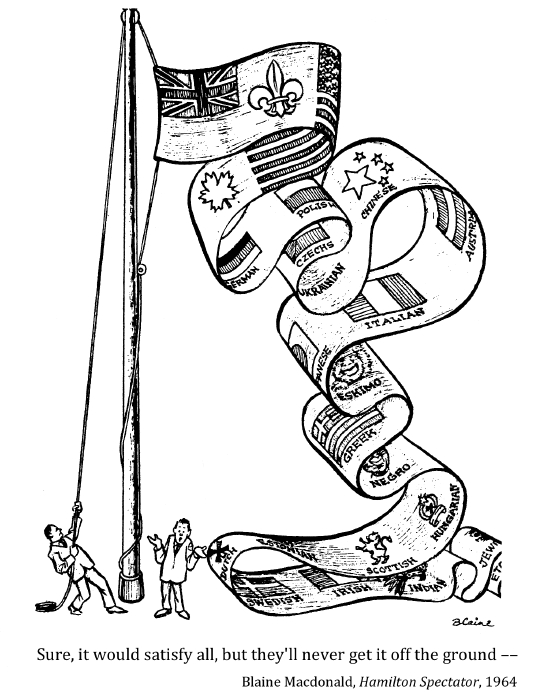
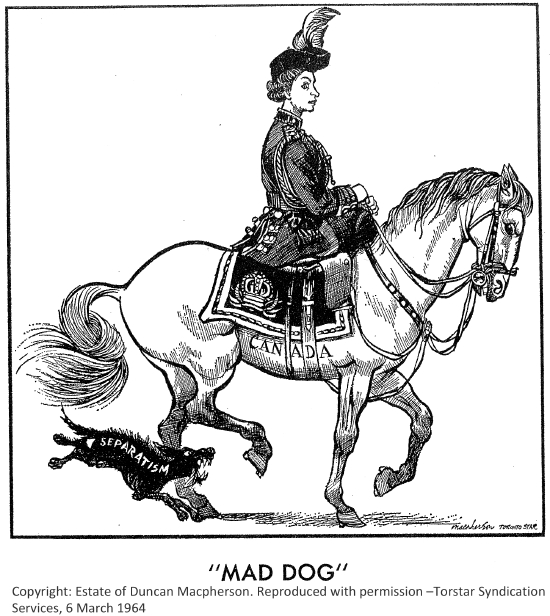
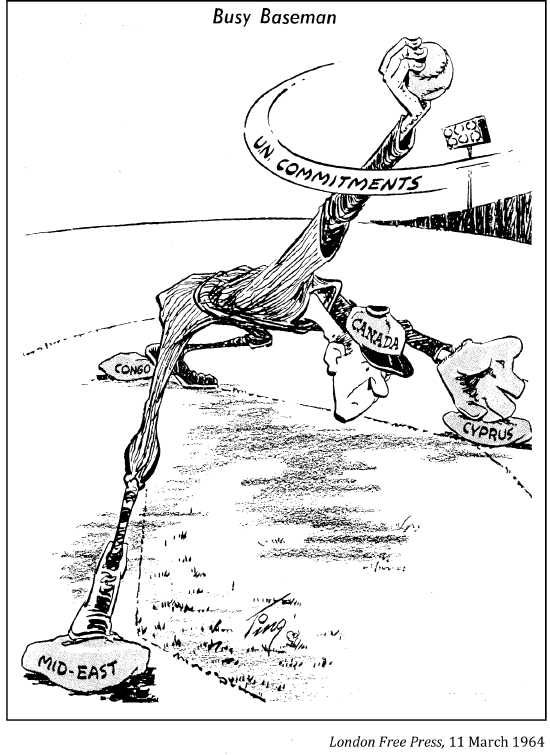
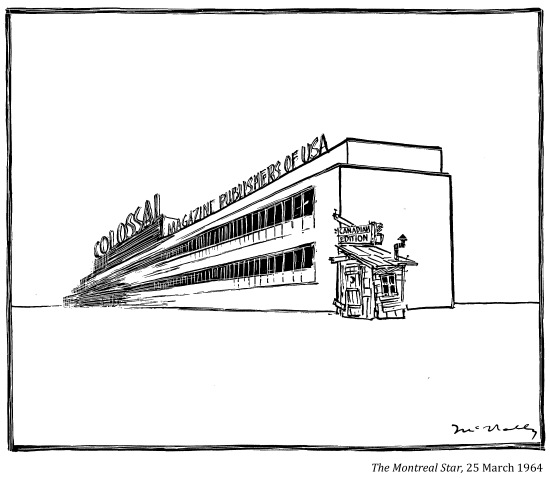
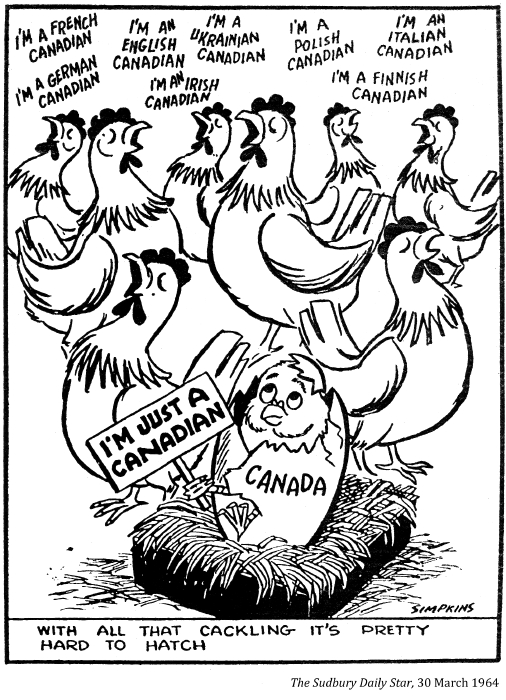
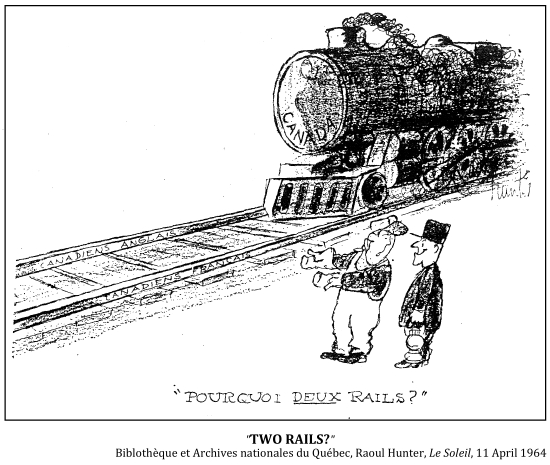
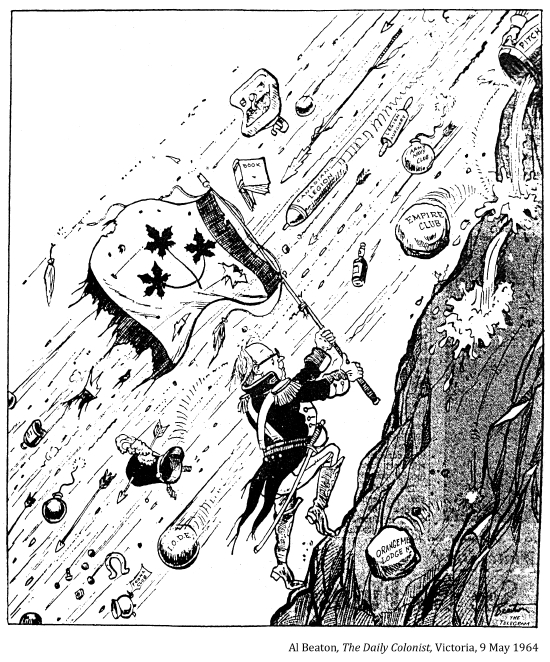
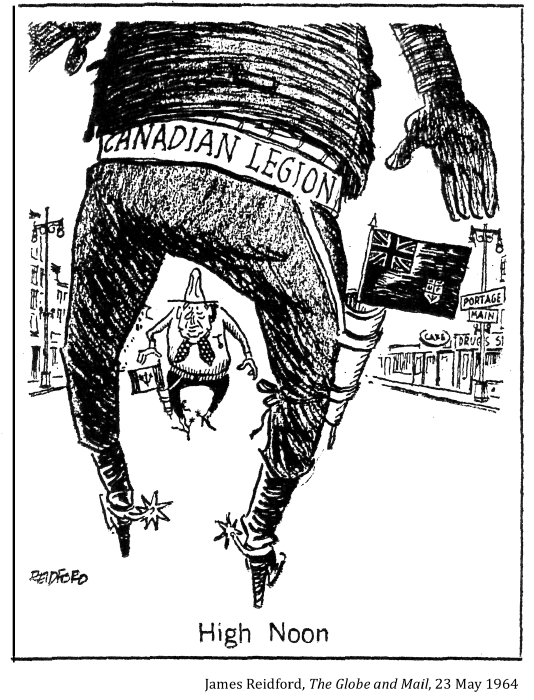
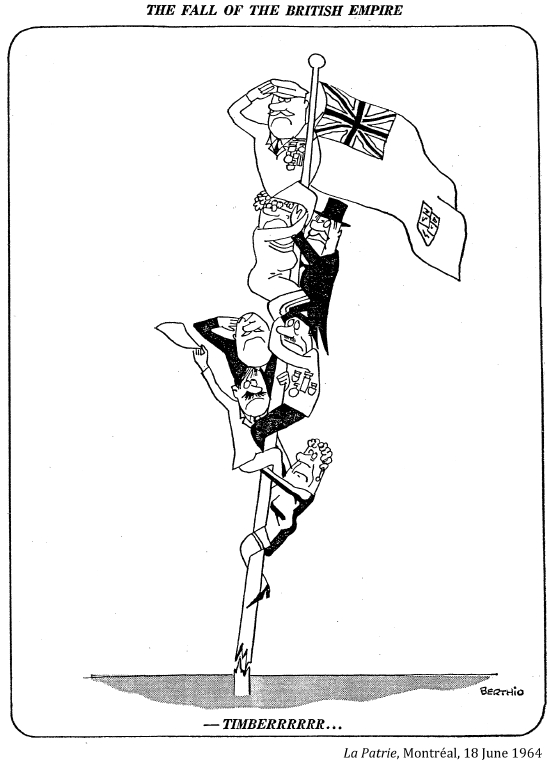
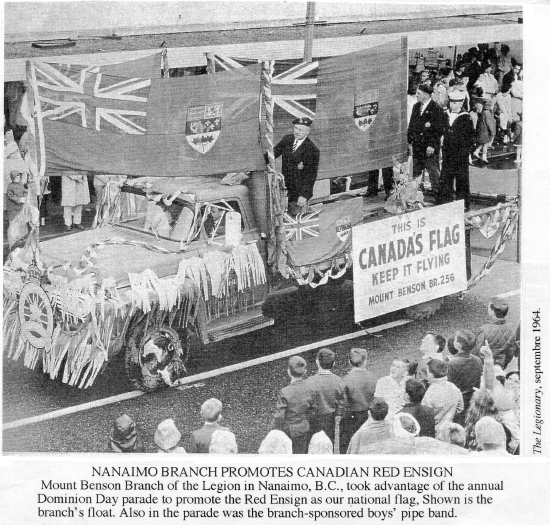
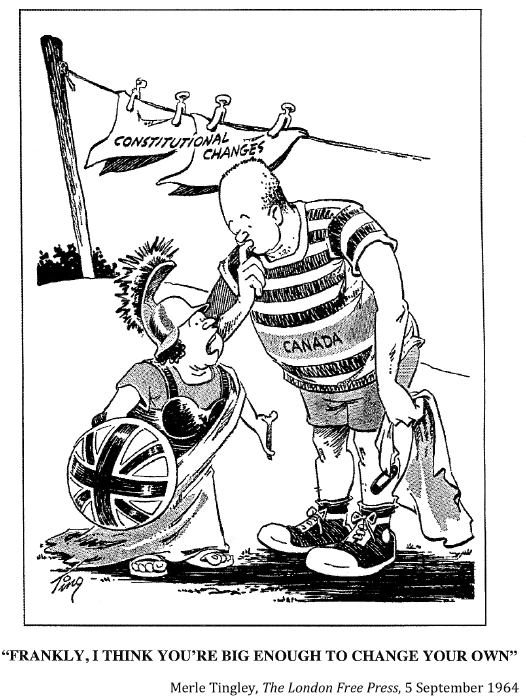
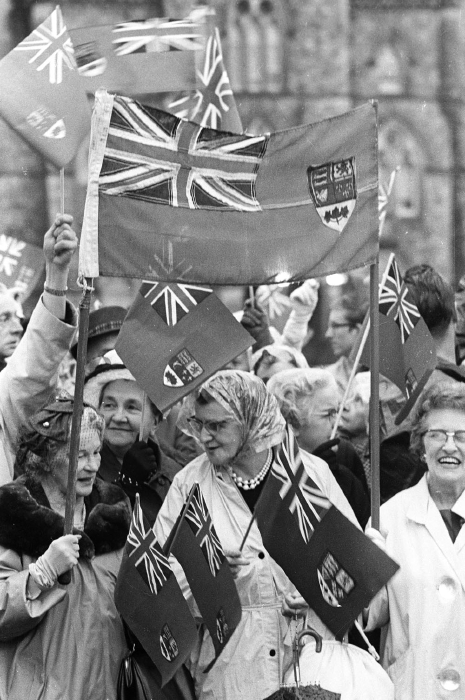
Student flag demonstration on Parliament Hill. LAC MIKAN no. 4687819, Duncan Cameron, 1965
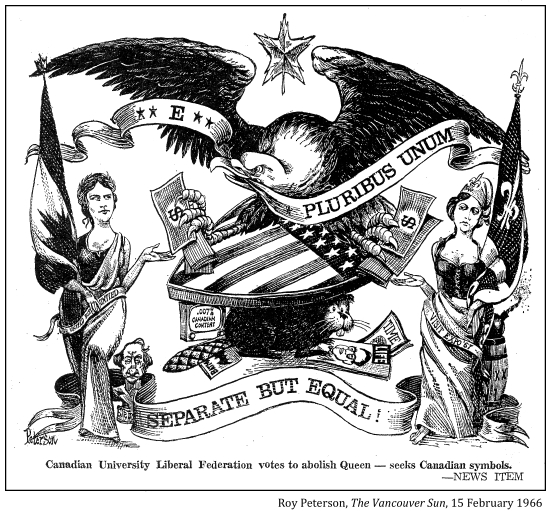
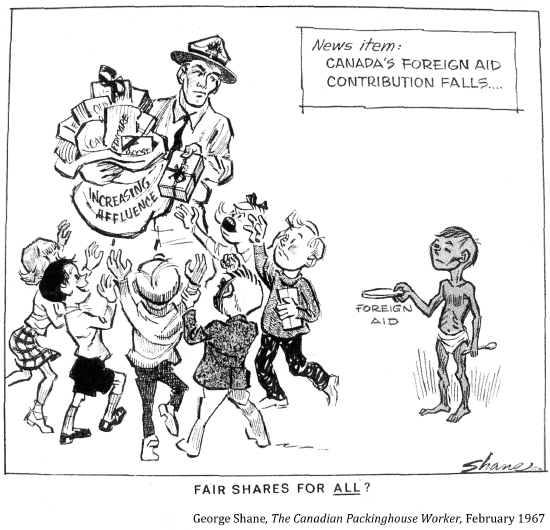
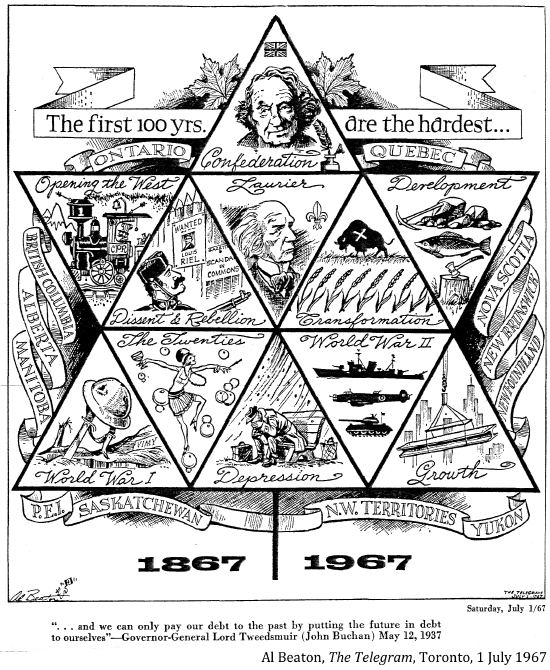
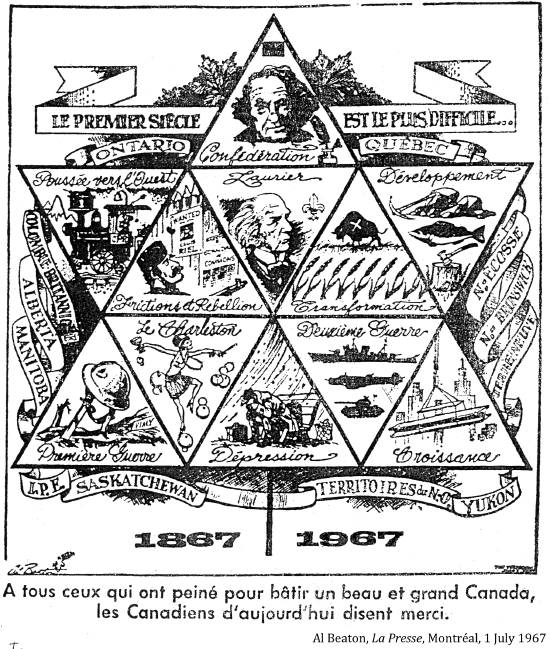
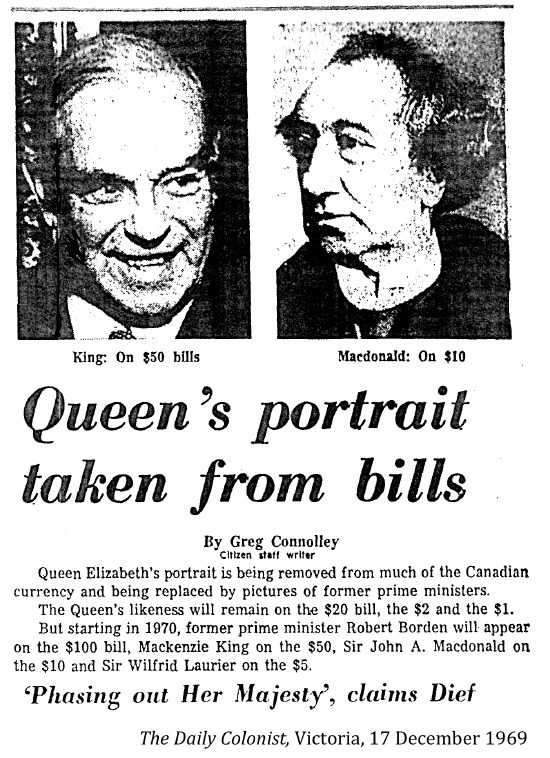

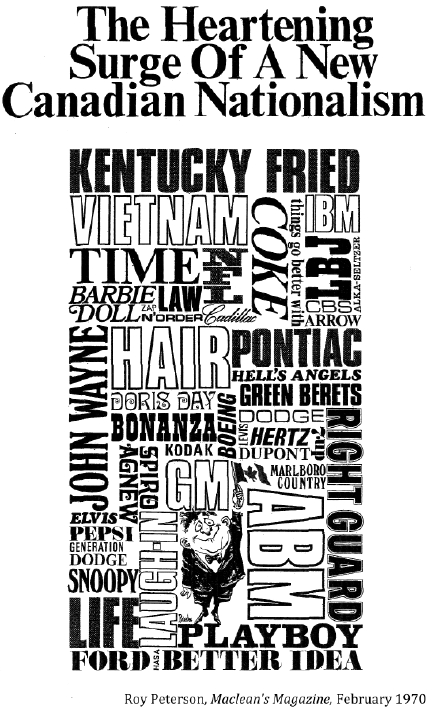
"Canada is a colony . . . a place from which a profit is made, but not by the people who live there: the major profit from a colony is made in the centre of the empire. That's what colonies are for, to make money for the 'mother country.'"
Margaret Atwood, Survival, 1972
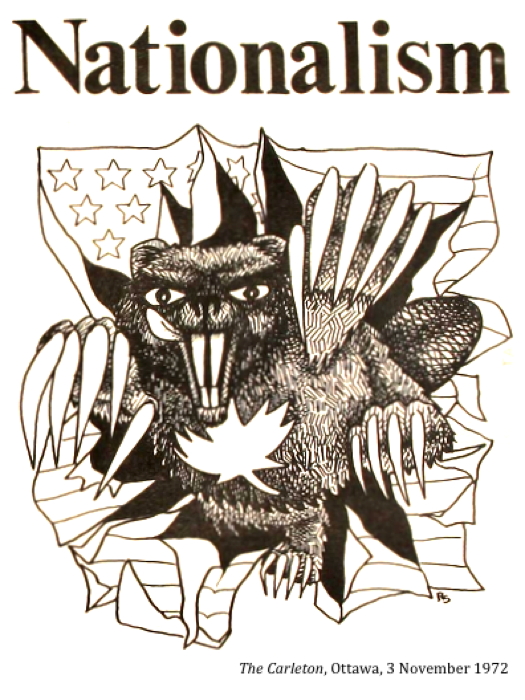
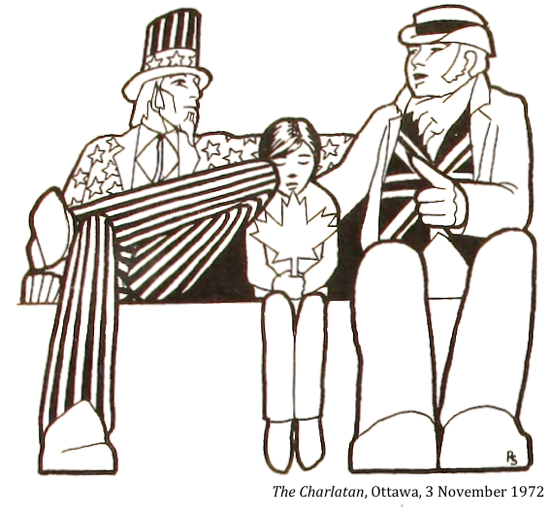
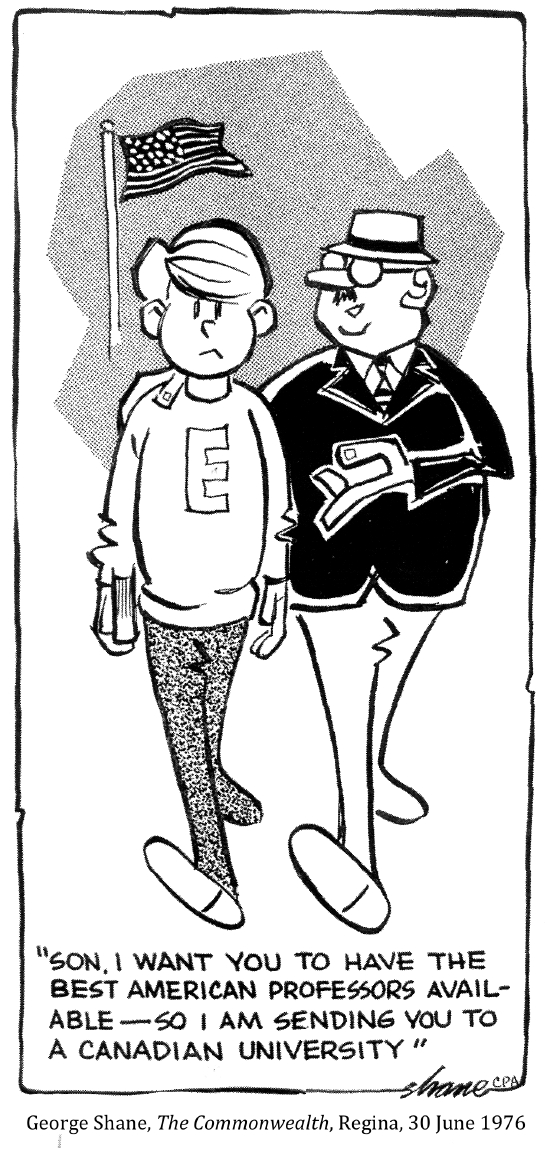
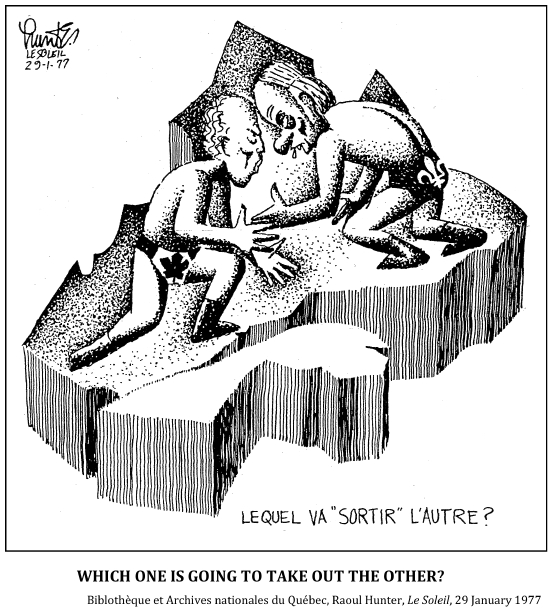
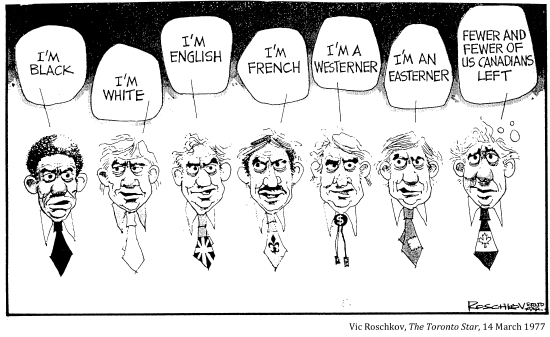
"We shall never build a nation which our potential resources make possible by dividing ourselves into Anglophones, Francophones, multicultural or whatever kind of phoneys you choose: I say Canadians first, last and always."
John Diefenbaker
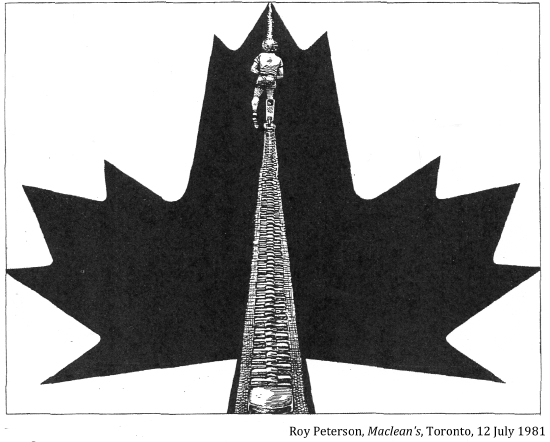
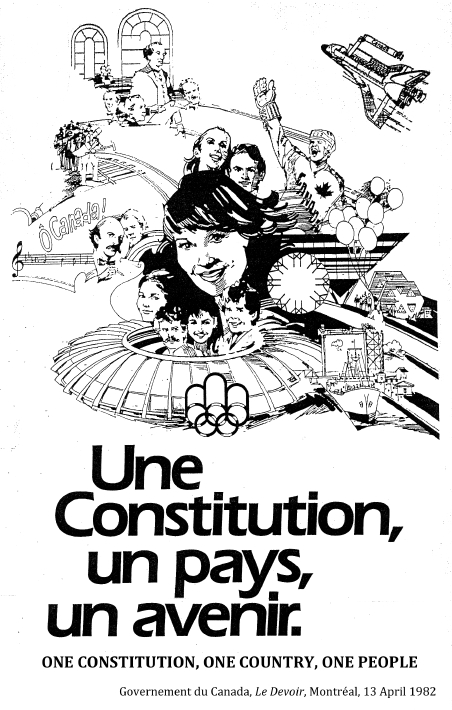
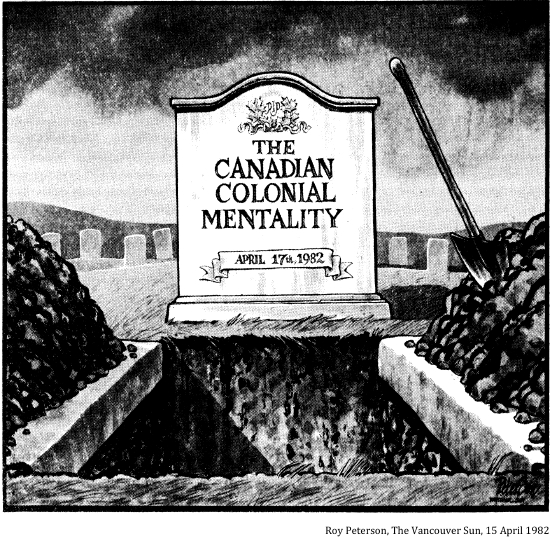
"Today, at long last, Canada is acquiring full and complete national sovereignty. The Constitution of Canada has come home."
Pierre Elliot Trudeau, 17 April 1982
"No guns, no revolutions. Can any other nation in all the Americas make that statement? We did not separate violently from Europe but cut our ties cautiously, so imperceptibly that none of us is quite sure when we actually achieved our independence."
Pierre Berton, Why We Act Like Canadians, 1982
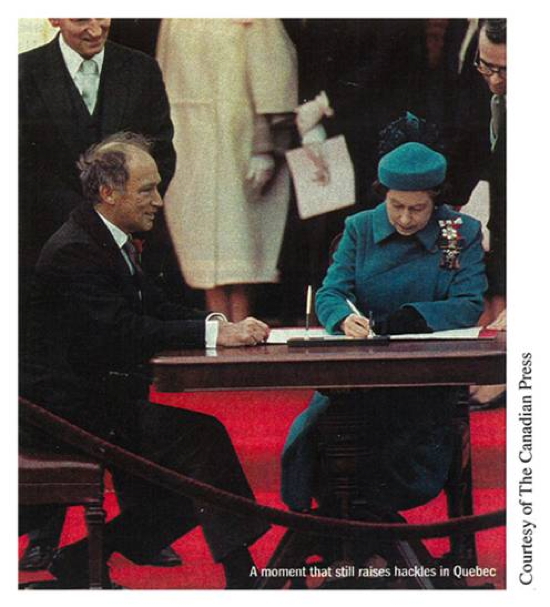
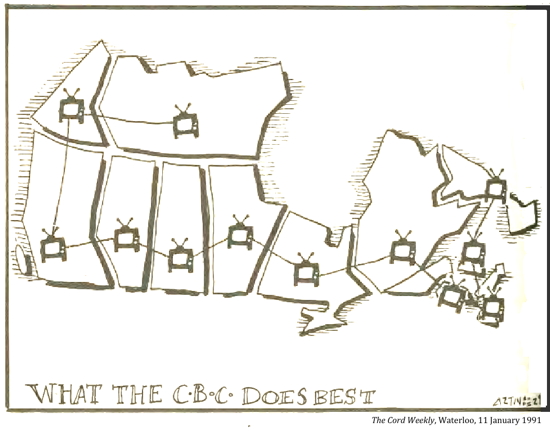
|





































































































































































































































